

How To Learn A Language For Travel: Full Guide
- Post author: Nicoletta
- Reading time: 30 mins read
- Post last modified: January 3, 2023
- Post comments: 19 Comments
How To Learn A Language For Travel: 7 Steps to Learning A Language Completely Alone
This article about how to learn a language for travel may contain affiliate/compensated links. For full information, please see my disclaimer here.
Are you one of those travelers thinking about finally learning a new language for travel purposes, but you keep putting it aside? I am with you. But let’s talk. Honestly, even when you just think that you would like to learn a language for travel. You have already made the first step. You are further than those who aren’t even trying. Now you just have to cross this line and actually get round into the language learning process.
If you don’t know where to start, I would like to help you with it. This article will show you efficient ways to pick up a new language for travel in 7 simple steps .
How To Learn A New Language For Travel: 7 Steps
Here is a list of 7 simple steps to learn a new language for travel:
- Find motivation inside you
- Choose a topic (situation) to learn new vocabulary
- Set up achievable language learning goals
- Write down topic specific vocabulary
- Learn new vocabulary using effective strategies
- Keep improving your language skills (listen to podcasts, learn with language apps, read books & magazines)
- Practice speaking
Different Approach To Language Learning
I am going to reveal how you can approach language learning differently. You will find out that setting up specific and smaller goals, focusing on one or two topics within the language, and sticking to your plan is crucial. It’ll help you pick up a new language before traveling . It is a method I have come up with during my language learning journey . I have been following these steps and now speak 3 languages fluently . This method works if you are willing to dedicate some time to it and mean it seriously with your language learning process.
With my language learning method, you’ll be able to pick up a new language for travel. I’ve been following these steps and now speak 3 languages fluently.
So, let’s get into it and break each step down into detail. Below, I am giving you 7 steps and tips for reaching your goal to speak a local language when you are traveling.
THINGS YOU WILL NEED FOR THIS PROCESS
1.Motivation
2.Language you want to learn spoken in the country you’ll be visiting
3. Language Travel Notebook (for new vocabulary)
4.Small budget to practice speaking online – OPTIONAL
5.Positive mindset
The 7 Steps To Learn A Language For Travel
1. find motivation inside you.
Once you are planning your journey in a country, traveling is a motivation itself for you. Travel itself will push you and help you to find the motivation for learning the language. Because let’s be honest. Traveling gets much easier, enjoyable, and exciting if you speak at least a few words of the language.
You have to define the reasons why you want to learn the language. Once you have them, write them down into your language travel notebook . It will help you keep up with your language learning in challenging times when you feel down or unmotivated. Being aware of your motivation and reason to learn the language is very important.

2. Choose A Topic/Situation
Now you have a reason, motivation why you want to learn the language. In our case, we want to learn a language for travel. So, at the beginning of our language learning journey, let’s think about specific topics and situations when we want to use the language once we travel. It can be anything – ordering food in a restaurant, vocabulary for accommodation, traveling at the airport, etc.
Write these topics down into your language travel notebook . I go into detail about how to choose a specific topic and learn topic specific vocabulary in a separate article, so check it out.
3. Set Up Achievable Language Learning Goals
Setting up language learning goals is another crucial part of language learning. It will help you to stick to the learning process and keep you on track. When it comes to goal setting, your goals have to be specific and small.
Set Up Specific Goals
Remember that your goals need to be specific. Don’t just say I will learn how to communicate in a hotel and in a restaurant. Be more specific.
Say – ”Once traveling, I’ll greet the receptionist at the hotel in the foreign language, listen to him and ask relevant questions about the hotel, when the breakfast is, how to get there and there, etc. I’ll order food in that language in a restaurant and have a small conversation with a waiter. Also, I’ll be able to ask for the bill and pay in the end, all speaking in that language.”
I think you get the point. Set up specific goals you want to achieve before traveling to the country. But think smaller so that you can stick to that plan. Making big plans can mean not learning much eventually. Another article will guide you through the process of how to set up specific language learning goals . Also, I’ll give you some hints to determine whether your goals are effective, so check it out.
Set Up Smaller Goals
Let’s say you are leaving to explore the country in a month… Don’t be too strict with yourself. Nobody is a hero, and let’s be honest, learning a language takes some time. So set smaller goals like, for example:
‘ In a month, you’ll learn how to communicate at your accommodation and in a restaurant .’
That’s already a lot and is totally manageable. If you are too strict with yourself and want to learn a lot before traveling to the country… well, unless you have plenty of time, it will be more difficult for you to follow the plan. In the end, you might end up being disappointed that you didn’t make it. So instead, pick up one or two topics and learn words within that area.

Advantage Of Smaller & Specific Goals
Another advantage is – you learn a little bit within one topic. You achieve it and will be able to communicate in that situation while traveling. Then you’ll have another excuse to go to that country again. You can make a promise to yourself that next time, you’ll learn vocabulary within another topic (e.g., sports or leisure travel). Also, once you master speaking within the topic, you’ll gain more motivation.
Get My Language Learning Calendar
I’ve created a language learning calendar for you to keep track of your learning and motivation . This calendar is designed for one week. Into each day, you can write down the topic & vocabulary you want to learn , how much time you’ll spend , and the method you’ll use to do so.
Either plan and write down what you’ll learn before each week starts, or you can write down what you have learned each day to keep track of your learning process. I like to write down things I learned on that day once I’ve done so. But I make sure I spend some time with the language every single day . So choose what works better for you.
Get your Language Learning Calendar

4.Write Down Topic Specific Vocabulary
Once you have set up your goals, let’s start achieving them. First of all, I recommend you start learning vocabulary step by step. First, think about words in your own language you need to speak in the particular topic (situation). Then, write these words down into your language travel notebook. When you have them, translate them into the foreign language you want to learn.
Write all these translated words into your notebook. I have also explained the entire process of selecting a specific topic and topic specific vocabulary in a separate article, so check it out.
My approach to learning a language is to pick up as many words within one topic. Then, simply try memorizing these words and use them in a particular context. Use your imagination.

Incorporate Language App
In the meantime, I also recommend you choose a language app and learn the very basics of the language. As the next step, you’ll be creating sentences using your topic-specific vocabulary. However, it might be difficult for you as an absolute beginner in the language. This is when language apps come to play.
I always recommend LanguagePod101 to my readers and audience. I love LanguagePod101 because they teach you basic vocabulary in dialogues and everyday life conversations. You’ll automatically learn new words in a context.
This language app will also help you learn everything you need to learn in a new language in terms of basic vocabulary (greetings, introducing yourself, numbers, time, colors, etc.). You’ll also understand simple grammar with is (verbs, conjugations, nouns, adjectives, etc.)
Listen to one dialogue each day. Then, the next day, focus on the same dialogue and see if you remember the new words. If you feel comfortable, jump to the next dialogue. During the process, you can also learn your topic specific vocabulary.
Read my separate article if you’d like to get an overview of what to learn in a new language as an absolute beginner.
Create Sentences Using New Words
After a month or two of learning basics with LanguagePod101 and learning your topic specific vocabulary, you can start creating sentences. For example, imagine sitting in that restaurant, and you want to order, let’s say, paella. Say the words (or the entire sentence) in your own language, and then translate them into your target language. This way, you’ll incorporate the words into speech and practice in a ‘real situation.’
I recommend you also write the sentences down in your language travel notebook , read them aloud, and repeat the same process again and again.
Your Language Travel Notebook
The language travel notebook will become your best friend. It’ll guide you through all 7 steps of learning a language for travel. It’s your own book, where you’ll have all vocabulary within the specific topic you want to learn.
Take it with you once you travel to add new words as you go. I have my own language notebook. It serves me to keep track of new vocabulary and sentences and follow these 7 steps every time I learn a new language. Also, I carry it with me once traveling to the country where my chosen language is spoken. When I learn a new word, I write it down to remember it.
Download the language travel notebook and hop on your language learning journey now. For the guidelines on how to use it, check out explanations about the language travel notebook .
Get your FREE LANGUAGE TRAVEL NOTEBOOK

5. Learn Vocabulary Using Effective Strategies
Perfect, you’ve selected situations when you want to communicate in that language and the specific topic. Now it is time to learn that vocabulary on your own. This is a step that scares many people. They think it isn’t so effective, just memorizing words.
I have to tell you that when you are at the beginning of your language learning process, it is great to start with learning vocabulary on your own. You need some base to create sentences, little conversations and start understanding the language. But how are you going to do that if you don’t have any vocabulary in your pocket? So that’s why I, first of all, encourage you to learn the vocabulary.
We’ll learn the words using effective and fun ways, try to be in constant contact with them, and learn to use them properly later.
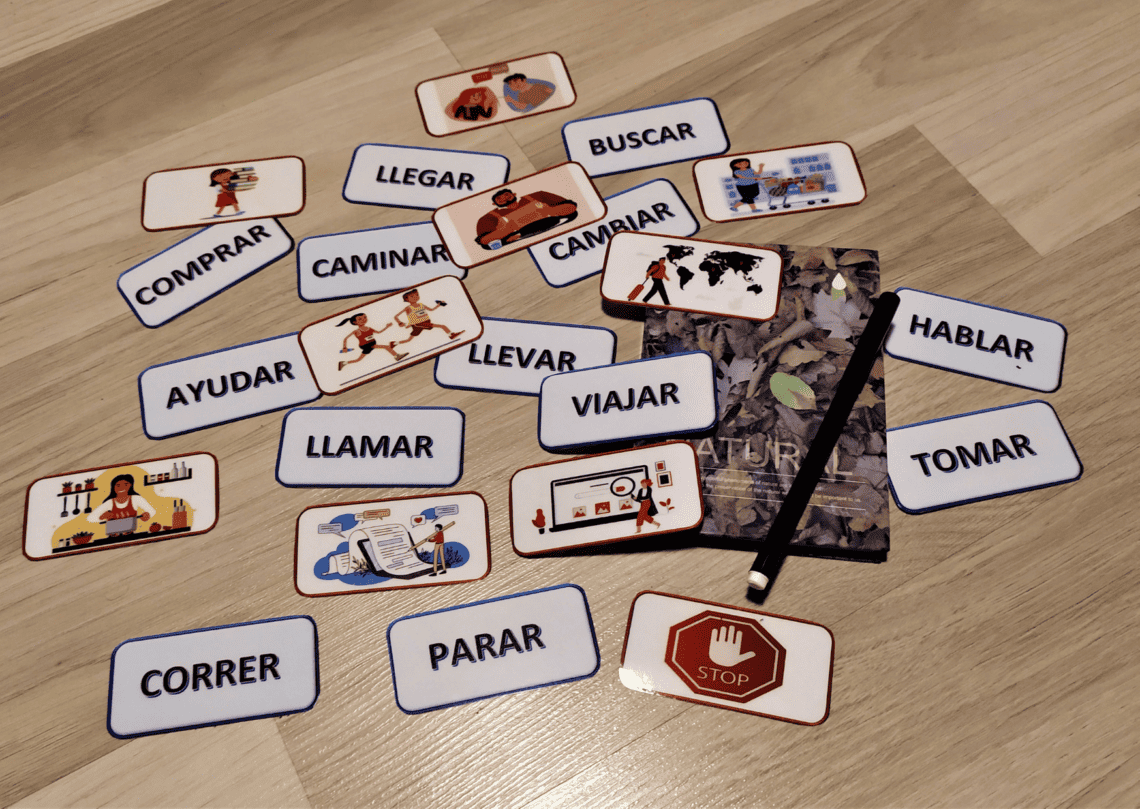
Use Effective Strategies To Learn Vocabulary
Only memorizing words means that many people cannot really use them in a conversation after. They just learn everything by heart, and then they are stuck when somebody asks them something, and they have to reply. This isn’t going to be our case.
Once you have your vocabulary in your language travel notebook, I encourage you to use my strategies and tips on how to learn vocabulary fast . It’ll be a fun and interesting process. You only have to choose a strategy that works for you and tips that are interesting to you.
Another thing you can do is to choose one or two gifts for language learners from the list I’ve put together. It includes many interesting activities and fun games that will help you to learn vocabulary effectively.
6. Keep Improving Your Language Skills
When you feel like you’ve mastered new vocabulary within the topic you chose, it’s time to work with that vocabulary . So let’s get your language learning to the next level.
It’s time to familiarize yourself with the language even more and learn how to use the vocabulary in real life. You’ll be reading books and language magazines , listening to best language learning podcasts , doing your favorite activities using the language, and many other things.
So as the next step, follow my 7 useful tips on how to improve your language skills .

7. Practice Speaking
So you have now learned the necessary vocabulary for the topic that you chose. That’s perfect. You are halfway through. Congratulations . You can also produce your own sentences in the foreign language within the topics (situations). You are also able to understand the language, thanks to the resources you’ve been using.
You’ve done a lot of work independently. Until now, you’ve been learning the language mainly passively. It’s time to jump to the next level of our language learning process. Let’s add up active learning.
You need to start speaking to reach fluency and confidence in that language. It’s time to start using the language actively. I highly recommend taking a few lessons with a native speaker online (it doesn’t have to be necessarily a native one).
Not only will the native speaker motivate you to speak to somebody in reality, but it will also give you much more confidence. If you just talk to yourself and memorize vocabulary, it will help you, but it won’t give you the confidence to actually speak once you are traveling.

Real Boost In Your Language Learning
When you start talking to someone using what you have learned on your own, you’ll experience a real boost in your learning process. The tutor will also guide you, tell you how to pronounce the word, and correct you.
Sometimes, you might learn words that native speakers wouldn’t use, or they would just express them differently. Your tutor will assure you that your sentences are right and you speak as a native does.
Find out what are the 4 best platforms to practice language with native speakers .
I recommend you start practicing speaking on iTalki. It helped me to master my Spanish speaking. iTalki is a great platform to choose your tutor and learn how to speak. Tutors are very nice and always guide you in the language.
You can now get 10$ credit after your 1. lesson on iTalki. Click below to start practicing speaking on iTalki and get your 10$ credit.
Register & Get 10$ Credit on iTalki

These are my basic 7 steps for you to finally learn a language for travel . I am here to help you during the process. Check out other articles in my language blog , where I explain each part step by step. In addition, it contains many tips, tricks, and strategies on how to learn the vocabulary, use it in a context, and use platforms and resources to practice the language.
Let me finish with my 2 greatest pieces of advice for you.
How To Overcome Your Fear Of Speaking
This is my biggest advice to you. So many people are afraid of speaking in a foreign language because they are afraid of making mistakes . Man, everybody makes mistakes. Nobody cares. Forget about it. Making mistakes is actually great because we learn from them.
Believe me, it’s the other way. Once you travel in the country and speak a few words to locals, they aren’t paying attention to your mistakes. Instead, they are amazed that you speak their language. They really appreciate it. And most of the time, you’ll feel that appreciation.
I have experienced that plenty of time. For example, before going to a bakery, I stood in front of it for 3 minutes practicing the sentence I would tell the shop assistant…. I was nervous that they wouldn’t understand me. Or I would forget some words and stand there, and others would be angry at me because I would delay them.
No, no, no. Nothing like that will happen to you. And even if, whatever. You have tried. Believe me, the people will understand, and they’ll be surprised that you speak at least a little bit.
Overcome your fear of speaking foreign language following my tips. Get some inspiration as this is the significant thing to start speaking.
Think Positively & Enjoy Language Learning
Lastly, I have a few words of encouragement for you. My last piece of advice to you is to think positively. Yes, this is an essential part of it . Even if you have fear inside you, you have to overcome it.
Tell yourself that you’ll make it and order something in a foreign language like a pro. You won’t make mistakes. If you go into the conversation with this mindset , believe me, it’ll work out.
You’ll speak a foreign language without problems. It really works. You’ll soon see the benefits. Don’t forget to enjoy the whole language learning process. If it makes fun, you’ll learn more easily and effectively.

Recap For Learning A Language For Travel
So here is a small recap for how to learn a language for travel in 7 basic steps:
- Motivate yourself – travel and experience in the country where people speak the language are your motivation.
- Pick up a topic (food, accommodation, transportation, communication at the airport, etc.) to learn new vocabulary & set up specific and smaller goals .
- Take your language travel notebook and start writing topic specific vocabulary down that you have to learn (any words you can think of within your topic). After, create sentences using these words and try to memorize them.
- Start learning the vocabulary on your own .
- Keep improving your language skills and learn how to use the vocabulary in a context .
- Practice speaking with tutors online
- Never be afraid of speaking once you travel to that country. Practice with locals what you have learned before traveling.
More Tips On Language Learning
This is my method for how to learn a language for travel. Remember, you don’t have to become a professional. You are just learning something from the language because you want to understand, communicate with locals, and enjoy traveling more. In the end, it will help you get closer to the culture and the community. You’ll feel empowered, and traveling will get much more exciting and fun.
If you find it difficult to stick to the learning and don’t know how to achieve your goals, read my article about how to achieve goals when learning languages .
Go to my language blog for more inspiration about language learning. Also, check out the easiest European languages to learn and why you shouldn’t learn multiple languages at once .
If you want to learn Italian, check out the best Italian language app for travel and follow my strategy.
I hope these tips will help you pick up a few words and speak the language you want to enjoy your travel adventure. Let me know in the comments below if you have your own strategy to learn a language for traveling or any questions.
Happy language learning for your better travel experience.
How To Learn A Language Traveling?
If you wonder where languages will be useful for you, I also design travel itineraries, which you can take and travel to many countries on your own. These itineraries are mostly road trips, on which you’ll get the chance to practice the languages. Check out my travel itineraries , learn, and practice your language skills while traveling.
Also, learn what is the best language to learn to travel Europe. Choose your perfect language based on the European destination you want to visit.
Check out my article about the benefits of learning foreign language for travel . I’ll give you more inspiration and encouragement to get started.
You Might Also Like
Best language app for travel: based on real conversations.

Best Italian Language App For Travel

8 Ideas For Topics To Learn When Learning A Language
This post has 19 comments.
I love your tip on smaller goals! I often struggle to learn languages cause I feel like I need to learn it all ASAP. Having little goals like speaking to the receptionist is so smart!
Thanks Nina, am I glad :). I used to have the same problem, and had the feeling that I had to learn a language so fast… but it never works :D. We have to be clear in what we want to achieve in the language, then it’s much easier.
Thanks for these tips! I do try to learn a few phrases from the local language of the destination where I’m going.
That’s amazing, Ivan. I am so happy that you learn languages for travel. May I ask which languages have you learned? And which of them do you plan to learn in the future? 🙂
okayyy these are really helpful tips! i haven’t practice my spanish in a very long time and this blog made me wan to get back into it – i even downloaded your language travel notebook, so i’ve very excited 🙂 🙂
This is awesome Claire, I am so happy the article has been useful for you. Keep me updated about your progress, and feel free to write me if you have any more questions or feel stuck. I have some great resources you can use to learn Spanish; check them out in my Spanish Language section. Happy learning!
I have great aspirations to learn a new langue or two. But I can’t seem to stick with the lessons and practice. Good to focus on specific topics to start. That would also motivate you to learn more. And great to write down your own personalized vocabulary.
That’s amazing, Linda. I am so happy you want to learn languages. And also completely understand the problem. That’s where the specific topics and goals will really help you and keep you focused. Let me know which language you want to learn next and if you have any questions :).
I love your sensible step-by-step tips to learn a language. I have always been afraid to speak a new language because of making mistakes. As soon as I find the time, I am going to try this out before our next trip.
Awesome, Lorry; I am happy my article inspired you to try speaking a new language again. I see your point, but there is nothing to be afraid of. Really. Locals appreciate it so much if you talk to them in their native language. Nobody cares about the mistakes you make. You will see, just try it. It is only in your head ;). If you want, I have an article about overcoming the fear of speaking in a foreign language that will help you forget this fear. Check it out: https://voicesoftravel.com/speaking-in-a-foreign-language/
This is such an informative post. Many of them struggle to learn languages because every one wants to learn faster.
Thank you, Planet Hopper :). You are completely right.
Awesome tips. This is something I definitely struggle with. I am so jealous of people who just seem to pick up languages so easily, but as you said, I can probably improve by changing my mindset and finding more motivation
I totally understand you, Jacqueline. But believe me, it is really only about the mindset you have and the consistency. If you stick to the language learning, do it regularly, each day for 30min (or even less), it is going to work. You can do it ;).
I am in awe of your article, great and very valuable tips. I am going to use them because I would like to learn Spanish. I know only basis. I think my goals weren’t specific enough so far.
I am glad the article has been helpful for you, Agnes. Let me know once you start learning Spanish and if I can support you in any way. I also have additional resources for you to learn Spanish, so check them out here in the Spanish section .
This is a really helpful guide. I think practicing it with locals makes it all the more worthwhile.
That’s right, when you know you will practice with locals, it motivates you the most :).
Pingback: How will foreign languages improve your travel experience?
Leave a Reply Cancel reply
You must be logged in to post a comment.
You are using an outdated browser. Please upgrade your browser or activate Google Chrome Frame to improve your experience.
The 16 Most Helpful Languages for Travelers to Learn
Travel and language were made for each other.
If you need reasons to learn a foreign language , travel is definitely a good one.
In fact, travelers have more reason than just about anyone else to learn a new language!
If you dream of going to far-off lands and speaking with the locals like it’s nothing, then this post is for you.
Keep reading for the best languages to learn for travel, why you should learn one and how to do it.
3. Mandarin Chinese
8. portuguese, 9. cantonese, 11. indo-malay, 12. hindustani, 13. bengali, 15. swahili, other world languages to learn for travel, why travelers should study languages, how to learn a language for travel.
Download: This blog post is available as a convenient and portable PDF that you can take anywhere. Click here to get a copy. (Download)
Most useful in: Every continent, but North America and Europe in particular
As you’re probably well aware, English is the modern world’s lingua franca .
Throughout the last century, English has grown in international importance. Though it stemmed from Britain’s colonial conquests, it also owes much of its global prominence to American imperialism.
English is less varied throughout North America , and most speakers should understand just about everything they hear from the most remote parts of Canada to either coast of the U.S., though English could also be called “the European traveler’s best friend.”
Thanks to high levels of education and a decidedly global outlook, English is particularly handy in Europe. You shouldn’t expect to get into deep philosophical debates in Italian coffee shops or Russian bars, but you can count on finding enough English speakers to at least give you basic assistance and a little company in nearly every large city throughout the continent.
In fact, throughout most parts of the world frequented by tourists , people understand at least a few basic English travel phrases .
Most useful in: South and Central America, Europe
Spanish is another handy world language for travelers in Europe. Outside Spain, its commonalities with Portuguese and Italian will help you get through its southern European neighbors as well.
Where Spanish really shines, however, is in Latin America —it’s the unifying force from the Rio Grande to Patagonia and beyond. Additionally, most Spanish-speaking travelers will find Texas, Arizona, New Mexico, California and South Florida all relatively easy to navigate in Spanish; most large North American cities have sizable Hispanic populations, as well.
Don’t get discouraged if you learn the language and can’t understand it in some regions. Parts of the Caribbean and the Southern Cone of South America are notoriously difficult for non-natives and even some native Spanish speakers to understand.
One should also be forewarned that remote areas of the Americas, especially in southern Mexico and Andean countries, may lack Spanish speakers entirely and instead have large populations who speak an indigenous language as their first (and possibly only) language.
Some pre-trip classes or just a few important Spanish phrases will be majorly helpful in these parts of the world.
Most useful in: East Asia
As not only the language with the most speakers in the world but also the official state language of the largest country in Asia, Mandarin Chinese is an obvious big name on this list.
Many visitors to China arrange to take organized tours, often led by Mandarin-speaking officials. While English tours are certainly available, speaking a bit of Chinese will almost certainly ingratiate you to your guide and any locals you get a chance to meet.
For the even more adventurous, a sturdy level of Mandarin will help you navigate the enormous country of China more independently, although you’ll find there are a vast amount of dialects with varying degrees of mutual intelligibility.
Mandarin is also the official language of Taiwan , a radical travel alternative to Mainland China. Although the island nation doesn’t technically exist according to most of the world, knowing some Chinese will help you better enjoy its tropical weather, high level of development and relatively cheap cost of travel and living.
Most useful in: Europe, the Middle East, the Americas, North Africa
French isn’t only a good choice for France, but it’s also still popularly learned by educated people throughout Europe .
Further, large parts of North Africa and the Middle East were parts of the French Empire before World War II, and the French language remains prominent and even official in many of the former colonies . The vast majority of middle-class people in Morocco, Algeria, Tunisia and Lebanon still speak fluent French.
French will also serve well in Quebec, French Guiana and the Caribbean Islands, and might open up some interesting chats in southern Louisiana, where Cajun French still runs strong. Throughout mainland Southeast Asia as well, older, educated citizens of the former French colonies of Vietnam, Cambodia and Laos are likely to speak some of the colonial language.
There’s a high likelihood that many people you meet in cities will be fluent in French, and you may find that many are happy to chat with a curious traveler, if you have the must-know French travel phrases under your belt.
Most useful in: The Middle East, Northern Africa
Modern Standard Arabic is a good starting point for anyone interested in this multifaceted language, but you can choose a specific variety of Arabic if you have a certain destination in mind.
Egyptian Arabic is a common choice. This isn’t just because of its relative economic and political power, or the fact that Egypt is the most populous Arab country, but because the Hollywood of the Arab World is in Cairo, the heart of both Arab cinema and the place where most foreign films are dubbed.
Another option is Gulf Arabic , one of the widest-reaching dialects. This version is used and understood throughout the Gulf States and in large swaths of Saudi Arabia.
In general, Arabic is an increasingly popular choice for language learners because of its up-and-coming economic potential .
Most useful in: Europe
German is your all-access pass to central Europe and beyond.
Germany is close to the geographic, political and financial centers of Europe , so it makes sense that this powerful country’s equally powerful language penetrates far and wide. Native-speaking countries include Switzerland , parts of Belgium and Luxembourg, Austria and mother Germany herself.
The German language will come in handy far beyond these borders , however. Young people throughout the Netherlands, the UK and Central Europe are learning German more and more as its namesake country increasingly offers jobs and opportunities to young Europeans.
The youths aren’t the only ones who know a bit of Deutsch , though. Huge guest worker populations from Eastern Europe and the Balkans have now spent several decades working in Austria and Germany, leaving many members of the middle generation of these countries fairly proficient German speakers.
A few common phrases will be sure to make your Central European tour sehr gut (very good).
Most useful in: Europe, Asia
The official language of Russia, Belarus, Kazakhstan and Kyrgyzstan will see you from the Baltic Sea all the way to the Bering Strait.
While the Soviet Union never existed in many young travelers’ lifetimes, one of its convenient legacies is the widespread use of the Russian language it left behind.
Aside from the countries in which it’s an official state language, there’s a long list of other Eastern European and West Asian countries that formally recognize Russian as a minority language, including Ukraine, Uzbekistan, Tajikistan, Turkmenistan, Moldova, Georgia, Romania and Norway.
And, while not official, its important role as a significant minority language or inter-ethnic language will assure Russian-speaking travelers easy communication in part or most of Armenia, Azerbaijan, Latvia, Estonia, Lithuania, Mongolia and Uzbekistan, as well.
Most useful in: Africa, South America, Europe
Portuguese is of course the language of Portugal , though Brazilian Portuguese is just as (if not more) popular than its European counterpart .
It could be just the language you want to learn for travel through South America, in fact. While it’s limited to one country of the continent, Brazil happens to be the fifth-largest country in the world , full of some of the most appealing tourist destinations in the world.
But Portuguese, as a result of many years of colonialism, is also spoken in a geographically scattered collection of African countries : Mozambique, Angola, Guinea-Bissau and the island nation of São Tome and Principe.
Angola is notoriously stingy with its tourist visas, making it nearly impossible for Western travelers to get in, and thus making it something of an internationally undiscovered gem. Mozambique and Guinea-Bissau aren’t as difficult to travel to, but you’ll find their infrastructure reflects the fact that all three are among the least developed countries in the world.
Most useful in: Southern China
Sometimes forgotten in the shadow of big brother Mandarin, Cantonese is another enormous world language spoken both in China and beyond its borders.
As the most prestigious variety of the Yue language, Cantonese (along with other languages with which it’s mutually intelligible) is used by 60 million speakers spread across southern China, Hong Kong and Macau .
Cantonese has a bit more geographic reach than Mandarin, as the vast majority of Chinese expat communities in East and Southeast Asia—and in most of the world—are Cantonese speakers. From the Yokohama Chinatown on Tokyo’s south side to the capitals of Southeast Asia, in almost any big Asian city, you’ll find at least a small community of Cantonese speakers.
Most useful in: Southeast Asia
This is a language that’s practically begging travelers to become expats.
Thailand is currently one of the most popular destinations for “digital nomads,” people who work remotely from their laptops (particularly Westerners, it seems).
If you’re looking to go location independent or just want to spend a few months in one of the cheapest expat-friendly countries in the world, then some Thai lessons would help you get a deeper and more authentic experience of the country.
Beyond Thailand’s borders, some Thai speakers will also understand Laotian , spoken in its even cheaper but less developed neighboring country, making a Laotian vacation an excellent option for Thai-speaking expats based in popular cities like Chiang Mai or Bangkok.
Most useful in: Southeast Asia, Oceania
The fuzzy boundary between the Indonesian and Malaysian languages coincides with the fuzzy geographic boundary between what’s conventionally known as Southeast Asia and Oceania.
Largely because of those fuzzy boundaries, learning the language referred to in Malaysia as “Malay” and in Indonesia as “Indonesian” will put you in touch with about a quarter of a billion locals scattered across these thousands of islands.
Also helpful is the fact that it’s incredibly easy to learn : Indo-Malay’s lack of verb tenses and simple grammar means a couple weeks of intensive courses at the beginning of your trip should leave you reasonably prepared for everyday basic communication—and if you stick to it, your skills will only improve as you hop from island to island.
Most useful in: Asia
Hindustani is the super-language of India and Pakistan. India is already a hot backpacking and luxury travel destination, and Pakistan is steadily climbing its way up as it improves its security and infrastructure.
Between these two giant countries, four hundred million native and second language speakers use Hindi or Urdu, two standard dialects of the giant language linguists call Hindustani.
Throughout northern India and most of Pakistan, Hindi or Urdu will be spoken by nearly everyone you meet , and for many people this will be their native language (the English they learned in school takes a back seat as a third or fourth language for most).
A few well-placed phrases in Hindi or Urdu are your best shot at charming your way into the hospitality and natural beauty of India and Pakistan.
Sandwiched between giants like India and China, plus the tourist attractions of Southeast Asia, Bengali is still a great language for travelers, especially those looking to be on the cutting edge.
There are 200 million speakers in Bangladesh and India’s Bengal province . Bangladesh and the neighboring Indian province are densely populated parts of the Bay of Bengal, with some of the most beautiful and undiscovered wildlife in the world.
Bangladesh hasn’t really reached mainstream travel itineraries yet, but its tourism industry is growing . If you want to get there before it gets cool, brush up on your Bengali and book a flight!
Most useful in: The Middle East
This is the official language of Iran . Americans may still have more trouble getting visas than others, but this country is a rapidly up-and-coming travel destination.
Ask any backpacker who’s been there and they’ll rave about hospitality, openness and well-educated people. Imagine how much more of that you could soak up with some basic Farsi!
The same language, under various different national names, is spoken in Afghanistan and parts of Tajikistan and Uzbekistan . While that first name probably won’t be a popular vacation destination any time soon, the latter two are becoming more and more common legs of Central Asian tours.
Most useful in: East Africa
Swahili is East Africa’s own lingua franca. While native to only a small population of five million or so, it’s spoken and understood by 150 million people , stretching from eastern parts of the Congo to the Indian Ocean shores of Tanzania and Kenya.
The majority of the most spectacular safari countries are situated in the Swahili language area, so speaking the language might allow you to take a more authentic safari or another tour that’s more geared towards locals.
Most useful in: Southeast Africa
Though among the poorest regions on earth, Southeast Africa is also raved about by visitors as one of the friendliest and most welcoming .
From the hippo-filled Okavango Delta of Botswana, throughout Zimbabwe and to the remote northern beaches of Mozambique, Shona is the mother tongue of most locals you’ll meet.
Learn a few words of Shona and visit the nature of the Zimbabwean countryside, or enjoy the well-maintained roads and highly developed cities of Botswana. Even simple phrases like “thank you” or “your country is beautiful” are sure to endear you to everyone you meet.
Depending on where you plan on going, you may want to make your language learning even more niche than some of the options above.
Here are a few additional languages you might choose to learn to make your global travels a bit smoother, or at least a bit friendlier:
- Japanese is spoken by a large population, with 125 million speakers, but its limitation to travelers is that it doesn’t go very far outside Japan.
- Korean is spoken by about 75 million people, although a good number of them are in North Korea (still not very tourist friendly) and the rest are mostly in South Korea, so it’s also a relatively location-specific tongue as well.
- Dutch is the national language of Suriname and six Caribbean Islands, and it’s an official language in Belgium and the Netherlands in Europe, too.
- Quechua is one of the biggest indigenous languages of the Andes, and will get you far in more remote areas of South America.
- The Serbo-Croatian dialects of the Balkans are all mutually intelligible, and will give you a priceless opportunity to ditch the resorts and explore natural beauty that can’t be beat in the rest of Europe.
- Turkish will help you not only in Turkey but also in regions that speak similar Turkic languages in Central Asia.
- Hausa in West Africa is a large Bantu language with many millions of speakers and lots of mutually intelligible dialects.
- Amharic is spoken by nearly 22 million people in Ethiopia, which is arguably the African continent’s most culturally distinct country due to its unique history.
- Telugu can be handy in South Asia, specifically in India, as it’s spoken and understood throughout several of the southern states.
- Tibetan will give you priceless access to cultural opportunities if you want to trek into the remote regions of Tibet and northern China in Asia.
- Tagalog is the official language of the Philippines in Southeast Asia, and Spanish speakers will find it easy and even familiar.
Of course, there are plenty of factors to consider when deciding which language to learn . Perhaps the most important aspect, however, is your interest in said language.
If you’re planning to travel to a place that speaks a foreign tongue, that likely means you’re interested in the culture and the way of life in that place. This is great motivation for when language learning seems a bit more challenging than you expected.
So, if you really don’t know what language to learn for your travels, pick the one that captures your attention the most !
Language learning takes time and effort. If you’re on the fence about whether it’s really worth learning a language for your travels, let me argue in favor of it with these points:
- The local language can help you during your travels. You may be able to haggle and get discounts. You can ask for directions and assistance. It might even save your life (or at least some money) in case of emergencies.
- You’ll have a more authentic travel experience . Language is the key to a treasure chest full of history, authentic cultural experiences and new friends. You’ll be able to find out what a place is really like by chatting with locals, who can usually offer advice, tips and/or company on your excursions.
- The right language(s) can take you many places. You may have noticed that many languages on the list above are spoken in more than one country, and often (thanks to colonialism) on more than one continent, too. By knowing more than one or two languages, you greatly increase your ability to communicate anywhere in the world.
There are many resources and blogs out there for learning a language that will help you prepare for your journey.
To get ready for a trip abroad, you can start by reading travel guides and phrasebooks—you’ll arrive knowing about the destinations, local language, culture, etiquette and customs. Lonely Planet has travel guides and phrasebooks for virtually every region and language under the sun, so it’s a great place to start learning.
Apps are also an option if you prefer pocket-sized language guides. Dictionaries and flashcard apps are super handy for immediate translations and language practice, while programs like FluentU are helpful for authentic language immersion whenever you have time to spare.
Anything you can do to prepare yourself before traveling makes a difference. But if you want to continue learning while you’re on the go, you have additional options:
- Teach English in your destination country. If you’re reading this, chances are you speak English. Use this skill by teaching as you travel. The best part is that you generally don’t need previous experience to start . Teaching English will also offer you a way to earn money as you travel.
- Live with a host family. This is a great way to learn a language. Living with people who speak your target language means you’ll hear and use it every day out of sheer necessity. In fact, immersion language learning is one of the most effective and natural ways to learn a new language.
- Volunteer. Volunteering with a local non-profit or humanitarian organization is also a great way to learn new languages while traveling—with the bonus that you’ll be helping people in need at the same time.
- Ask lots of questions. Actually using the language is perhaps the fastest way to learn it. Ask locals about their favorite restaurants or places to visit, or ask for directions (even if you already know where you’re going!). Remember: When it comes to learning a language, the focus isn’t the destination but the people you’ll learn from along the way!
We know there are a ton of benefits for learning a language, but no one benefits from it as much as a world traveler.
If you’re planning a big trip in the near future or dreaming of traveling the world one day, you can start brushing up on your language skills today!
Enter your e-mail address to get your free PDF!
We hate SPAM and promise to keep your email address safe


- Start Learning
- Free Resources
- Manage Subscriptions
- Classroom Login
Travelling With English: A Effective Guide to Common English Travel Words
- LLS English
- September 20, 2023

Essential Travel Vocabulary

Common English Travel Words – Greetings and Courtesies

Common English Travel Words – Directions and Navigation

Common English Travel Words – Accommodation

Common English Travel Words – Transportation

Travelling With English – Ordering Food and Drinks
Travelling with english – shopping and souvenirs.

Travelling With English – Emergencies and Safety

Travelling With English – Cultural Tips and Etiquette

2 thoughts on “ Travelling With English: A Effective Guide to Common English Travel Words ”
Pingback: Making First Impressions Count: Greetings for English Speaking Customers
Pingback: A2 English Students: Master Environmental Vocabulary with Learn Laugh Speak
Leave a Reply Cancel reply
Your email address will not be published. Required fields are marked *
Save my name, email, and website in this browser for the next time I comment.
Sign me up for the newsletter!
LEARN LAUGH LIBRARY
Username or email address *
Password *
Remember me Log in
Lost your password?

You are using an outdated browser. Please upgrade your browser .
- Moscow Tours
Our 20 Best Moscow Tours of 2022
Join us on an unforgettable tour to Moscow, the capital of Russia. Imagine visiting Red Square, St. Basil’s the Kremlin and more. Moscow is one of Europe’s most vibrant cities and one of Russia’s most historical. All of our tours to Moscow are fully customizable and can be adjusted to fit any budget. Our most popular tours are listed below. Please click on the tour details to learn more or contact us for more information about our Moscow tours using the form at the side of the page. You can also schedule a call with one of our Russian travel specialists to learn more.

Classic Moscow
This is our most popular Moscow tour that includes all the most prominent sights. You will become acquainted with ancient Russia in the Kremlin, admire Russian art in the Tretyakov Gallery, listen to street musicians as you stroll along the Old Arbat street, and learn about Soviet times on the Moscow Metro tour.
Accommodation
PRIVATE TOUR

A Week in Moscow
This tour is a perfect choice for those who wish to get to know Moscow in depth. One of the highlights of this package is the KGB history tour which gives an interesting perspective on the Cold War. You will also have time for exploring the city on your own or doing extra sightseeing.

Weekend in Moscow
This tour is a great way to get acquainted with the capital of Russia if you are short of time. You will see all the main attractions of the city, the most important of which is the Kremlin - the heart of Russia. The tour starts on Friday and can be combined with a business trip.

Group Tour Moscow Break by Intourist
Russia's capital has so much to offer, from the Kremlin and the Metro to the Old Arbat street and the Tretyakov Gallery. Besides these sites, you will also visit a fascinating country estate which today is quite off the beaten path, Gorky Estate, where the Soviet leader Lenin spent the last months of his life.

Kolomenskoye Tour with transport
The history of Kolomenskoye stretches back for centuries. In 1380, Dmitri Donskoi’s army passed through Kolomenskoye on their way to the Kulikovo battlefield, and it was...
Tours by car

Kremlin, Red Sq., Cathedrals & Armory Tour
The Kremlin is truly a fascinating structure, at the same time it is an ancient tower, the city’s former military fortification, a palace, an armory, the sovereign treasury...
Walking tours

Kremlin, Red Sq., Cathedrals, Armory, Diamond Fund Tour

Old Arbat walking tour
You will be told of the street’s interesting history and view the street’s artisan culture. You will also have the opportunity to view and purchase souvenirs from the...

Tour to Sergiev Posad with transport
Considered by some to be the Russian Vatican, Sergiev Posad is the temporary residence of the Patriarch of the Russian Orthodox Church. The Trinity St. Sergius Monastery (Lavra)...

Tour to Kuskovo with transport
The Kuskovo Estate often called the Moscow Versailles due to its perfectly preserved French park, is an example of an 18th century, luxurious Moscow summer residence. Its history...

Tour to Tsaritsyno with transport
The Tsaritsyno Estate is located in the southern part of Moscow. The estate was constructed for Catherine the Great by the Russian architects Bazhenov and Kazakov in a romantic...

Moscow Metro and Old Arbat Tour
The Moscow Metro is one of the largest and most grandly built metro systems in the world. It was meant to be a showcase of the Soviet Union’s achievements for both the Russians...

Vodka Museum Tour with transport (excursion and vodka tasting)
Vodka is an important component of Russian life, an element of national identity and everyday culture. We invite you to visit the Vodka Museum and feel the atmosphere of long-gone...

Mikhail Bulgakov Apartment Museum
This apartment museum located close to Patriarch Ponds became the prototype of the "bad apartment" described in the novel "The Master and Margarita." Currently the museum's...

Kremlin, Red Sq., Cathedrals & Diamond Fund Tour

The State Museum of Lev Tolstoy Tour
Take this opportunity to learn more about the Russian writer Lev Tolstoy. During the visit to the museum you will see part of a vast collection of exhibits connected to Tolstoy...

Novodevichy Convent Tour with transport
Tour of the Novodevichy Monastery. Founded in 1524 by Grand Prince VasiliIoanovich, the original convent was enclosed by fortified walls and contained 12 towers. The structure...

City Tour with Visit to St. Basils & Red Sq. with transport
Panoramic City Tour. This Moscow tour is a great start to your trip and the best way to get acquainted with many of the city’s major highlights. Our professional guide will...

City Tour of Moscow
Head to the heart of Moscow with a professional guide on a 4-hour private walk through the city center. See Tverskaya and Old Arbat streets, Theatre Square with the world-famous...

Moscow Metro walking tour

Kremlin, Red Square and Cathedrals Tour

KGB Tour with transport
This is a very interesting and insightful tour. You will visit places connected with Stalin’s terror - a time of great repression and fear. You will be shown monuments to...

Soviet and Post-Soviet Moscow Tour
The tour begins with a drive or walk down Tverskaya Street – a Soviet masterpiece. In the years of Soviet power, Tverskaya began to undergo a transformation: it was widened...

Tretyakov State Gallery Tour
This world-famous gallery contains masterpieces of Russian art beginning in the 10th century up until today. You will view exquisite Russian icons and paintings from the 18th and...

Jewish Heritage of Moscow Tour
This tour offers a detailed look into the history and present-day life of the Jewish community of Moscow. On the tour, you will visit sites connected with the cultural and religious...

Vodka Museum Tour with transport (excursion only)

Lena, our guide in Moscow was excellent. She was very knowledgable and could answer any question we had for her. We liked that she could pick up on our interests and take us places we might not have thought of to go. When we realized that one of the places we had chosen to see would probably not be that interesting to us, she was able to arrange entry to the Diamond Fund and the Armoury for us. Riding the Metro with Lena was a real adventure and a lot of fun. In Saint Petersburg we found Anna well versed in the history of the Tsars and in the Hermitage collection. Arkady in Veliky Novgorod was a very good guide and answered all of our questions with ease. Novgorod was perhaps a long way to go for a day trip, but we did enjoy it. Vasily was a great driver to have and kept us safe with good humour and skill. We enjoyed ourselves so much, my daughter says she is already planning to return. We would both have no hesistation to recommend ExpresstoRussia to anyone we know.
Just wanted to let you know that My grandson Bruno and I couldn´t have been more pleased with our week in Moscow (6/15 - 6/21). We were absolutely enchanted with the whole experience, including getting lost a couple of times in the Metro during our free time. Although both our guides (both Eleanas) were excellent, I would particularly commend the first one (she took us to the Tatiakov, the KGB tour, and to that beautiful cemetery where so many great Russian artists, authors, composers, musicians, militarists, and politicians are buried). Her knowledge is encyclopedic; and her understanding of today´s Russia as a product of its past was, for us, truly enlightening. I will be taking another tour in Russia, with my wife, within the next two or three years. I will be in touch with you when the time comes. Meanwhile, I will refer you to other potential visitors to Russia as I meet them.
Tours to Moscow
Our Moscow tours are land only meaning that you arrange your own air travel to Russia and our expert staff meets you at the airport and handles everything else from there. Our online Airline Ticket booking system offers some of the most competitive rates to Russia available on the web so if you need tickets, please visit our Russian air ticket center . Rest assured that you will be taken great care of on one of our Moscow tours. Express to Russia has a fully staffed office in Moscow that will help to make your visit fun, informative and unforgettable. Please remember that of all these tours are private and can be adjusted to your taste. You can add, replace or skip some sights; you can add more days to the package or cut the tour short. Our specialists will be glad to help you create the tour of your dreams!

Moscow, a City Like No Other
Moscow is Russia’s largest city with a population of between 12 and 13 million. It is also Europe’s largest city and when you visit Moscow, you can feel it. The layout and architecture of the city is eclectic, ranging from crooked, ancient streets and alleyways to wide, bustling boulevards, from medieval churches to Stalin skyscrapers and to modern, glass buildings towering over everything and of course in the center of it all is the Kremlin and the magnificent Red Square. Moscow is also home to a fantastic, efficient and very beautiful metro system – each station having its own special design. In fact, Express to Russia’s Moscow metro tours and excursions are some of our most popular attractions that we offer. On our Moscow tours, you will see this and more.

Moscow Tours centering on Russian History
Moscow has a long and interesting history and has been the capital of Russia in many of its different iterations – capital of the Grand Duchy of Moscow , the Russian Empire and of course the Soviet Union (who could ever forget the Soviet Union?). Moscow, was founded in the 12th century by Prince Yuri Dolgaruki (Yuri of the long arms – he really did have long arms!). From that time on, it was home to the Russian Tsars until Peter the Great moved the capital to St. Petersburg in 1703. The city has survived invasions and sieges from the Mongols, the Tartars, the Poles, Lithuanians and Napoleon but has always persevered. Our Moscow tours will enlighten you on this great history and give you insights into Muscovites and their unique culture. Our Moscow tours show you what the city is like today but also brings to life the past. Moscow never seems to sleep and is bursting with energy. A Moscow tour with Express to Russia is truly the best way of getting to know Russia’s largest and most vibrant city.
Frequently Asked Questions From Our Travelers
What is the best time to visit moscow.
Any time of year is fine depending on what you plan to do. Summertime is pleasantly warm, ideal for exploring the city and its vibrant atmosphere, but Moscow will be much busier and accommodation is more expensive. Winter can be quite cold but beautiful nonetheless, and this is unproblematic if you intend to spend most of your trip in museums and galleries. There are also various festivals and events organised throughout the year. For more information about the best time to visit, read our guide
How many days are enough in Moscow?
If you plan your itinerary strategically and aren’t averse to a packed schedule, you can cover Moscow’s main sights over a long weekend. Most popular attractions are in the city centre, and the Moscow Metro allows you to cover much ground in a small amount of time. Ensure that your accommodation is fairly central and book tickets in advance, so that you can make the most of your days. For an informative and well-organised day out, check out our Moscow day tours with options to suit all interests.
Do they speak English in Moscow?
As Russia’s capital city, tourists are well accommodated in Moscow. There should be English-speaking staff in restaurants, bars, hotels, shops and attractions in tourist hotspots, and there are also English-speaking tourist police. Transport services have English translations on their maps and English announcements via intercom; alternatively, order taxis from the Yandex Taxi app (Russian Uber), though it’s unlikely that your taxi driver will speak English. If you get stuck and cannot communicate, it’s fine to use Google Translate.
Is it safe to travel to Moscow?
It is no less safe to travel to Moscow than to any European city if you exercise common sense and look after your belongings. As with every city some regions can be more unsavoury than others, but no tourist attractions are located there. The traffic in Moscow is notorious, so exercise caution when crossing roads. Do not take unlicensed taxis; book in advance or take public transport, which is widespread and perfectly safe. If you encounter any problems, look for the special tourist police who can help you. For more information, read our guide about staying safe in Russia .
Our travel brands include

Express to Russia
Join us on Facebook
We invite you to become a fan of our company on Facebook and read Russian news and travel stories. To become a fan, click here .
Join our own Russian Travel, Culture and Literature Club on Facebook. The club was created to be a place for everyone with an interest in Russia to get to know each other and share experiences, stories, pictures and advice. To join our club, please follow this link .
We use cookies to improve your experience on our Website, and to facilitate providing you with services available through our Website. To opt out of non-essential cookies, please click here . By continuing to use our Website, you accept our use of cookies, the terms of our Privacy Policy and Terms of Service . I agree
EnglishPost.org
60 Travel Conversation Questions
One of the dreams that people have is to travel around the world and know more places, meet new people and enjoy some adventures.
People love traveling and there are many reasons for doing so, such as:
How about you? What are your reasons for traveling?
Talk about it with this list of travel conversation questions
Table of Contents
Travel Conversation Questions: Places
Travel conversation questions: people, travel conversation questions: your next vacations, travel conversation questions: your last vacation, travel conversation questions: your luggage, travel conversation questions: preferences, travel conversation questions: general questions, travel questions: channels, travel questions: safe places, more esl conversation questions.
Instead of having a long list of travel conversation questions, it is better to have them categorized to make everything easier.
These are 60 travel conversation questions that have been divided into different categories such as:
Let’s explore each one of these different categories
When we search on the internet, we can find a list of recommendations about places to visit.
These are conversation questions to discuss the best and worst places to visit:
- Have you ever been abroad?
- How many countries have you visited?
- Have you visited many touristic places in your country?
- What tourist places do you like to visit?
- Do you prefer visiting beaches or mountains?
- Have you ever visited a European country?
- Have you ever visited an African country?
- What’s your best vacation memory?
- What’s your worst vacation memory?
- What countries would you like to visit?
- What countries would you not like to visit?
- What’s the best place for a vacation in your country
I understand that some people like traveling alone but others prefer some company and have better memories.
These questions have to do with your favorite people to go on vacation:
- Who do you travel with?
- Have you made friends while you are on vacation?
- Do you like to travel with children?
- Do you like to travel with your parents?
- Do you like traveling alone or in a group?
- What are some of the benefits of traveling alone?
Some people plan their vacation since they have to ask for permission, save money and choose the best time of the year to do it.
These questions will help you talk about plans that you have for your next vacation:
- What places are you planning to visit?
- Who are you planning to go with?
- When are you planning to go?
- Where are you planning to stay?
- What sights are you planning to see?
- When will you next go to the beach? Which beach is your favorite?
Some people love sharing information about their last vacation and some people don’t.
These are some questions to discuss your last vacation
- Where did you go on your last vacation?
- Who did you go with?
- Where did you stay?
- What did you do there?
- What did you see there?
- How much money did you spend there?
- Who was the most interesting person you met?
- How long did you stay there? Did you want to stay longer?
Most people don’t have a problem with their luggage when they travel, while others find issues such as:
These are some conversation questions that have to do with preparing stuff to travel:
- How much luggage do you usually carry?
- Do you bring electronic devices when you travel?
- What are some things you always take with you on a trip?
- Do you like to pack light when you travel?
- Do you think that everyone overpacks?
- How many of the things do you pack do you actually use or need?
- Have you ever lost your luggage?
- Do you worry about your luggage when you travel?
These are some questions about what you prefer to do when you are on vacation:
- Do you prefer to travel by car or plane?
- Have you ever bought a package tour?
- Where do you prefer to stay when you go on a vacation?
- How often do you travel?
- How often do you go camping?
- How long do you like vacations to be?
- What means of transport do you like to use when you are on vacation?
- Do you like to try local food when you travel?
- What is the best age to travel?
- Where do you like to stay when you go on vacation?
These are some general questions about traveling:
- Are you a traveler?
- What do you miss the most when you are traveling?
- Have you ever had an accident while traveling?
- Have you ever been on a cruise?
- What do you think about hitchhiking?
- If money was not an issue, what type of holiday would you take?
- Have you ever missed a flight? What happened?
Travel blogs and YouTube channels have become very popular.
Channels tend to have an edge over travel blogs since you get a better idea of the country you are planning to visit
- Do you follow travel blogs?
- Do you follow Travel Youtube channels?
- Do you usually search for videos or posts about the countries or places you are trying to visit?
- Have Travel blogs or channels make you want to travel more
If you are a traveler, you don’t want anything to happen to you, your friends, and your family.
These are some questions about safe countries and places to travel to:
- What are some of the safest places to travel to?
- Have you ever been robbed when traveling?
- Do you only travel to the safest countries?
- Do you share your travel information with someone you trust?
- Do you worry about how much you drink when traveling?
- Do you try not to draw attention when traveling?
- Do you wear jewelry when you travel?
- Are you aware of scams when you travel?
- Do you Keep digital copies of important documents?
Did you find these travel conversation questions useful?
This is one of our newest sections. Use these questions to promote speaking in the classroom.
- 50 Conversation Questions about Entertainment
- Conversation Questions about Careers and Jobs
- Social Networks Conversation Questions
- 50 Conversation Questions about Computers
- 70 Music Conversation Questions
- 30 Brilliant Conversation Starters for the ESL Classroom
- 70 School Conversation Questions
- 100 Great Health Conversation Questions
32 Immigration Discussion Questions
- Friends Conversation Questions
- ESL Conversations: 50 Conditional Questions
If there are travel conversation questions that you would like me to add, send them via Facebook messenger
I am Jose Manuel, English professor and creator of EnglishPost.org, a blog whose mission is to share lessons for those who want to learn and improve their English
Related Posts

ESL Discussion Questions about Luck

Conversation Questions About Death to Get You Thinking

9 Travel Tips For Speakers
- James Haynes
- November 18, 2022
Table of Contents
Introduction.
If you are somebody who loves to travel, then a public speaking career will definitely be appealing to you, because you’re going to get to travel A LOT. But maybe you’re not super experienced in traveling frequently and want to figure out how to make it the best experience possible. Here at the Speaker Lab, we’ve compiled a list of 9 travel tips for speakers that can be helpful for you in making your travel more enjoyable. These are drawn from The Speaker Lab Podcast episodes on travel with Grant Baldwin, which you can find here . Read on to learn more!
Speaker Travel Tip #1: Use a travel rewards program
Before you even book travel, the number one tip would be to become a member of every travel rewards program.
Frequent-flyer programs are one of the biggest perks of speaking. When you travel, you can often earn miles or points from clients. These points can be redeemed for free travel, such as free flights or hotel nights. Grant Baldwin has earned enough points to take his family on some amazing vacations, all thanks to the speaking work he has done.
“I have memberships with 10 different airlines and eight different hotel chains,” Grant Baldwin said. “They’re free accounts, and I generally only use a couple of them, but the others I earn points from time to time.”
When you make reservations for a flight or hotel or a rental car, always make sure that your rewards number for that company is connected to the reservation. Clients often book flights and hotels for you, so it’s important to call and check in every time you arrive at a new destination.
Consider keeping a printed sheet in your travel bag with all of your frequent traveler account numbers on it. That way, when you arrive at a hotel you can pull out your sheet and make sure all your numbers are connected to the reservation.
There’s a really helpful tool that can help you keep track of all your rewards accounts . It’s called Award Wallet, and you can find it at awardwallet.com . It stores all of your account numbers, as well as the updated totals for each one. Look them up!
Free Download: 6 Proven Steps to Book More Paid Speaking Gigs in 2024
Download our 18-page guide and start booking more paid speaking gigs today!
Speaker Travel Tip #2:
Second, before you book travel, pick your preferred airline, hotel, and car rental company and stick with them. It’s not hard to do this online, so take a few minutes to select your favorite three or four companies. Then use those same companies every time you fly on business or vacation.
If you make the same choice from city to city and from year to year, the travel company will start to reward you with frequent flyer miles or hotel points that you can use for free stays in other cities around the world – or for upgrades to first class on domestic flights.
Status can mean getting free upgrades to first class. It means free checked bags. Free flight changes. It means an upgrade on hotel rooms or rental cars.
Most airlines don’t offer standby seating unless you have status. If there are 10 people on the standby list and only three seats available, then generally the three people with the highest status will get those seats.
You have to pick an airline based on your travel plans, the city you live in, and the airlines that connect through that city. The three biggest carriers are American, United, and Delta. You also have some smaller carriers like Southwest, Alaska, JetBlue or Frontier.
For example, say you live in Nashville and want to travel to Springfield, Missouri. As a smaller airport, Springfield doesn’t offer many direct flights. So you’d always have to travel through a hub—like Chicago or Dallas—to catch your next flight. If you lived in Denver, though, you might fly on United since there’s a United hub there, with more frequent service to more cities than other airlines operating at DEN.
Grant stays at Hilton Hotels almost exclusively; he loves the program called Hilton Honors. It has a lot of different brands within it such as Hampton Inn, Embassy Suites, DoubleTree by Hilton, and a couple of others. Each time Grant stays at one of these hotels, he earns points toward free stays or other perks. The Hilton Hotel Group has a ton of properties, so this can really pay off in the long run.
Speaker Travel Tip #3:
Tip #3 is don’t book the last flight to an event. When you’re getting ready to book a flight for an event, you’re going to have a lot of different options, a lot of different airlines, a lot of different times, and a lot of different routing and connections. While every speaker is different in terms of when they want to arrive, you never want to book the last flight to an event. You always wanna allow yourself a little bit above a room in case things go wrong, which from time to time they inevitably will in a little bit.
One tool you can use to find flights is kayak.com . You can put in your dates, your times, when you’re flying, and where you’re flying from. Kayak will scour the internet and bring you back options for flights on various carriers.
Sometimes you’ll see if there’s a direct flight that would get you home sooner to the event or be significantly cheaper than what it would be on your airline of choice. Note that Kayak pulls in a lot of the major carriers, but one that they don’t pull in is Southwest. So you’ll need to go directly to the Southwest site for that.
Another tool that Grant will use a lot is tripit.com . TripIt creates an online itinerary for your trip. When you book a flight or a hotel or car rental, some other piece of travel, you’ll get a confirmation email for that travel. You can forward that email to your TripIt account and it will create an itinerary for you, which you can connect to your Google Calendar. Then you can have all your confirmation numbers in one location. It’s a free app, but there’s a paid version that’ll give you more bells and whistles.
Speaker Travel Tip #4:
Don’t book nonrefundable hotel rooms. When you travel, many things can change in your schedule. It’s good to remain flexible, and if you book a hotel room, you can get a refundable rate or a nonrefundable rate. If you get a refundable rate, it’s usually about a few dollars more but you can still cancel or change the reservation up to 24 hours before the booking.
So you will typically only book a non-refundable room if it’s just a few days from the event, and you know that everything is a go. But you wouldn’t typically book a non-refundable room like several weeks or months out because there’s, again, there’s a lot that could change and you may need to cancel or change that reservation.
When booking a hotel for your trip, be sure to consider where it’s located in relation to other places you need to be. Make sure the hotel is close enough to the venue where you’ll be speaking so that you’re not dealing with rush hour traffic on your way there. If it’s going to be in a different location from the airport, find out how far away it is from there so you don’t arrive too early or too late for your flight.
You can determine so many of these logistical details ahead of time by just looking at a map and realizing, “oh, the reason that hotel is significantly cheaper than that one is because I’d have a ridiculous drive to get to the venue.” So when booking hotel rooms, again, don’t book a non-refundable room, and then also just look at the map to figure out where it is in relation to everything else.
Speaker Travel Tip #5
When booking travel, do what’s best for the client. This rule primarily applies to how you’re booking travel. As we covered in our article on speaking contracts , there are basically, two ways to handle travel expenses with a client. you can bill all inclusively, meaning that there’s one flat rate that the client pays, and you’re responsible for covering your travel out of that. Or alternatively, you invoice travel separately, meaning that you would charge your speaking fee and then after the event, you would send the client an invoice for the exact amount of your travel expenses.
If you decide to invoice travel separately, which occasionally a client will insist on, always do what’s best for the client. If you’re invoicing a client for travel, and there’s a flight on your rewards partner airline that is $600 and an option on Southwest for $200, you need to do what’s best for the client and book the cheaper option. But if the price difference is less than $100, you could probably book whatever your preferred airline is because it’s not that significant of a difference.
Again, this situation is only if you invoice travel separately. If you do all-inclusive pricing, this is not an issue.
Speaker Travel Tip #6
Tip #6 is that travel rarely goes according to plan. So you should be flexible and always have a plan. You will likely experience lost luggage delays, cancellations, weather issues, mechanical issues, or crew issues. There are so many things that can and will go wrong. So one of the biggest things that you can do is to not only remain flexible, but always start preparing your plan.
Start to solve the problem before it becomes a problem. For example, if you have a connection that’s a very short connection, start figuring out what gate you’re coming into and what gate you’re going out of.
If you’re traveling through Dallas, for example, there are four main terminals, terminals A, B, C, and D. Learn how they connect to each other and which is the quickest way. Is it quicker to go on foot or is it quicker to take the train between terminals? If you have a tight connection and it seems like your flight may be delayed, start figuring out what your other options are.
Airlines can help you, but if you have high frequent flyer status, they will do a lot more to help you. That said, the more you can figure out ahead of time, the better. You know your schedule better than they do. So if you come to them with options, it will make your life and their life much simpler.
What to do if your flight gets canceled
If your flight cancels, show up to your airline’s helpdesk and say, “Hey, my flight just canceled. Is it possible to get on this flight or this flight?” So you’re presenting options rather than just showing up and saying, “My flight just canceled. I don’t know what to do. Can you just save my life?” Don’t do that, since they’re going to put you on the option that makes the most sense for them, not necessarily the option that makes the most sense for you.
One useful rule of thumb is to try to get one step closer to your destination when rebooking flights. Even if it’s not the airport you’re trying to get to, an airport a couple of hours’ drive away could save you half a day of sitting in the airport.
Speaker Travel Tip #7
Let’s keep moving on to tip #7: When traveling, don’t get upset over things you can’t control. When you travel, there are things that will go wrong and unfortunately, 99% of them are going to be outside of your control. You cannot control the airline. Or mechanical issues. You cannot control the weather. Or traffic. You cannot control much of what happens when you travel.
There will be things like weather issues that don’t go your way and you’ll be insanely angry and ticked off and pissed off and looking for someone or something to go off on, but you cannot get upset. Your attitude when traveling can take a crappy experience and turn it into a positive one.
You will be in a lot of airports and see a lot of people lose their minds over stuff that they cannot control. But you stay calm, stay cool. When things do go wrong, be cautious of how you treat employees of airlines and hotels. Oftentimes, it’s not their fault. They are frustrated too. They have highly stressful jobs with lots of angry people. Remind yourself that they are human too, that they can’t control many of the same issues that you’re upset about.
Say you’re frustrated about the weather. Do you think that gate agent had anything to do with the weather? No! So don’t go off on them because your flight got canceled.
Kind words can make a big difference in getting help. Tell the agent you’re working with that the last person who went off on them was a jerk, and it’s not their fault. Treat people with kindness, respect, and compassion. Not only is that the right thing to do because it’s just common courtesy; you will often get better help this way.
Speaker Travel Tip #8
Number eight, if you are having travel issues of any kind, keep the client in the loop. Keep the client in the loop. When issues happen, which they will happen from time to time, there’s a big balancing act in not causing a client unnecessary worry or panic, but also giving them adequate heads up when something is going terribly wrong.
For example, suppose you’re driving to an event that was only an hour or two from your house, but partway there, you get a flat tire and so you immediately contact the client. You tell them that you are changing the tire and will be there soon. The important thing is not to stress them out unnecessarily, but to just keep them in the loop. The only reason that you would need to really contact them and keep them in the loop is if it’s going to be a situation where you are going to be significantly late, or you may miss it entirely. That’s the type of thing that you want to keep them in the loop on. All right, so let’s go to the final point.
What Type Of Speaker Are You?
Click below to discover your Speaker Archetype and how to start getting booked and paid to speak!
Speaker Travel Tip #9
Tip #9: Never miss an event. Do everything within your power to be there.
As Grant Baldwin recounted in an episode of The Speaker Lab podcast, “I remember a few years ago I was flying from Denver to Chicago. And then I had to drive a couple of hours into rural Illinois to speak, and there was this major snowstorm in Denver, and so we were delayed over and over and eventually took off, landed in Chicago around four or five in the morning, and so I got in my rental car.
“I drove a few hours to the place where I was speaking. I literally brushed my teeth in their parking lot, but you just don’t miss an event. If you think you might miss an event, just ensure that you have done everything in your power to be there, so you can be straight up with the client that the situation was genuinely outside of your control, but don’t miss an event because you didn’t try, because you had poor planning or because something else that you could control.”
So those are 9 travel tips for speakers! We’ve covered a lot of territory above. There’s a lot to consider as you go forward with your travels. You’ll figure out the details as you go, but be sure to keep these pointers in mind. This is just a thumbnail sketch of what it means to travel.
Want to go deeper? If you’d like to learn more about traveling as a speaker, check out this podcast on who pays for travel for speakers. Happy speaking!
- Last Updated: February 29, 2024

Explore Related Resources
Learn How You Could Get Your First (Or Next) Paid Speaking Gig In 90 Days or Less
We receive thousands of applications every day, but we only work with the top 5% of speakers .
Book a call with our team to get started — you’ll learn why the vast majority of our students get a paid speaking gig within 90 days of finishing our program .
If you’re ready to control your schedule, grow your income, and make an impact in the world – it’s time to take the first step. Book a FREE consulting call and let’s get you Booked and Paid to Speak ® .
About The Speaker Lab
We teach speakers how to consistently get booked and paid to speak. Since 2015, we’ve helped thousands of speakers find clarity, confidence, and a clear path to make an impact.
Get Started
Let's connect.
Copyright ©2023 The Speaker Lab. All rights reserved.
9 best translations apps for travelers

The team at The Points Guy loves to travel, but now is not the time for unnecessary trips. Health officials note that the fastest way to return to normalcy is to stop coming in contact with others. That includes ceasing travel. We are publishing some travel guides because we should all use this time to think about and plan our next adventures. TPG doesn't advise booking trips for travel until later this year -- and even then, be mindful of cancellation policies.
Not multilingual? You don't actually need to be when using these handy translation apps that can help you read, speak and understand the local language wherever your points and miles take you. With voice, text and camera translation, these apps help break down language barriers -- and some even work offline when you don't have internet access. You'll be able to order food, hail taxis and communicate with locals by tapping your phone, for a stress-free, enjoyable experience when traveling abroad.
For more TPG news delivered each morning to your inbox, sign up for our daily newsletter .
Here are TPG's picks for nine of the best translation apps you can download today:
One of the most popular translation apps in the world, iTranslate has almost 350,000 ratings on both iTunes and Google Play — most of them with four and five stars. There's also a special version for Apple Watch. The basic app includes a phrasebook with predefined, useful phrases and translations in more than 100 languages. A pro version ($5.99 per month or $49.99 for a yearly subscription) features language packs to download and use offline, website translation (including a Safari extension), camera translation, voice-to-voice conversations (now available offline in four languages) and verb conjugations. Download the basic version for free on iTunes or Google Play .
Related: The 7 best starter credit cards
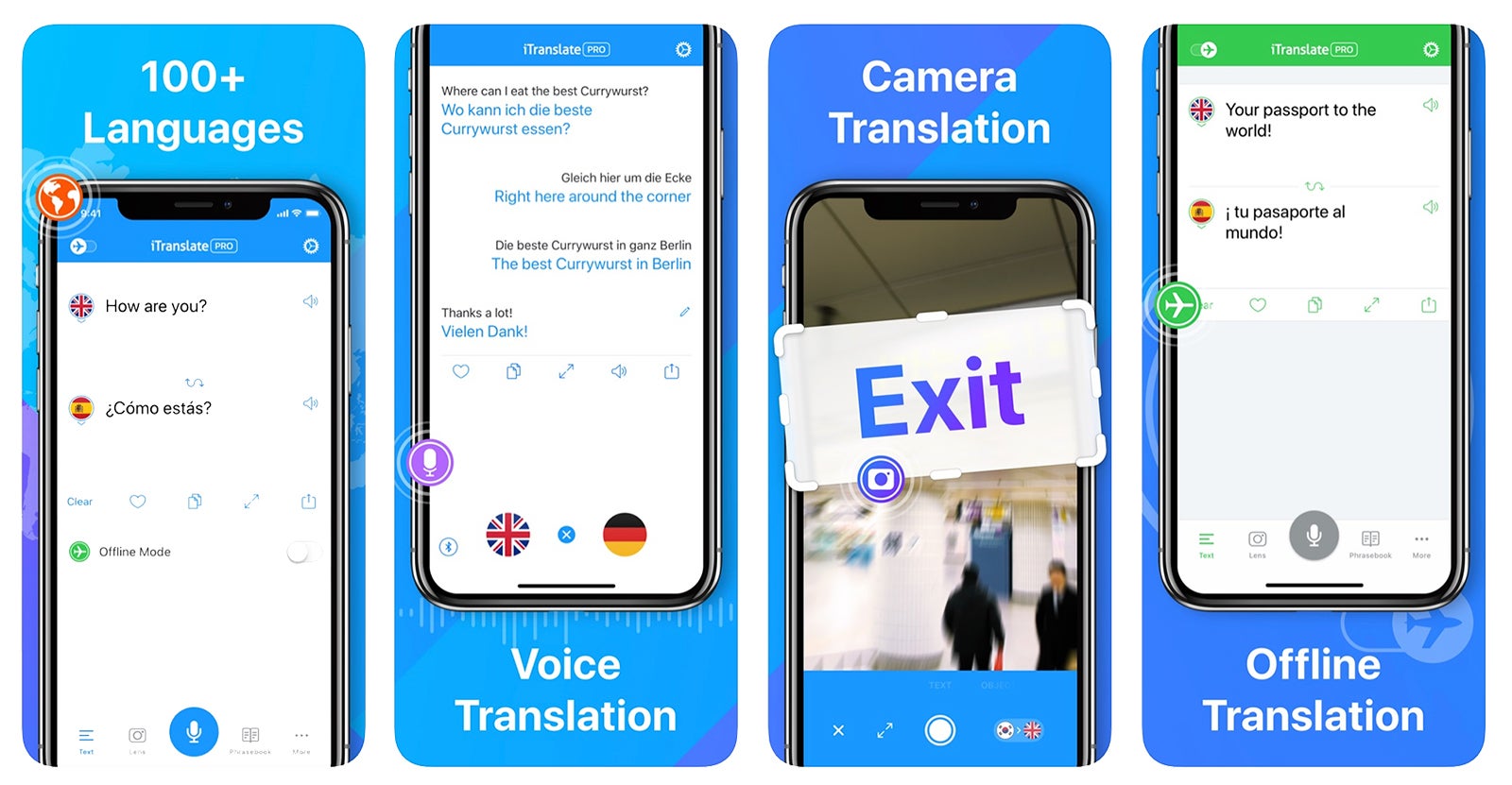
Google Translate
This app allows you to translate 108 languages by typing in a word or a phrase and offers access to 59 languages offline. You can use handwriting (where you draw text or characters instead of typing) in 95 languages. For camera translation in 90 languages, you can point your camera for an instant translation of, say, a menu. Two-way instant speech translation is available in 43 languages. Google Translate is simple to use too, with icons at the top you can click to draw, take a photo, speak or type. Download for free on iTunes or Google Play .

If you want to sound savvy abroad, TripLingo will help you communicate like the locals and understand their culture. Start by selecting a country (there are more than 100 countries, from Nepal to New Zealand, Senegal to Spain, Indonesia to Israel and beyond) and then downloading the pack for your desired destination. For example, if you're heading to Spain, you'll have a voice translator that will translate your voice into Spanish, an image translator, a selection of key Spanish phrases, a Wi-Fi dialer so you can make calls from abroad (you can add credits starting at $10), and even a section about tipping, safety and cultural norms to ensure you'll blend right in.
There are suggested phrases you can use for a little humor and fun, nightlife and even flirting -- all can be downloaded and accessed offline. A pro version with added phrases, a $3 Wi-Fi call credit, a free call to a live translator and audio lessons starts at $19.99 per month . Or, if you find yourself in a sticky situation while abroad and need serious translation assistance, access to a live translator starts at $3 per minute. Download the basic version for free on iTunes or Google Play .
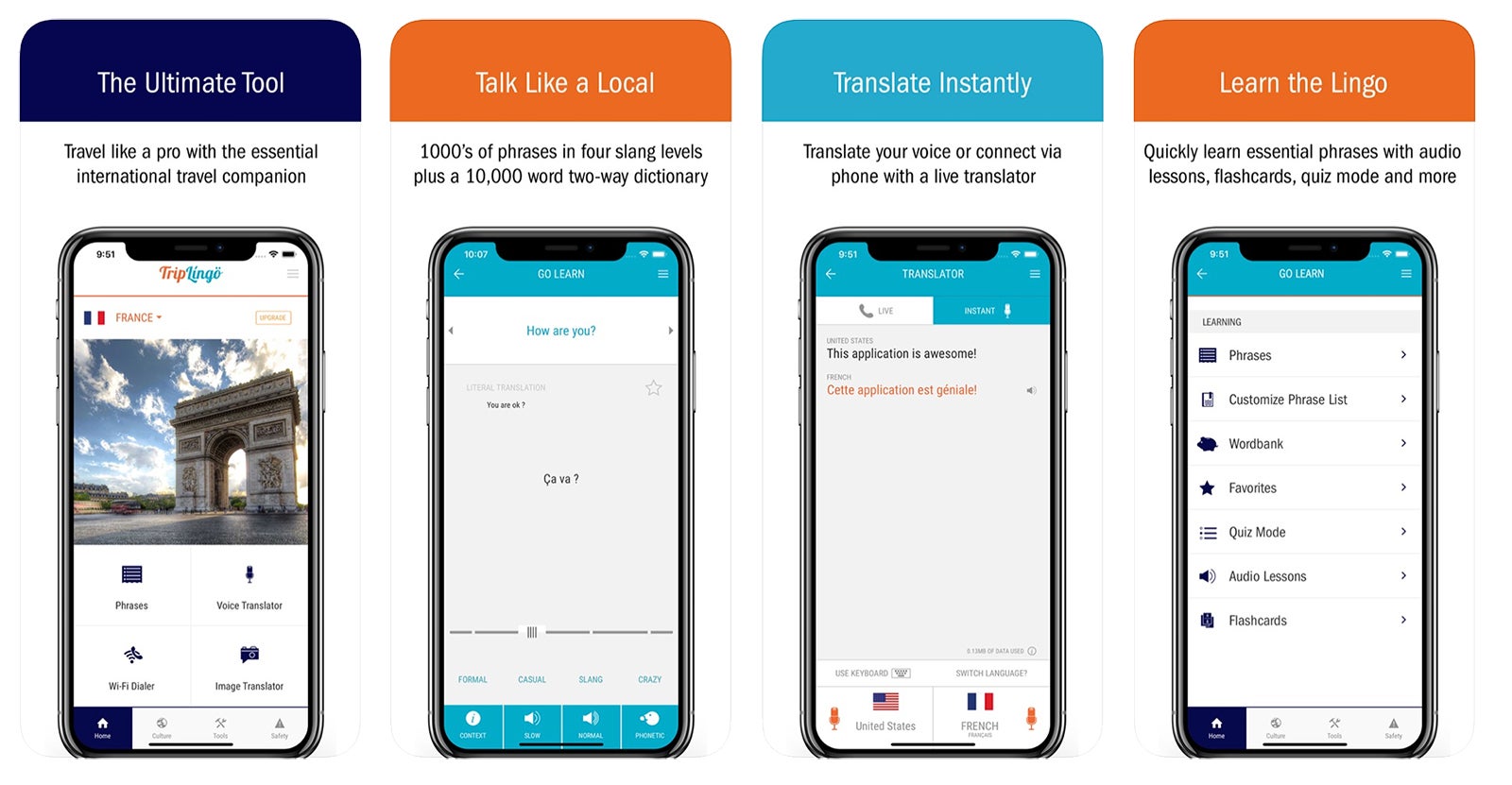
Translate your voice into 90 languages and dialects with SayHi. The app allows you to record your voice and then translates it into the language you've selected. You can play your translation in the voice of either a woman or a man, and adjust the speed to your liking. If you're in a noisy environment, you can also type in the app instead of speaking into the microphone. The app is only available when you're connected to the internet through Wi-Fi or have at least a 3G data connection. Download for free on iTunes and Google Play .

Specializing in Asian languages, Papago translates between English and Korean, Japanese, Chinese (simplified/traditional), Indonesian, Vietnamese and Thai, as well as Russian, German, Italian and Spanish. Translations are available in the form of text and voice, and you can also have a conversation using the app in which two people can simultaneously speak and have the app automatically translate the respective languages. Photo translation, handwriting translation and offline translation are all available. There is a dictionary/phrasebook, too. You can download a special section just for kids. Download for free on iTunes and Google Play .

Microsoft Translator
Translate text, voice and photos between English and more than 60 languages with Microsoft Translator. The app is ideal for business travelers, with a multi-person conversation translation feature where you connect your devices and can actually speak with as many as 100 people at a time in different languages. The split-screen function lets you see a phrase while someone sitting across from you can read the translation. Language packs are available for offline translation. With translation guides and pronunciation help (the app is particularly useful for Chinese), you can also learn how to properly speak some of the phrases you're translating instead of relying only on the voice function. Download for free on iTunes or Google Play .

Waygo only translates from English to and from Chinese, Japanese and Korean, but it can be a lifesaver if you're stuck without Wi-Fi, as it's available entirely offline. The app is best used with the instant camera — just point at signs and menus and then see your translation. Foodies will find Waygo particularly useful, as you can go into the food picture mode after translating a menu item to better understand what you're about to order. The basic version includes 10 free translations per day, and the upgraded version, which includes unlimited translations, costs $6.99 for just one of the three languages or $11.99 for all three. Download the basic version for free on iTunes and Google Play .

iTranslate Voice
Similar to SayHi, this app translates audio into more than 40 languages, allowing you to ask a local for directions, tell a taxi driver an address or say almost anything you'd like in another language. You record yourself and then your voice is immediately translated into your chosen language. You can record someone's response in their language, and the app will then translate it into your language. You can also connect two devices and have easy back-and-forth conversations with someone who doesn't speak your language. The pro version comes with a custom phrasebook, unlimited translations and transcripts and no ads for $39.99 per year. Or, download the basic version (with limited translations) for free on iTunes .

Speak and Translate
If you're willing to pay for a translation app and are interested in translating less common languages, consider Speak and Translate, which translates to 117 languages for text and 54 languages for voice. It integrates seamlessly with iCloud, allowing you to sync your translation history across all your Apple devices. You can also change the voice speed and select the gender you want to read your translations. Download and pay $6.99 per month or $38.99 per year (a short three-day or seven-day trial may be included) on iTunes .
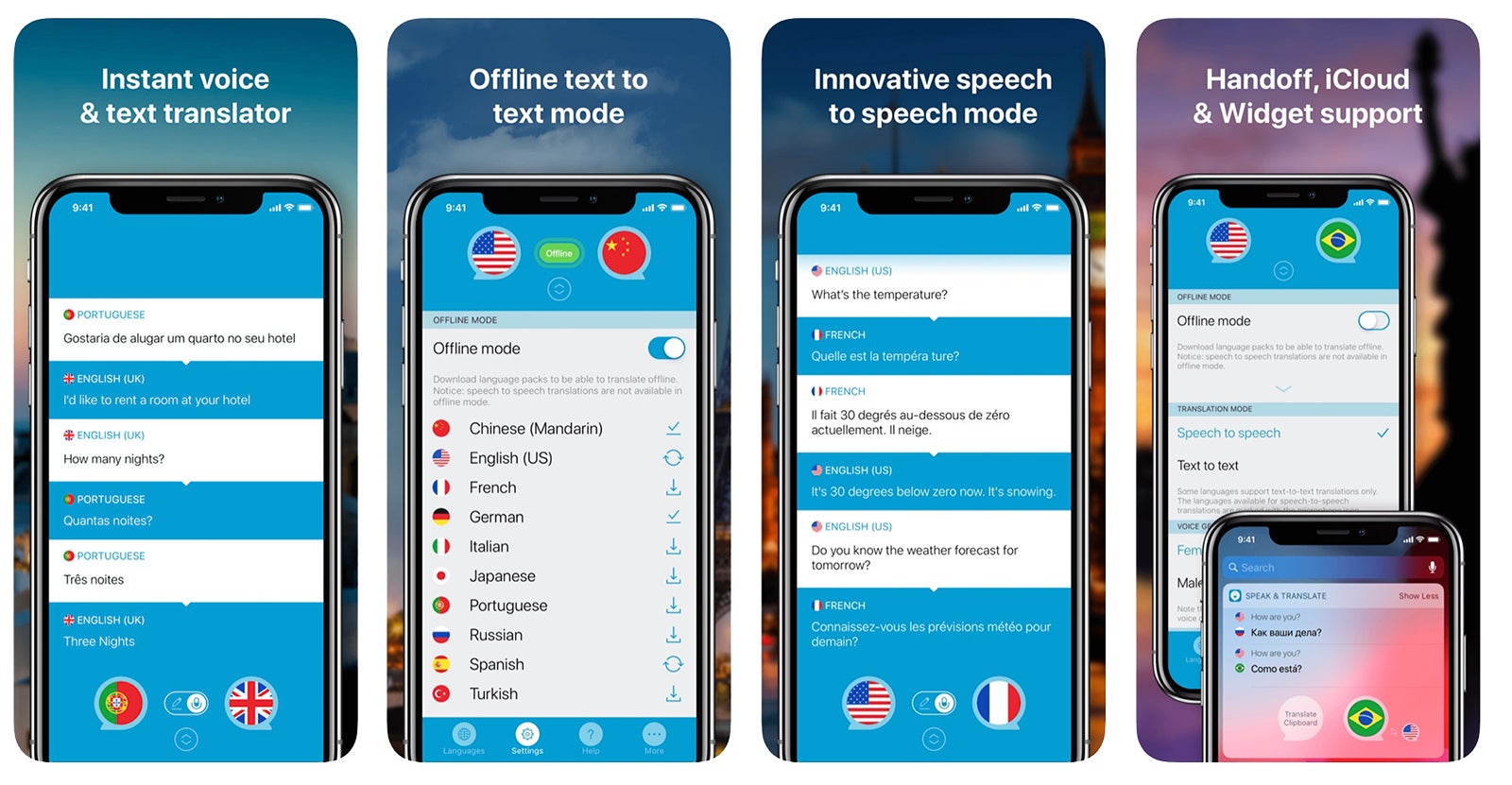
Related: New to The Points Guy? Check out our points and miles guide for beginners.
- United Arab Emirates
- Switzerland
- The Netherlands
- Puerto Rico
- United States
- New Zealand
- ➨ Choose from World Map
- Budget Travel
- Family Travel
- Getting Around
- Visas & Passports
- Work with Us
Browsing Category
- Czech Republic
- Saint Martin
- Uncategorized

Moscow Travel Guide: Best Things to Do + More [2023]
· everything to know about visiting moscow, including the best things to do and how to get around. ·.

Moscow is Russia’s vibrant capital city, and it also happens to be the largest city in all of Europe. The city’s long and infamous history makes it one of the most unique places we have ever visited.
The architecture ranges from centuries-old palaces to uniform, gray concrete buildings. The people range from cold and private to warm and welcoming. Moscow is a city is strong juxtapositions, and we learned a lot during our time there.
This post will break down all you need to know about visiting Moscow, including the best things to do, how to get there, how to get around, and more.

The Best Things to Do in Moscow
1. explore the red square.
The Red Square is the heart of Moscow. Most of the city’s top attractions can be found here, including just about everything on this list. The Kremlin, St. Basil’s Cathedral, and Lenin’s Mausoleum are all located here, and the State Historical Museum and GUM are not far from here, either.
The Red Square is a common home for parades, protests, and seasonal celebrations. There are massive Christmas celebrations here, with food vendors and carnival rides set up in numbers.
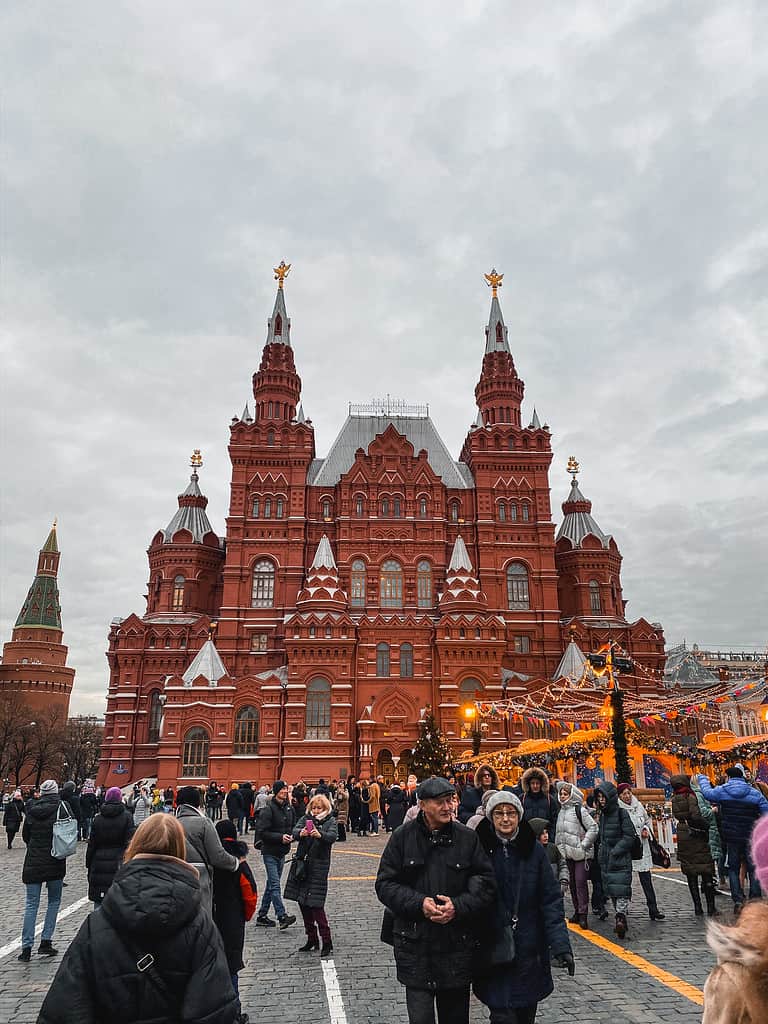
2. Check Out the Ziferblat
The Ziferblat is a café in Moscow that is unlike any café we have ever been to. While most cafes charge you for your drinks and food, the Ziferblat charges you for your time.
Upon arrival, you are given a clock. When you leave, the barista calculates how much time you spent in the café and charges you accordingly. This concept was created to help visitors to be more intentional with their time, and the cafe itself is incredibly charming.
For a detailed look at everything you need to know before you visit, make sure you read my post about visiting the Ziferblat Cafe in Moscow .

3. Marvel at St. Basil’s Cathedral
St. Basil’s Cathedral is one of the most iconic churches in the world, and it was the single thing we were most excited to see while in Moscow. Built almost 500 years ago, St. Basil’s Cathedral is recognized by its colorful domes and whimsical style. The church is of the Russian Orthodox faith, and the inside is just as wondrous as the outside.
St. Basil’s Cathedral is located on the edge of the Red Square, making it incredibly convenient to visit. Entrance for non-worshippers costs 800 rubles, and tickets can be bought at the church
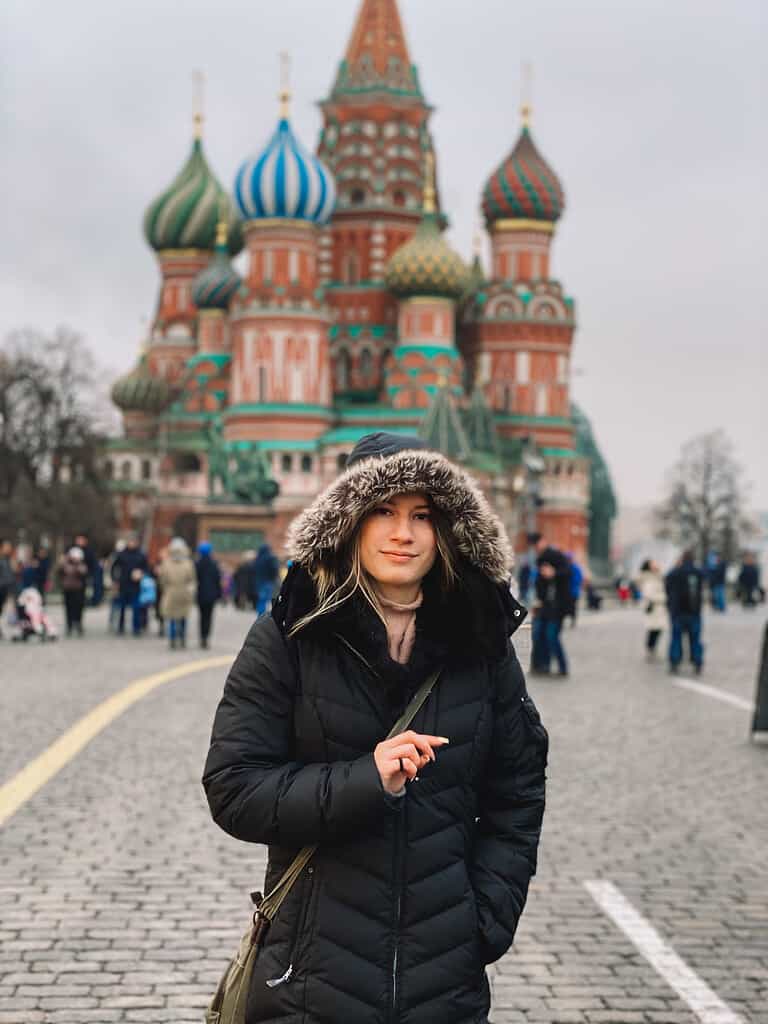
4. Explore the Kremlin
The Kremlin is the largest active fortress in Europe, and it is the site of most of Russia’s government affairs. In addition to government buildings, the Kremlin Complex is filled with courtyards, towers, and museums that are open to the public. If you have the time, you could spend a couple of days fully exploring all that there is to see in the Kremlin.
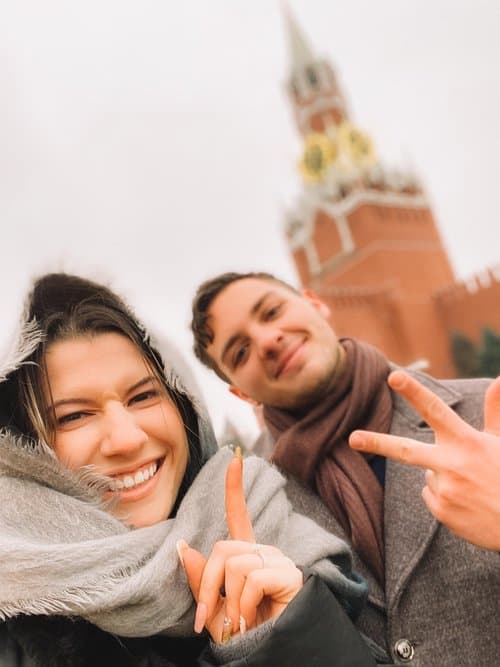
5. Walk Through Lenin’s Mausoleum
Vladimir Lenin is one of the most important figures in Russian history, and his body is located perfectly embalmed in a mausoleum in the Red Square. The Mausoleum is open to the public to visit, and as long as you are willing to go through a few security checks, it is easily one of the best things to do in Moscow. Its convenient location in the Red Square makes it a can’t miss attraction.
There is absolutely no photography allowed inside the Mausoleum. Do not test this rule.
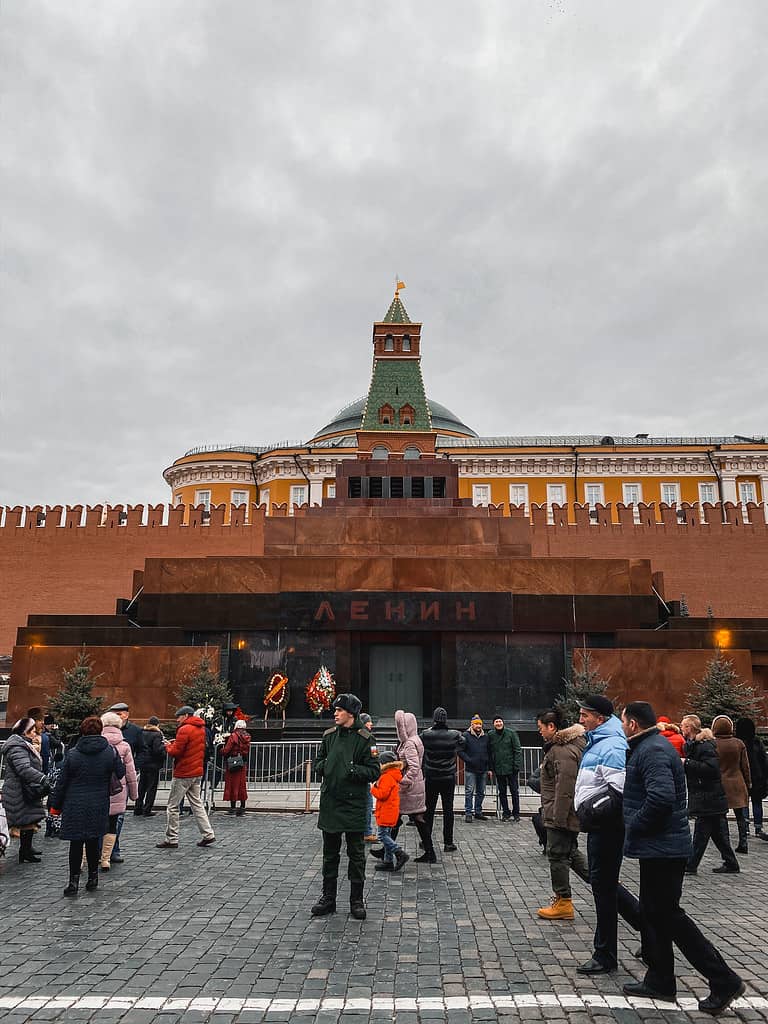
6. Wander Along Arbat Street
The Arbat is a very popular street in Moscow that is lined with stores, cafes, and other touristy attractions. It is one of the oldest streets in the city, dating back to the 1400s. This street is both quaint and trendy, and there are many walking tours that introduce tourists to the neighborhood’s wonders and highlights.

7. Catch a Show at the Bolshoi Theatre
As a lover of the arts, it is hard to think of Moscow and not think of ballet. Russia has always been a top dog in the world of fine arts, and Bolshoi Theater is one of the best places to catch a performance. We were lucky enough to attend an Opera here, and it is a venue that you don’t want to miss out on if you enjoy opera, ballet, or orchestral performances.
8. Visit the State Historical Museum
The State Historical Museum is one of the most respected museums in Moscow. Despite its name, it is not really focused on the history of Russia as a nation. Rather, it contains a collection of artifacts from all throughout Russia’s history.
The museum’s collection is very broad in nature. It houses some items from indigenous tribes that used to occupy the region, pieces collected by the Romanov family, and more.

9. Wander Around GUM
GUM is an absolutely massive mall within walking distance of the Red Square. It isn’t just the size that draws visitors here; it’s the sense of luxury. The mall is so beautiful inside, much like the metro stations.
While visiting a mall might not sound like it belongs on a bucket list, this mall does. You will not want to miss out on visiting GUM while in Moscow.

10. Admire the Cathedral of Christ the Saviour
While St. Basil’s Cathedral is the most iconic church in Moscow, it isn’t the only one. The Cathedral of Christ the Saviour is absolutely stunning, with massive golden domes. It is the tallest Orthodox church in the world, and it is the seat of the Orthodox Patriarch of Moscow.
It is located just about a mile from the Red Square, just south of the Kremlin Complex. You can walk to it from the Red Square in about 20 minutes.
How to Get to Moscow
Flying to moscow.
Moscow has three major international airports: Sheremetyevo (SVO) , Domodedovo (DMO) , and Vnukovo (VKO) . All three of them are directly connected to downtown Moscow by the Aeroexpress trains, which leave every 30 minutes throughout the day. By Aeroexpress train, you can expect to get to the city center in 25-45 minutes depending on the airport that you fly into.
Sheremetyevo is the biggest and busiest of the three airports, and it is the one you are most likely to fly into – especially if you are coming from outside of Europe or the Caucus region. We flew into Sheremetyevo on a direct flight from New York City.
I usually provide backup airport options, because flying right into the city isn’t always the cheapest way to get where you’re going. Unfortunately, when it comes to Moscow, don’t really have a choice other than to fly right into Moscow. It is a very remote city, and it is usually the cheapest place to fly into in Russia as a whole.
Since Sheremetyevo is so busy, you will probably find a great flight option anyway. I wrote in my post about finding cheap flights that using hub airports will lead to more affordable airfare, and the same logic applies here. Even though Russia’s national airline, Aeroflot, is no longer a member of the SkyTeam Alliance, Moscow is still a major hub connecting passengers from all over the world.

READ OUR CHEAT SHEET
Train or Bus to Moscow
Trains and buses are one of the most popular ways to get around Europe. However, they’re of very little use when you’re trying to get to Moscow.
Moscow is hundreds of miles from the nearest major cities. The only major European city that can even be reached within 8 hours on the ground is St. Petersburg, and even the Baltic capitals of Riga, Vilnius, and Tallinn are over 12 hours away.
If you want to get to Moscow, the best option is almost always to fly. While the train routes to Moscow are scenic, they simply take forever.
How to Get Around Moscow
METRO | TROLLEYS | TRAMS | BUSES
Moscow has one of the most memorable metro systems in the world. Its metro lines are very deep underground, and the stations are absolutely stunning. Each station has its own unique style, but all of them contain escalators that seem to go on forever.

The system was built in an effort to showcase the power of the Soviet Union and its bright future. The plans were a form of propaganda, but they resulted in what is still one of the most visually appealing subway systems on earth.
Moscow’s metro system isn’t just pretty. It is also very useful and accessible. The system has 17 lines that connect the city and its surrounding area.
But wait; there’s more!
The Moscow metro system is also incredibly affordable, with each ride costing less than a dollar. The metro is by far the best way to get around Moscow, as it is almost impossible to beat the connection times and the low cost to ride.
Tickets can be bought at electronic, English-speaking kiosks in stations, or directly from ticket counters at certain larger stations. There are also day passes available, which are a very solid option if you plan on riding the metro several times per day.

The metro is by far the best way to get around Moscow.
In addition to the metro system, Moscow also has a network of buses, trams, and trolleys. This system is nowhere near as convenient or well-connected as the metro, though, and is likely of little use to you during your trip. There is no Uber in Moscow, but a similar app named Yandex is available if you need a ride in a pinch.
How Many Days Do You Need in Moscow?
Moscow is the biggest city in all of Europe, and it is absolutely loaded with things to do. You could spend weeks in Moscow and still find new things to do. Of course, most travelers don’t have that kind of time to spend in one place!
I recommend spending no less than three full days in Moscow, and ideally closer to five or seven.
Moscow is very spread out, and it can take some time to get from one major point to another. There are also so many places that are nice to just sit back and relax, which is hard to do when you’re in a hurry trying to cram activities into just a few days.
If you only have a week to visit Russia, I’d advise spending all of the time in one city. If you decide to split your time between Moscow and St. Petersburg, I recommend not trying to squeeze in any day trips beyond those two cities.
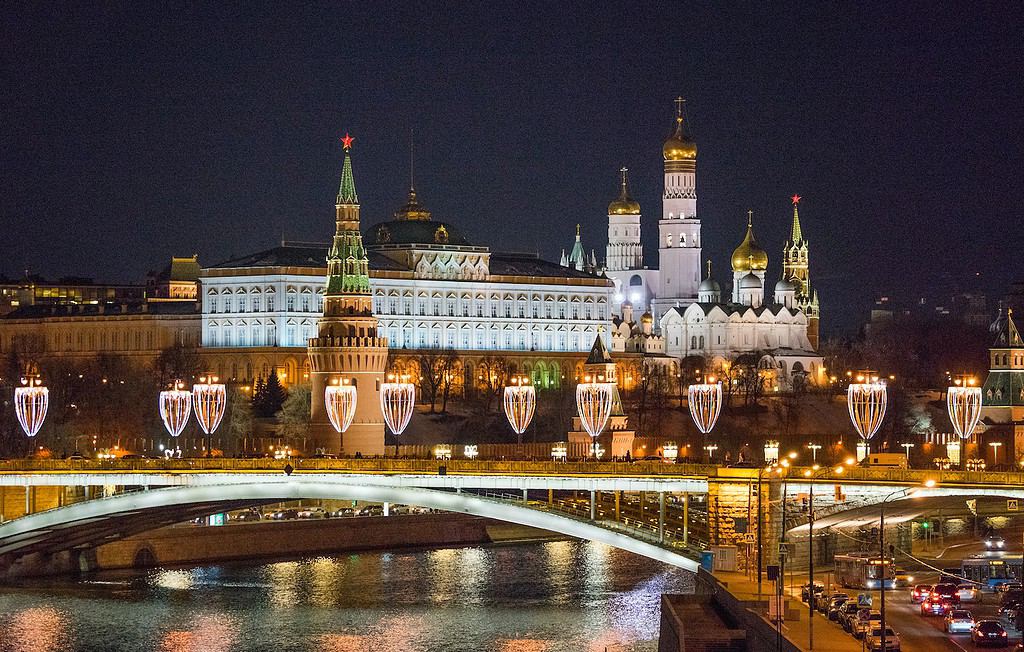
When Is the Best Time of the Year to Visit Moscow?
There are two different ways to approach this question. Personally, I think the best time to visit Moscow is around Christmas and New Year’s Day. While the weather will be absolutely freezing, Moscow is a surreal winter wonderland in December and January.
We were in Moscow right before Christmas. While it was very cold, you can always bundle up. Exploring the Christmas markets and pop-up ice skating rinks throughout Moscow is one of my favorite memories from anywhere I’ve traveled, and I dream of going back to do it again.
If you aren’t fond of the cold, Moscow is beautiful in the summer. It tends to get pretty cold in the shoulder seasons, so if you want warm weather, you should plan to visit in the summer. Moscow actually gets pretty warm in July and August, and there are a bunch of fantastic places to soak up the sun within the city.
The best time to visit Moscow is either around Christmas or from late May to August.

Is Moscow Safe to Visit?
While Moscow is a truly wonderful city, there’s no denying that visiting Russia comes with risks. As the country is run by an infamous communist dictator, concerns about visiting are valid. While we didn’t experience any sort of threat or negative treatment during our time in Moscow, we visited in a peaceful time.
In our experience, Russia doesn’t seem to detain normal Americans or Westerners to use as pawns. As a regular person, as long as you don’t commit any crimes, there is a slim chance you will run into any issues. However, Russia will not hesitate to enforce its laws against foreigners, and illegal behaviors will likely land you in a very compromising position.
Russia will not hesitate to enforce its laws against foreigners, and illegal behaviors will likely land you in a very compromising position.
To make matters worse, Russia has a bad reputation for gang violence. While the Russian mafia has very little interest in normal Western tourists, they won’t hesitate to pick a fight with anyone who ventures into their sphere of influence. If you seek out illegal substances or activities, you could be a target of the mafia.
If you seek out illegal substances or activities, you could be a target of the mafia.
Finally, since Russia’s invasion of Ukraine, things are all very different. Russia is currently at war, and there are battles raging within 8 hours of Moscow. While it is still relatively safe to visit, that could change at any time as the war with Ukraine continues.
Is Moscow Worth Visiting?
Without a doubt, Moscow is worth visiting. It is one of the most unique major cities we have ever visited, and we hope to make it back one day. The Russian Orthodox churches are stunning, the city’s history is unlike any other, and the food is to die for.
While many visitors prefer St. Petersburg to Moscow, I think Moscow deserves a lot of hype of its own. Moscow is the beating heart of Russian culture and history, and it’s a place I highly recommend checking out if you have the chance.
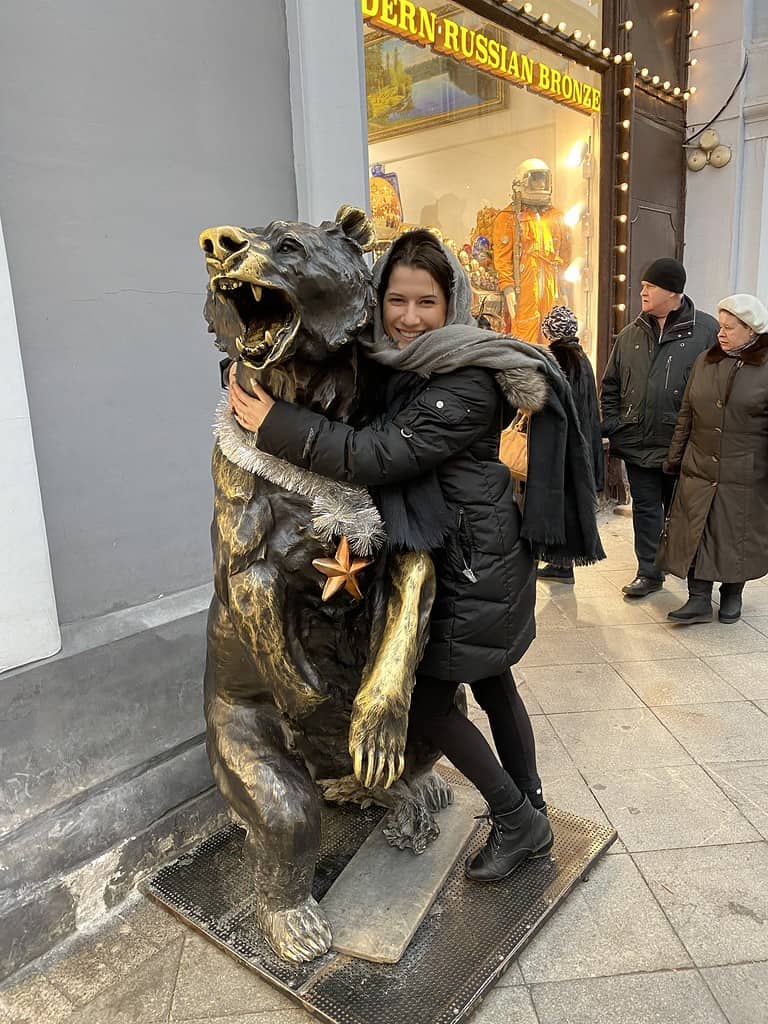
That’s all we have for you about Moscow! I hope this post was helpful as you plan your trip to Russia’s capital.
Have you been to Moscow? Or is this your first time visiting? Comment below if you have anything to add to our travel guide!
Hi, I'm Greg. I'm an avid traveler who has traveled to over 50 countries all around the world with my wife and kids. I've lived in Italy, Mexico, China, and the United States, and I dream of moving abroad again in the future. With this blog, I provide my audience with detailed destination guides to my favorite places and pro-tips to make travel as stress-free as possible.
Leave a comment
Save my name, email, and website in this browser for the next time I comment.
Meet The Author - Greg

Recent Post

How Much Does a Trip to Egypt Cost: Budget Breakdown
March 10, 2024

Best Time to Visit the India Gate in Delhi [2024]
March 1, 2024

Flying with a Sinus Infection: Tips to Avoid Pain
February 20, 2024

11 Best Things to Do in Breckenridge Besides Skiing
February 12, 2024

10 Best Beaches in Mexico for Families (We Lived Here)
February 3, 2024


Want to create or adapt books like this? Learn more about how Pressbooks supports open publishing practices.
3 Talking about Travel and Experiences
In this chapter, you will learn about:
- Wh and Yes/ No question formation
- Intonation in English
- Opening, closing and extending basic conversations

“The world is a book, and those who do not travel read only a page”
– Saint Augustine
Discussion Questions
- Read the quotation above. What does it mean?
- Do you like to travel? Why or why not?
Chapter 3 Vocabulary
view (n./v.) produce (v.) develop (v.) remember(v.) decide (v.)
argue (v.) achieve (v.) challenge (n./v.) introduce (v.) ability (n.)
Use your dictionary to find the meaning for the vocabulary words in the box above. Then write the words from the box next to their definitions below.
An opinion or way of thinking about something: .
To get or reach something by working hard: .
To make someone or something known by name: .
The power or skill to do something: .
To cause something to grow or become bigger: .
To make a choice about something: .
To keep an idea or image in your mind: .
A difficult problem: .
To give reasons for or against something: .
To make or create something: .
Part 2: Syllables
Listen to the pronunciation of the vocabulary words. Write the number of syllables that you hear in each word. The first word has been done for you.

- introduce =
- challenge =
Activity 2 Part 1
Read the conversation and complete the missing words with the chapter 3 vocabulary words below. You will not use three of the words.
Sam : Hey Tina! I haven’t seen you all year! How was your trip to Brazil last year?
Tina : Hey Sam! I know! It’s been a long time since I’ve seen you. My trip was great. I had a few that were kind of difficult, but it was a good trip overall.
Sam : How did you to visit Brazil? Had you traveled there before?
Tina : No, I hadn’t, but my friend me to some Brazilian people and they were very nice, so I bought a ticket and went.
Sam : Cool! Do you any interesting things that you did while you were there?
Tina : Well, my friend that I went with actually short travel films, so he made a movie about our trip. It shows all the places we went. I’ll give you the website, so you can watch it.
Sam : Wow! That sounds great! It’s not easy to travel with a friend. Did you or fight with each other?
Tina : No, not really. We got along great, and we had so much fun.
Sam : That’s great to hear. Would you return in the future?
Tina : Yes, definitely! If I have the , I will return in the future .
Sam : Cool. Well, it’s great to see you!
Tina : You too! See you around!
Sam : You too! Bye!
Activity 2 Part 2

Chapter 3 Activity 2
Grammar Point: Questions in English
There are two types of questions in English: Yes/ No questions and WH questions.
Yes/No questions
Begin with these verbs: Do/ Does — Is / Are
They are answered with a “Yes” or a “No”.
The be verb (is/are) is used to start questions when a noun or adjective follows the subject.
Question: Is Ms. Brown a teacher ? (noun)
Answer: Yes, she is.
Question: Are the students happy ? (adjective)
Answer: No, they aren’t.
The verbs ‘do’ or ‘does’ are used to start questions when a verb follows the subject.
Question: Does she work here? (verb)
Answer: No, she doesn’t.
Question: Do they speak English? (verb)
Answer: Yes, they do.
W H questions
Follow the same grammar rules, but they begin with the question words:
Who, What, When, Where, How, Why
WH questions have longer answers, not just “yes” or “no”
Where does she live?
She lives downtown.
When is your class?
I have class on Monday and Wednesday.
Look at the answers below. Write a question that matches the answer. Think carefully about the grammar in the answer.
Question =?
Answer: No, they are from Canada.
Answer: She works at a bank.
Answer: My birthday is June 22nd.
Answer: Yes, I’m a student here.
Discussion Activit y
You and your best friend are taking a vacation for spring break. You are deciding between two kinds of vacations. First, ask your partner the WH questions below, so you understand what kind of vacation they like.
- What kind of weather do you like?
- Do you want to exercise or relax on vacation?
- Do long flights annoy you?
- What is your budget (how much money can you spend)?
- How long do you want to go for?
Now, study the information below about the two vacations. Together, with your partner, choose one vacation. You must agree with your partner on the same vacation.
Which vacation will you choose? Why?
Vacation #1: Ski Vacation in Canada
- 2-hour flight from Portland
- Cold, snowy weather
- Hotel includes hot tub and swimming pool
- English language is spoken
- Breakfast and dinner included
- Opportunities to ski and snowboard
- $3,000.00 for 6 days
Vacation #2: Beach vacation in the Maldives
- 18-hour flight from Portland
- Hot, sunny weather
- Hotel is right on the beach
- Some English is spoken
- No meals included
- Opportunities to swim and dive
- $3,500.00 for 5 days
Speaking Tip: Intonation
In the English language, the sound of a person’s voice goes up or down when they say the last word of a question or sentence. This difference in sound is called “intonation”.

- WH questions = falling intonation (voice goes down)
- Yes/No questions = rising intonation (up)
- Statements = falling intonation (down)
- Exclamations (excited speech!) = rising then falling intonation (up then down)
Practicing Intonation
Practice activity 1.
Directions: Listen to the questions and circle the type of intonation you hear.

Listening for Intonation
Practice Activity 2
Directions: Using the intonation examples on the previous page, decide if the questions and statements below have rising or falling intonation. Draw an up or down arrow next to each number. The first one has been done for you.

- I travel as often as I can.
- What is your favorite country?
- Are you from Japan?
- I love to travel!
Practice Activity 3
Directions: Ask your partner the questions below. Practice using correct intonation.
- Where are you from?
- When was your last vacation?
- Do you like to travel on trains?
- What is your name?
- Have you been to New York City?
- Where is your favorite place to travel in the world?
Speaking Tip: Conversation Continuers
These words are used to show interest or understanding in a conversation and to make conversations last longer. Study them and include them in your English conversation.
To show interest
- Tell me more.
- That’s interesting.
To show concern
- Oh, that’s too bad.
- I’m sorry to hear that.
- What happened?
To show excitement
- That’s great!
To follow up
- What about you?
- Tell me about you.
- Enough about me.
- Let’s talk about you.
Directions: Using the words and phrases from above, work with a partner to complete the conversation below. Then practice reading the conversation using correct intonation.
A: Hey! How are you?
B: I’m not that good.
A: ?
B: Well, I missed my flight. Now I have to pay extra to fly tomorrow.
A:
B: Yeah. ?
A: Well, I’m actually great! I feel so happy today!
B: ?
A: I just got married this weekend.
B: !
A: I know! I’m so happy. But, I’m also feeling worried because of my busy schedule.
B: .
A: I’m going on a vacation next week, but I have so much work to do before then.
A: Well, good luck with your flight tomorrow!
B: Thanks! It was nice to see you!
A: You too! See you later!
Speaking Fluency Practice
Ask the questions below to your classmates. Use the conversation phrases on the page before to keep the conversation going back and forth.
- Do you like to travel?
- What is your favorite place you have traveled to?
- Do you like to travel alone or with people?
- When was your last trip?
- Do you like to fly on airplanes?
- Is it expensive to travel around your country?
- Do you like to achieve something when you travel or just relax?
- How do you decide where to go when you travel? Do you plan in advance?
- What do you remember about your best travel experience?
- When will you go on your next trip?

Hiking, by Maxmann
Homework survey
Directions: Ask five Americans or good speakers of English about their travel experiences. Listen and write their answers below.
- Where is your favorite place to travel?
- How often do you travel?
- How many countries have you travelled to?
- Where should I travel in the U.S.?
- Where should I travel in the U.S.
Chapter 3 R eview
- In this chapter, you learned about:
- How to make WH and Yes/No questions in English
- How intonation sounds in questions and statements in English
- Useful phrases for continuing conversations
Extra Listening Practice
- Keren compares ways to travel, such as travelling alone or with a friend.
- Greg gives travel tips on how not to get lost in a new location.
- David talks about the many places he has visited around the world.
Communication Beginnings Copyright © 2018 by Della Jean Abrahams is licensed under a Creative Commons Attribution-NonCommercial 4.0 International License , except where otherwise noted.
Share This Book
2018 Primetime Emmy & James Beard Award Winner
R&K Insider
Join our newsletter to get exclusives on where our correspondents travel, what they eat, where they stay. Free to sign up.
A History of Moscow in 13 Dishes
Featured city guides.

Speech on Travelling
Travelling takes you far and wide, unlocking the mysteries of the world. It’s like a storybook, full of adventures waiting to be discovered.
You might meet new people or try new foods. Every journey, every place, has its unique tale to tell. So, pack your bags, and let’s travel the world together!
1-minute Speech on Travelling
Good day, everyone! Let’s talk about travelling today, a joy that brings excitement, adventure, and learning.
Firstly, travelling helps us learn. When we visit new places, we learn about different cultures, traditions, and ways of life different from ours. It’s like opening a new book, but instead of reading pages, we’re exploring new places.
Secondly, travelling is an adventure. It’s like being a part of a thrilling story, where each place has its unique tale. From climbing mountains to swimming in the sea, every journey turns us into brave adventurers.
Thirdly, travelling helps us make new friends. We meet people from all around the world. We share stories, food, and even our favourite games. These friendships can last a lifetime and make our world a little smaller and friendlier.
Fourthly, travelling helps us appreciate nature’s beauty. We see the sunrise from mountaintops, feel the sand beneath our feet at beaches, and hear the rustling leaves in forests. We realize how beautiful our planet is and why we must protect it.
Lastly, travelling teaches us about ourselves. Being in new places challenges us and helps us grow. We learn to be patient, to adapt, and to solve problems. These lessons make us stronger and wiser.
In conclusion, travelling is more than just moving from one place to another. It’s about learning, adventure, friendship, love for nature, and self-discovery. So let’s pack our bags, lace up our shoes, and step out into the world. Because the world is a book and those who do not travel, read only one page. Let’s read the whole book together!
Also check:
- Essay on Travelling
- 10-lines on Travelling
- Advantages and Disadvantages of Travelling
2-minute Speech on Travelling
Ladies and Gentlemen, Boys and Girls,
Let’s talk about something we all love, something that fills our hearts with joy and our minds with wonder. I’m talking about travelling. Imagine the thrill of packing your bags, setting off on a journey, and stepping foot in a place you’ve never been before.
Travelling is a great teacher. When we travel, we learn new things. We learn about different foods, different music, different ways of dressing up, and different ways of living. We meet people who speak different languages and follow different beliefs. And in the process, we learn that our way is not the only way and that the world is a big, beautiful place full of variety and diversity.
Travelling also helps us grow as individuals. When we travel, we face new situations and challenges. We might need to figure out how to navigate a new city, or how to communicate when we don’t speak the local language. These experiences make us smarter and more confident. They show us that we can handle difficulties and solve problems on our own.
But travelling is not just about learning and growing. It’s also about fun and adventure. Think about the rush of excitement you feel when you see a stunning sunset on a beach, or when you reach the top of a mountain and take in the breathtaking view. Travelling gives us these unforgettable moments of joy and wonder.
Travelling also helps us appreciate what we have. When we see how people in other parts of the world live, we realize how lucky we are to have the things we often take for granted. We start to value our homes, our families, and our friends even more.
Finally, travelling makes us more open-minded and understanding. When we encounter different cultures and ways of life, we learn to respect and appreciate them. We understand that everyone has a unique story to tell, and we become more accepting of differences.
So, let’s embrace travelling. Let’s explore new places, meet new people, and learn new things. Let’s embark on new adventures, face new challenges, and create unforgettable memories. Let’s appreciate what we have and become more open-minded and understanding.
In conclusion, travelling is not just about visiting new places. It’s about experiencing new things, growing as individuals, having fun, appreciating what we have, and becoming better people. So let’s pack our bags, tie our shoelaces, and set off on our next journey. The world is waiting for us to explore it!
- Speech on World Rivers Day
- Speech on International Day of Sign Languages
- Speech on International Day of Peace (UN)
We also have speeches on more interesting topics that you may want to explore.
Leave a Reply Cancel reply
Your email address will not be published. Required fields are marked *
Save my name, email, and website in this browser for the next time I comment.
Discover the new Speak & Improve today!
- More than 40 different practice tasks in many different speaking skills
- 5 new complete tests to build your confidence
- get your scores for tasks and tests and then try to improve them
- collect awards and share them with your friends and family
Practise speaking English with me!
Get your grade and improve it..

Speak & Improve is a research project from the University of Cambridge. By using it you are helping us improve technology that will help English learners around the world.
- Talk to our speech robot, Sandi, who will ask you some questions.
- Afterwards, Sandi will give you a grade for your speaking.
- Were some questions difficult for you? Try them again to improve your score.
Sandi, our speech robot, uses new technology developed at the University of Cambridge. It can tell how well you speak English just by listening to you.
Sandi gives your Speaking an accurate grade on the internationally-recognised CEFR scale.
This can help you understand your speaking ability for work, study, exams (including Cambridge exams ), or just for fun.

25 places other than France where speaking French is helpful
Posted: January 8, 2024 | Last updated: January 8, 2024

Speaking another language is always helpful, especially if you love to travel. And French, commonly thought of as one of the most beautiful in the world, is also more useful than you might realize. Here are 25 destinations outside of France where you can put your French language skills to good use!

Home to delicious beer, chocolate, waffles, and fries (no, they actually didn’t originate in France), Belgium is also a French-speaking country. The language is one of three officially spoken in the country; the other two are Dutch and German. French is mostly spoken in the capital, Brussels, and in the south of the country.
You may also like: 15 weird & wonderful roadside attractions in the United States

Another multilingual state that borders France, the Grand Duchy has French, German, and Luxembourgish as official languages. However, French is one most commonly used on signs and in written communication in the country. You’ll also find it most helpful for small talk and chatting with residents.
Follow us on MSN to see more of our exclusive lifestyle content.
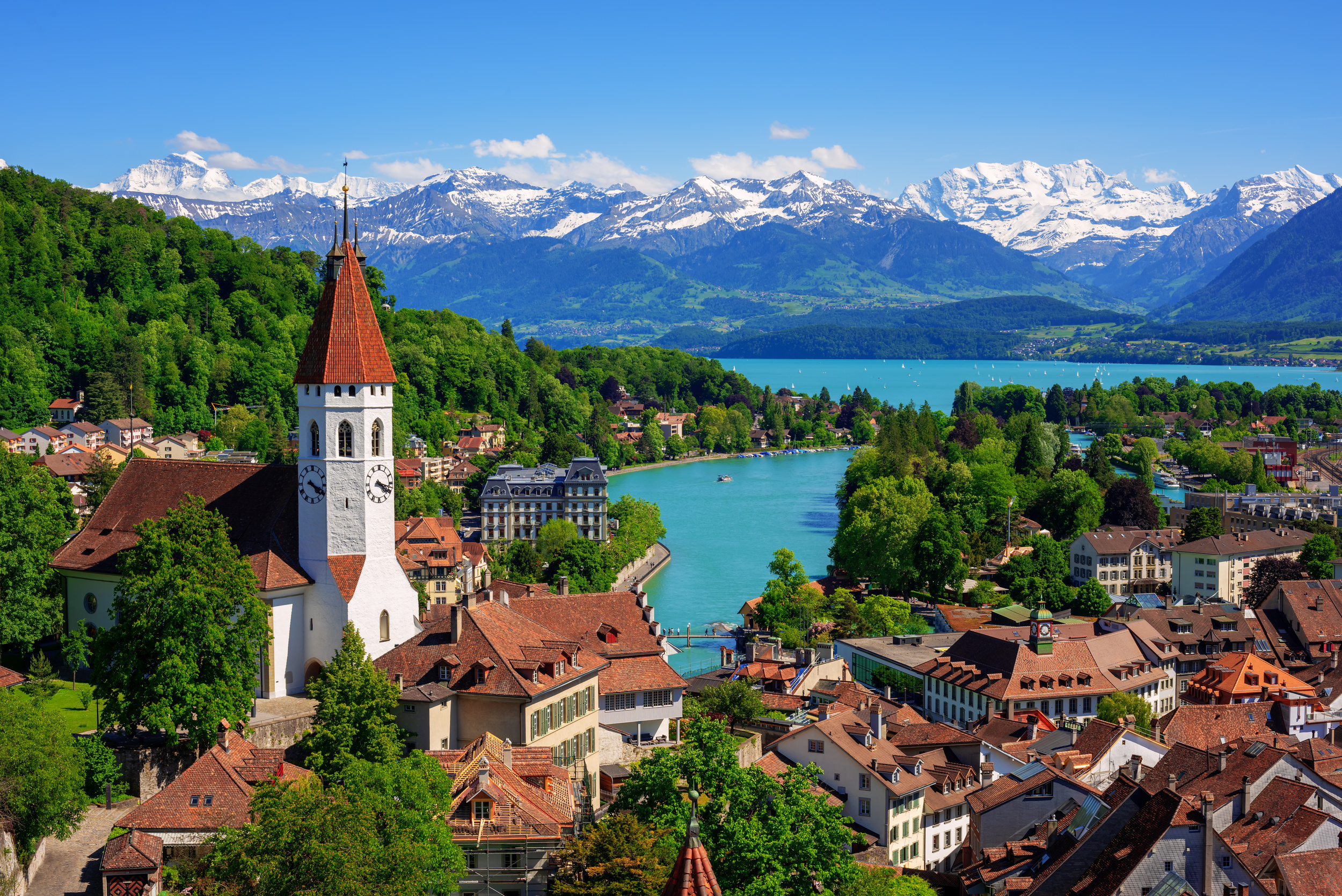
Switzerland
Yet another European country with French as one of the official languages (the others are German, Italian, and Rhaeto-Romance). You’ll find French most useful in Geneva and the surrounding area, although it’s used throughout Switzerland.
You may also like: Layered dips you can make that will feed the whole team
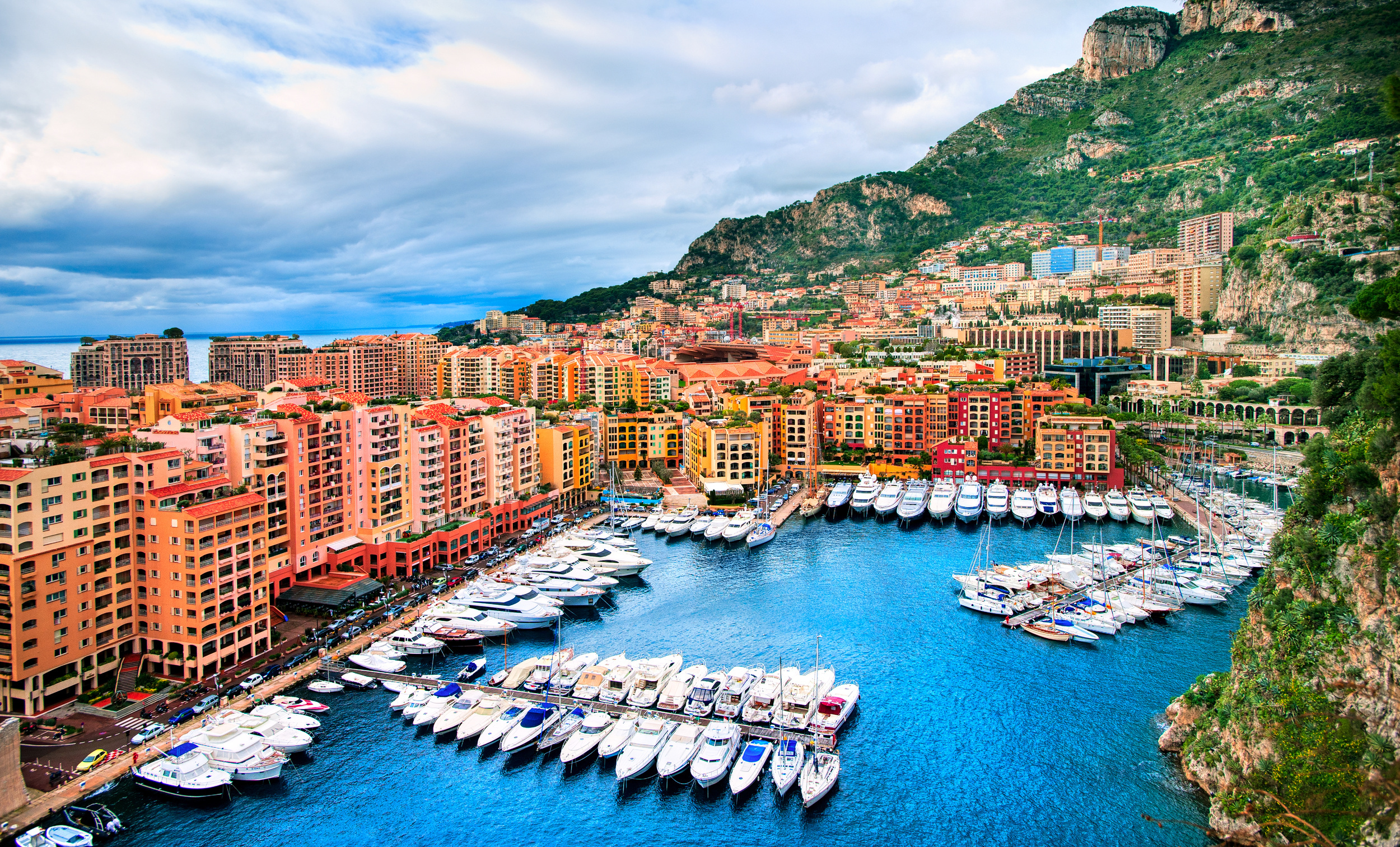
Many people make the mistake of assuming that this tiny state is a part of France. And while Monaco is surrounded by its’ much larger neighbor and uses the French language, it is a sovereign city-state with a monarchy. There is also a Monégasque language that has official status.

Aosta Valley
This region of Italy is located in the northwest of the country, near France. Latin was replaced by French as the official language after the fall of the Roman Empire and then, in the 19th century, was replaced with Italian. Today, the region is bilingual, and you’ll see French and Italian written on road signs and hear the two spoken by locals.
You may also like: 13 foods & drinks that cause bad breath and 13 that combat it

The French Empire had a strong presence in North Africa, and thus many nations in the region still use French as an official language. Morocco is one of these, and French is widespread along with Arabic and various Berber dialects. As a visitor, you’ll find it extremely useful when speaking to locals or reading signs and menus.
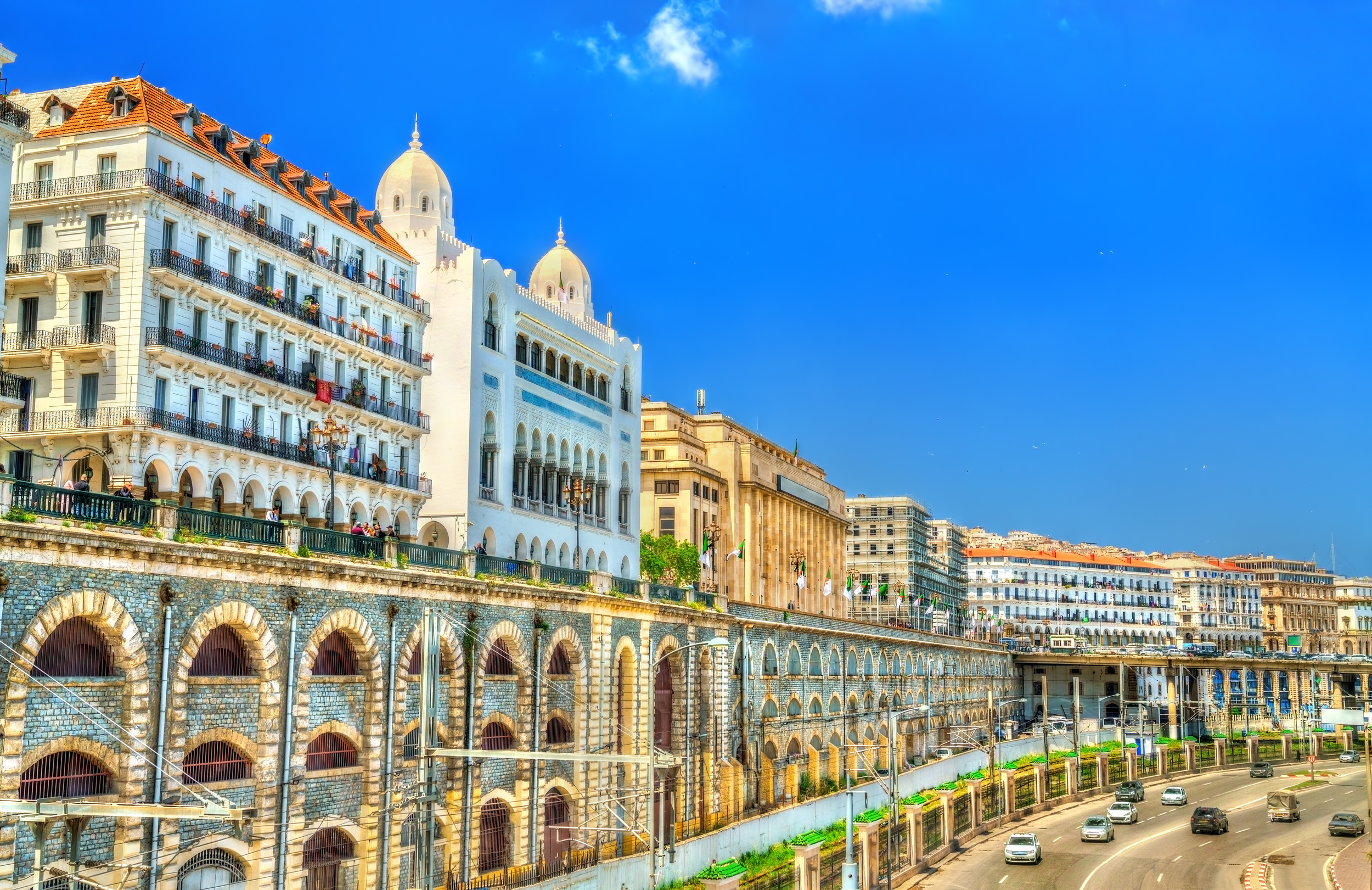
Algeria’s official languages are Arabic and Berber, but French is also commonly understood. While not as widely used as in neighboring Morocco, it will be your best bet if you don’t speak one of the official languages.
You may also like: 20 ingredients that will make your grilled cheese even better
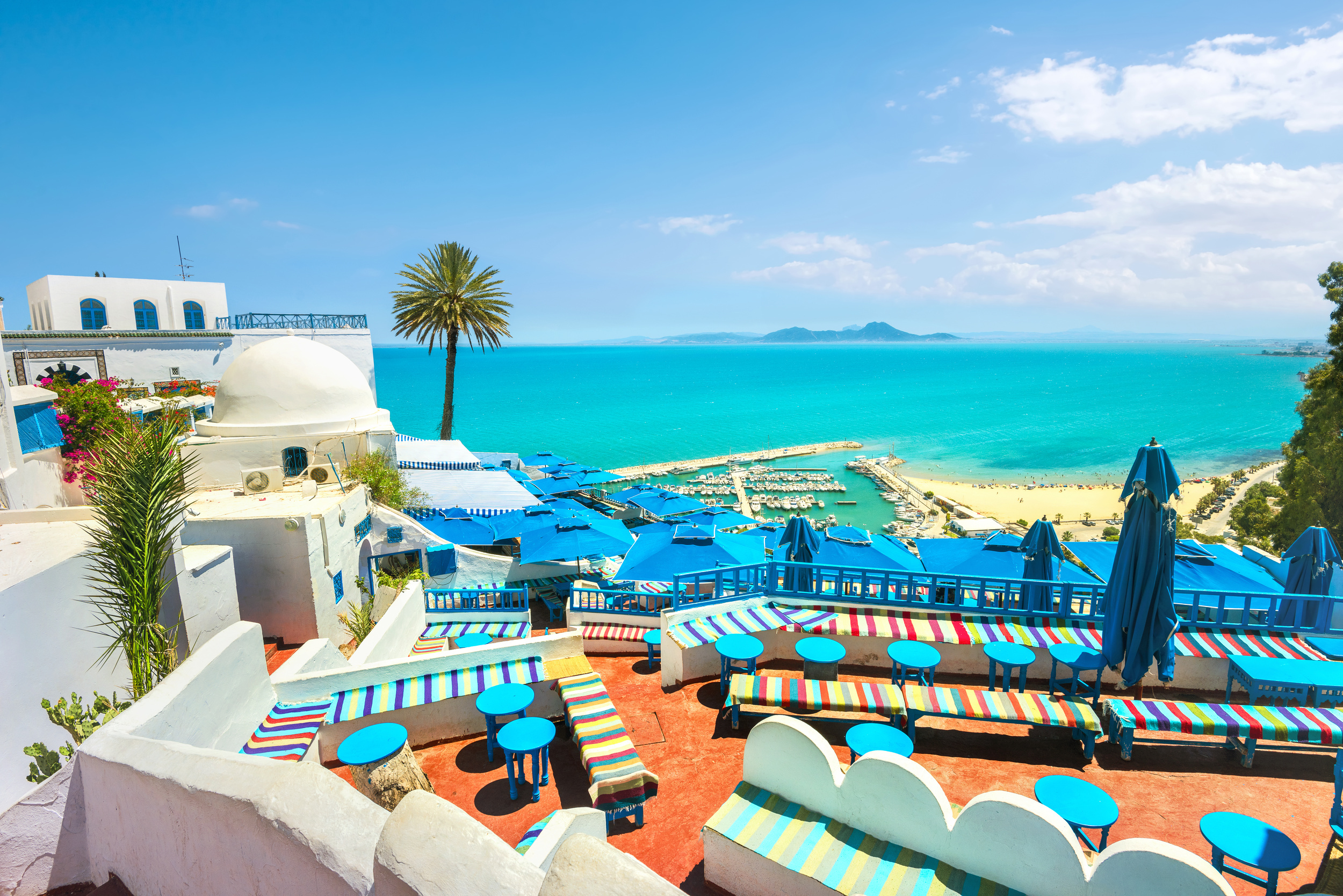
Another former French colonial outpost, the language is used and understood throughout the country in addition to Arabic and Tunisian. It’s estimated over half the population speaks French, and it’s the teaching language of high schools in the country.

Cameroon was a colony of both the UK and France in the early 20th century. So, English and French are spoken in the country. However, French is the most prevalent, with eight of 10 regions considered Francophone. Locals also speak numerous other indigenous languages.
You may also like: 20 beauty and skincare hacks that actually work

Ivory Coast
Known as “Côte d’Ivoire” in French, this coastal nation uses the old colonial language as the official one. Additionally, numerous indigenous languages also have recognized status in the Ivory Coast.
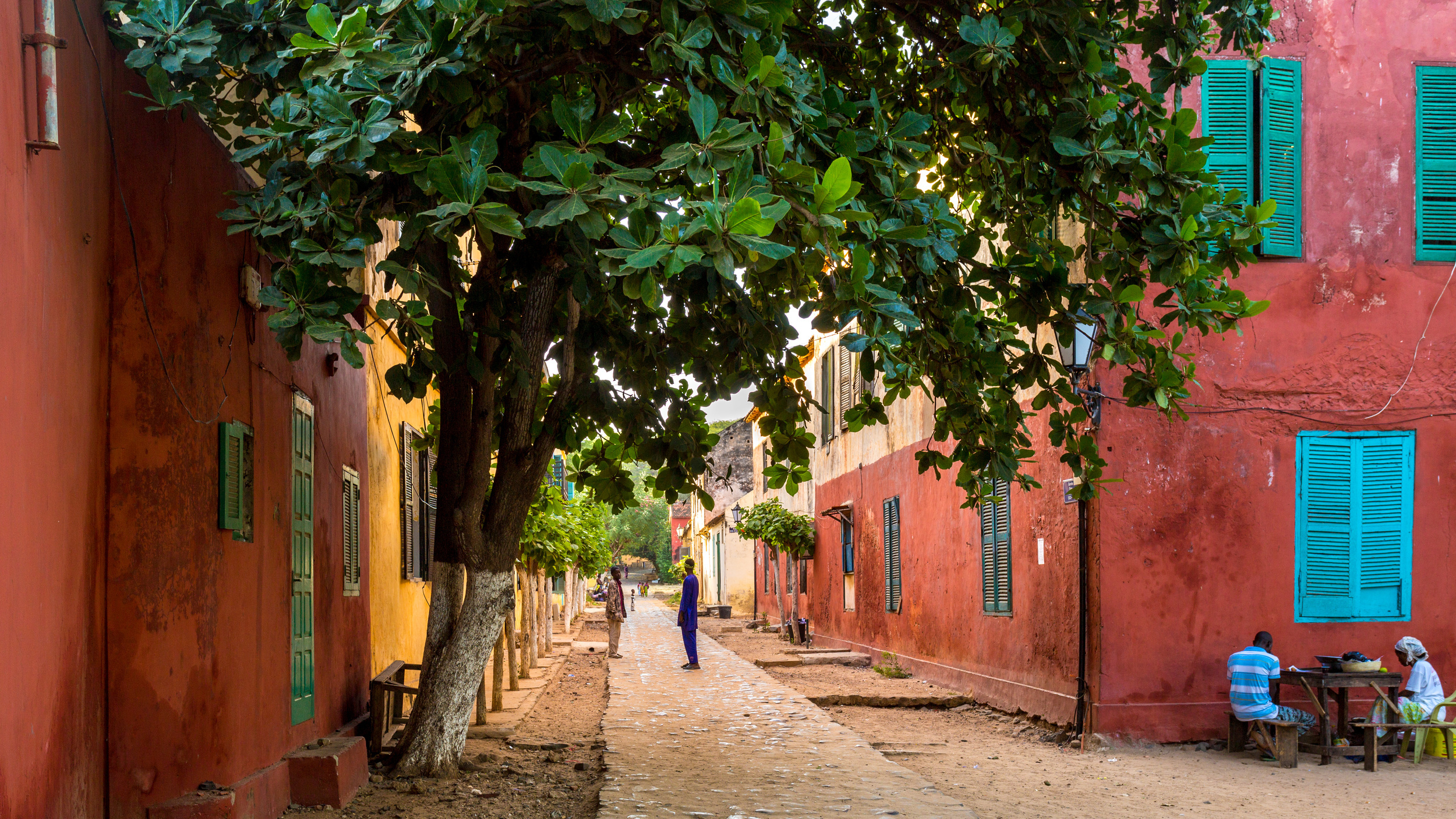
Senegal has six recognized indigenous languages, the most well-known and commonly spoken is Wolof. However, French is still the official language of the country despite Wolof being more widely used and understood.
You may also like: Add these 20 unusual U.S. destinations to your travel bucket list
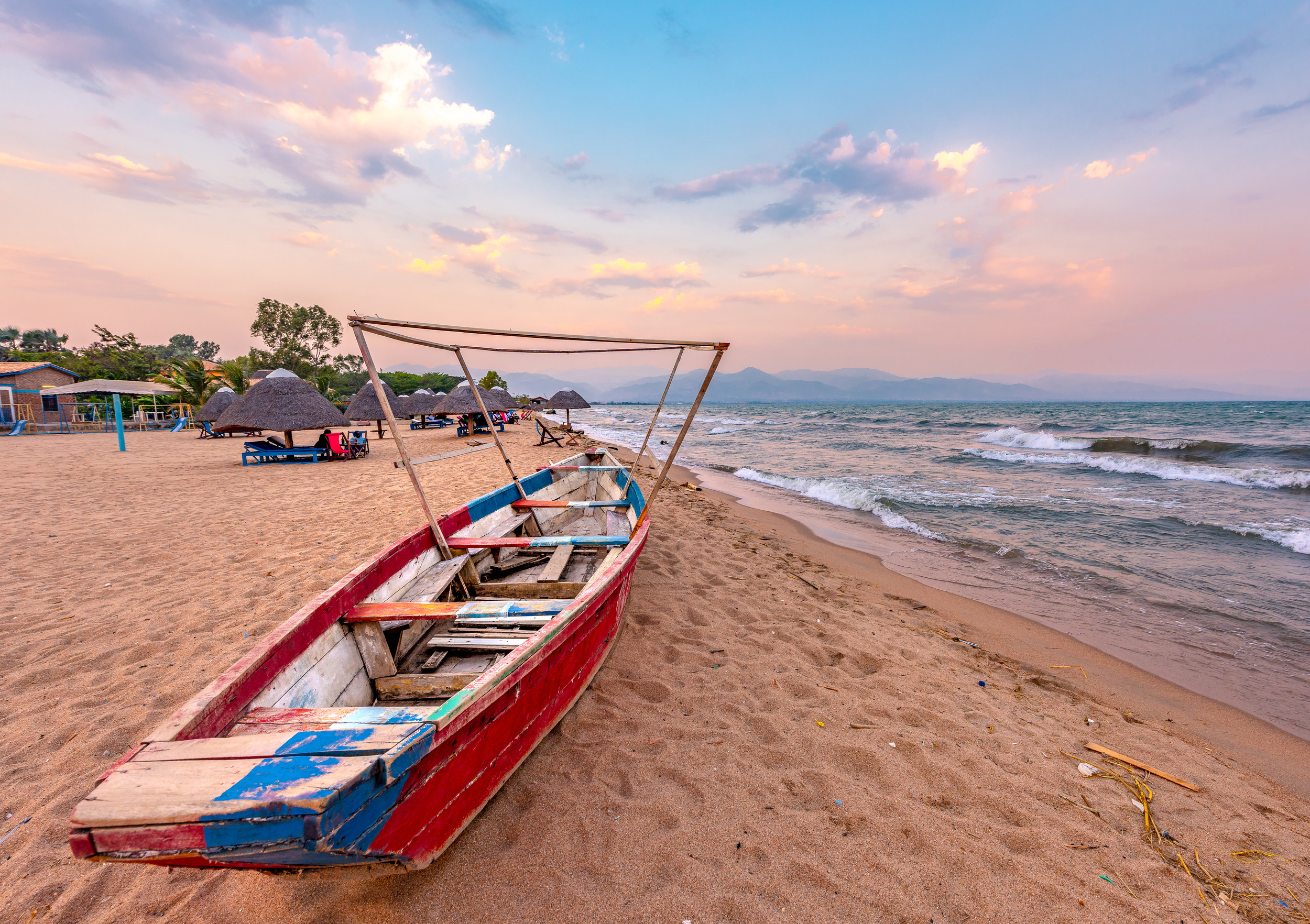
Yet another multilingual former French colony, Burundi has three official languages. In addition to French, Kirundi, and Swahili are recognized by the government. In 2014, English also gained status in the country.

Republic of the Congo
Also known as the Congo or Congo-Brazzaville, it is not to be confused with its neighbor, the Democratic Republic of the Congo. Formerly known as the French Congo, due to colonization, the language is still the official one of use to this day. The local Bantu language, Kituba, Lingala, and numerous other indigenous languages are also widely spoken.
You may also like: 20 cookies you probably never tried before (but should!)

Democratic Republic of the Congo (DRC)
The DRC has four main languages: Kikongo (Kituba), Lingala, Swahili, and Tshiluba. However, as a former Belgian colony, French is still widely used and understood.
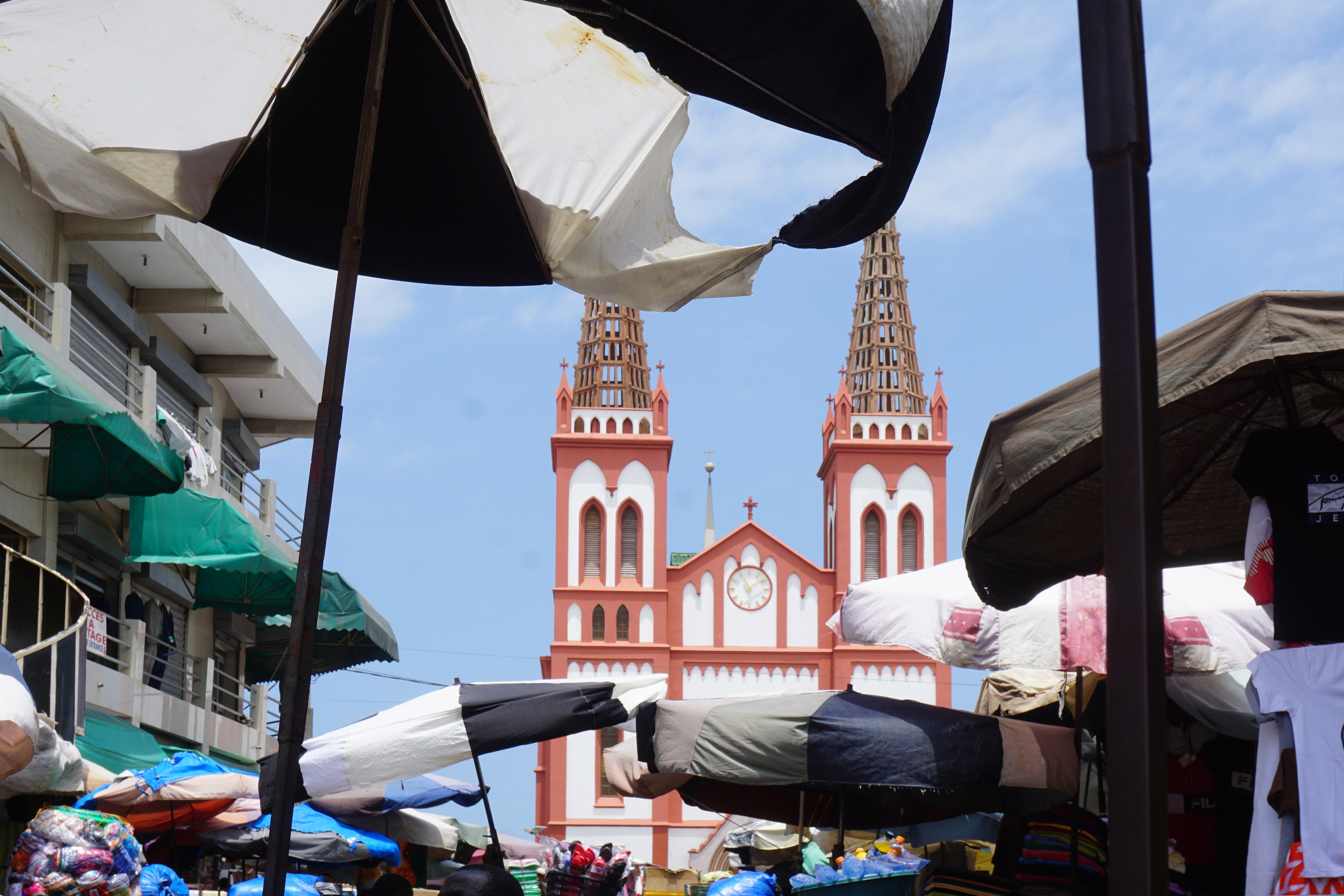
Togo is a very multilingual country, and in addition to the official language, French has over 40 in use throughout the country. Many signs will be in French, and most locals speak some.
You may also like: 25 gameday snacks you can make in a slow cooker

Yet another former French colony, visitors to Mali will find the language very useful in most interactions. Additionally, the country is home to more than 80 other local languages.

The British and French fought over Canada, with the former finally winning out, but the Francophone portion of the population remained influential. So much so that the country has two official languages: English and French, with over 70 indigenous languages in existence. And the province of Québec only has French as the official language (and frequently threatens to secede from Canada). Its neighbor, New Brunswick, is the only officially bilingual province.
You may also like: 20 essential organizing tips for living in small spaces
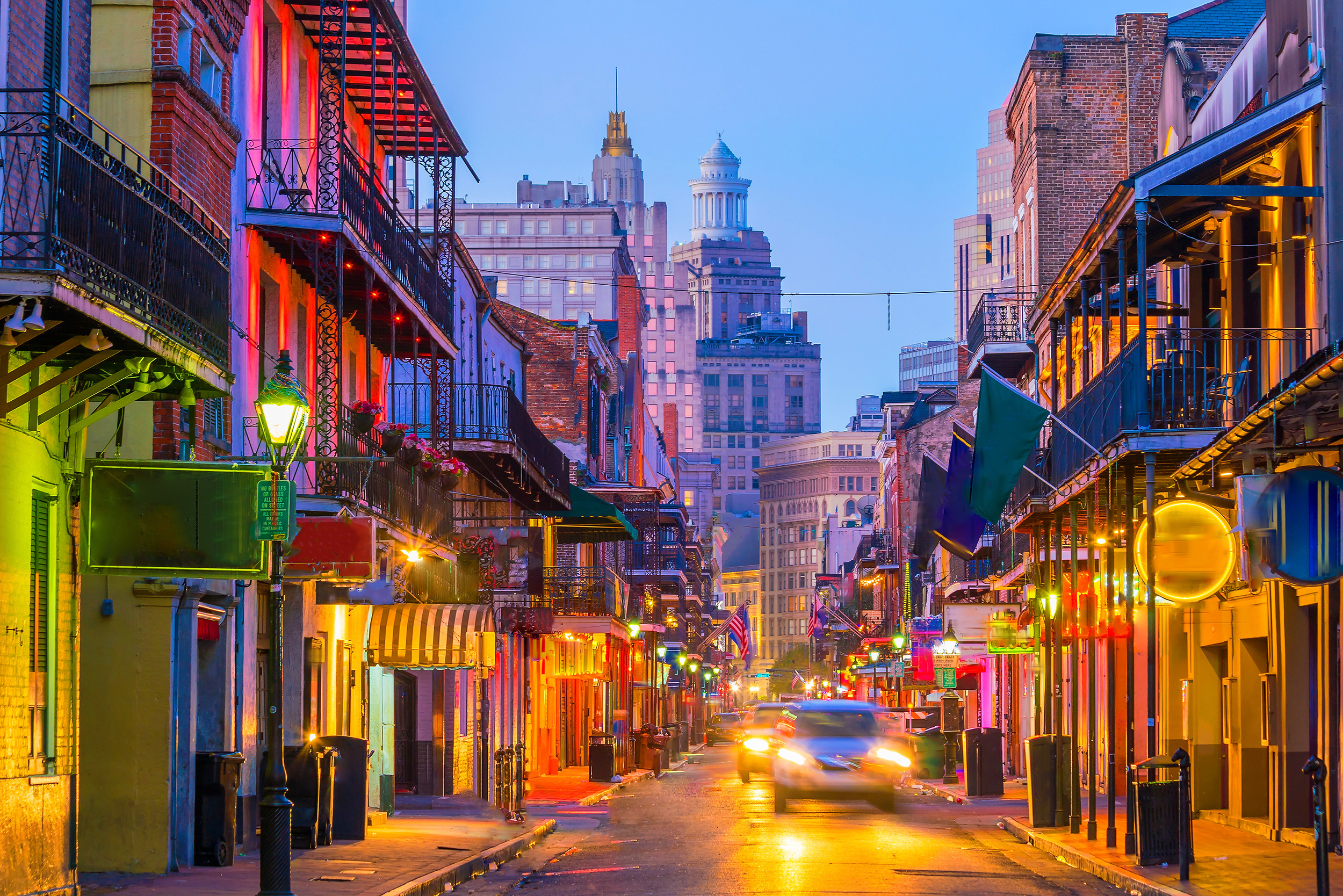
When the U.S. purchased Louisiana territory from the French in 1803, it probably wasn’t considered how long the language would stick around. In the 1960s, efforts were made to revive the language in the state after decades of suppression and Americanization. Now, French is spoken by an estimated 100,000 to 200,000 residents, ranging from traditional and Cajun (Louisiana) French.
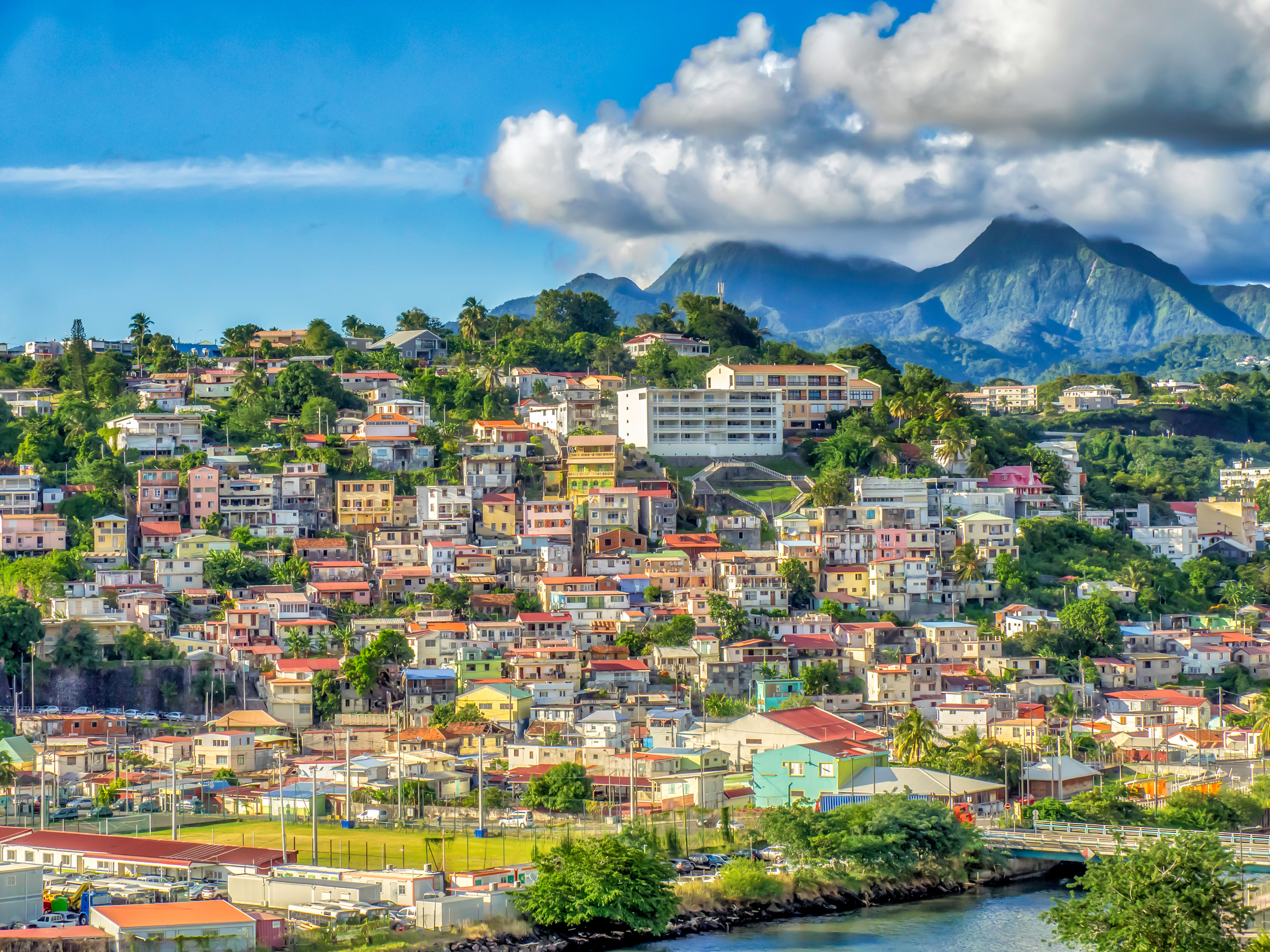
The Spanish colonized this Caribbean island before the Brits and French arrived. Then in 1763, France took over, and in 1943, it became semi-autonomous before gaining its current status as an Overseas Department in 1946. French is the official language, and visitors will find it helpful to know basic phrases, but Martinique Creole is unofficially the local language of communication.
You may also like: 15 quick and easy gameday appetizers
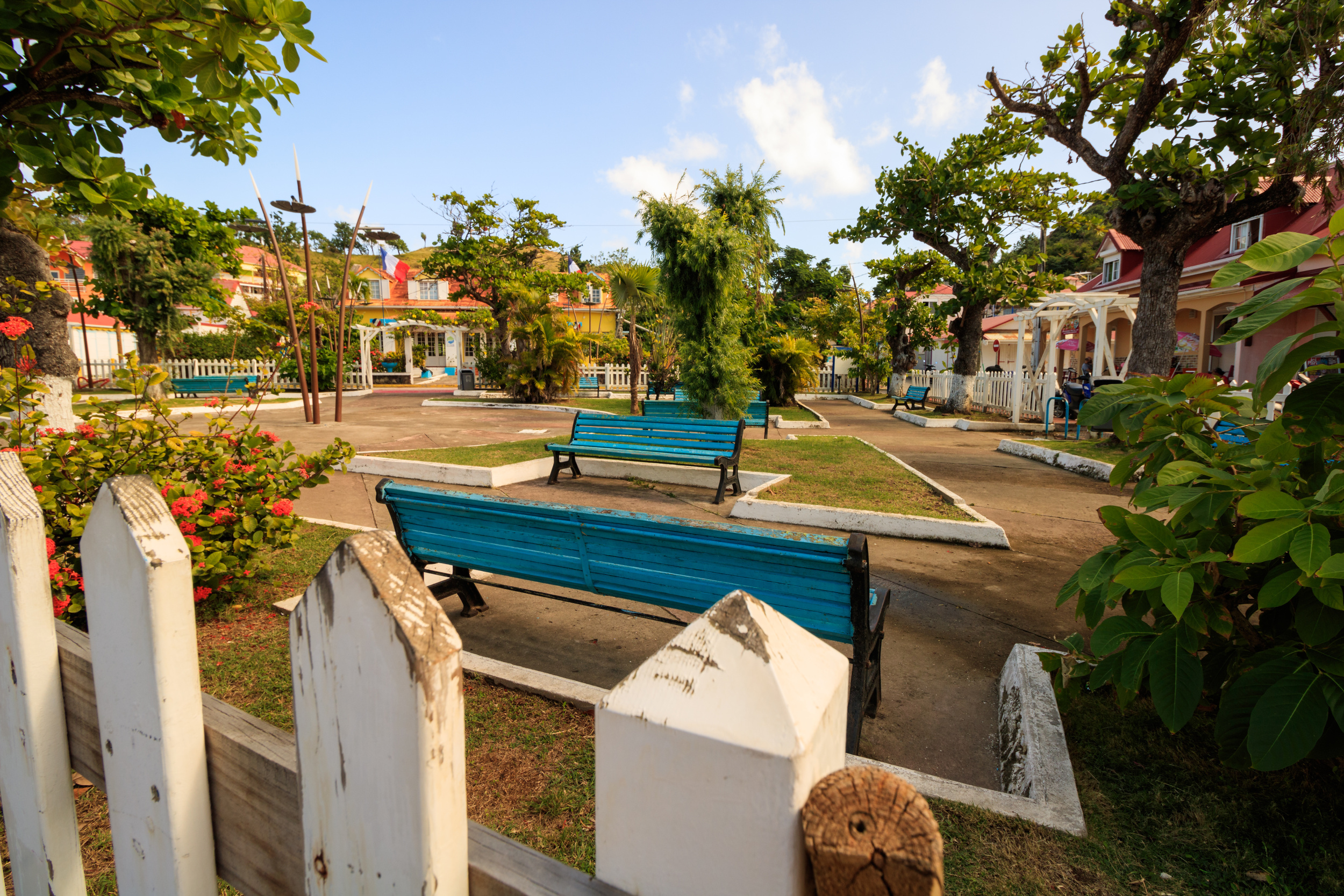
Another current French Overseas Department first colonized by the Spanish, Guadalupe has French as its official language, but like Martinique, Creole is widely used by locals.
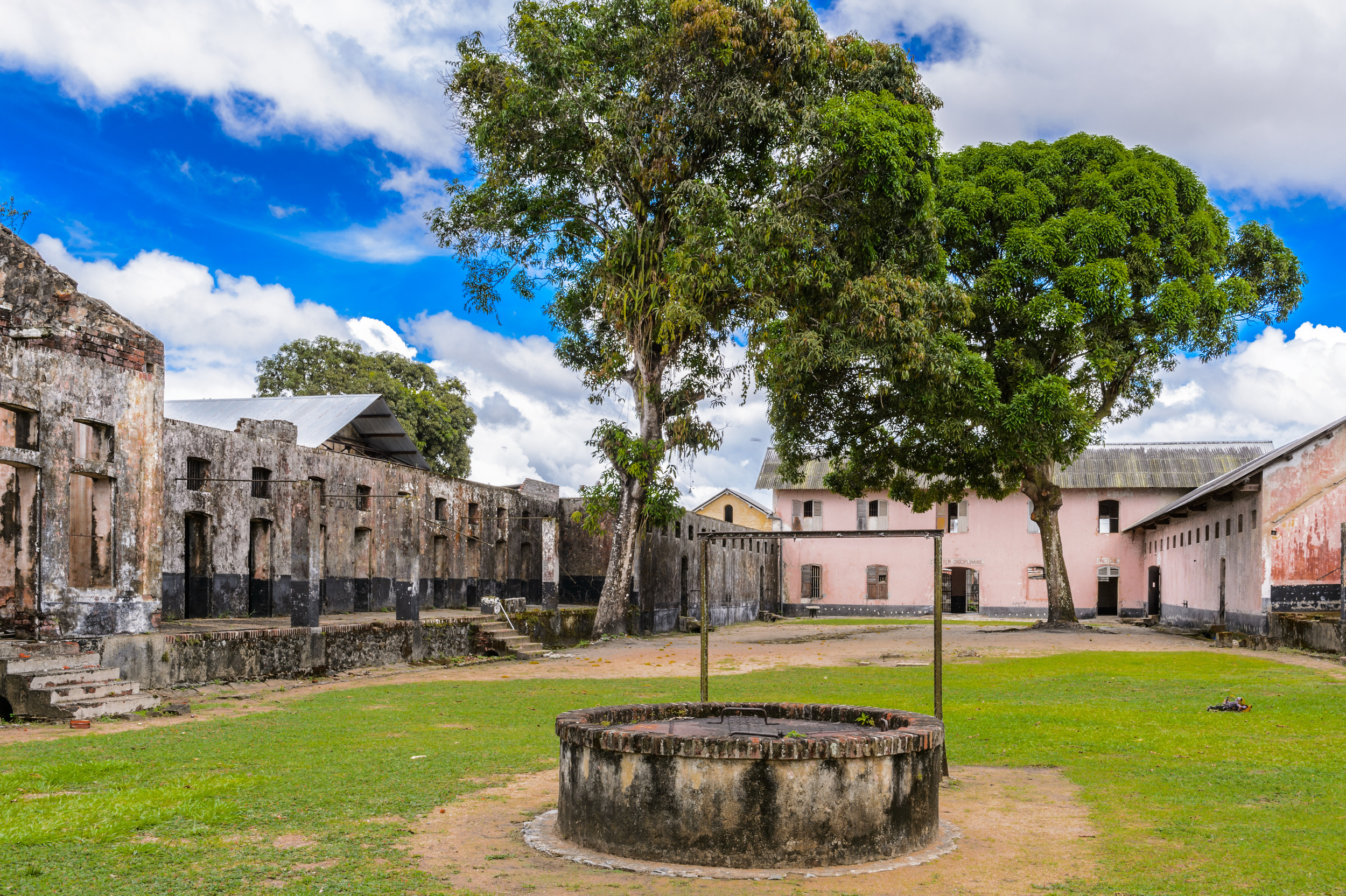
French Guiana
This small section of the South American continent, located between far northeastern Brazil and Suriname and Guyana, is a former colony that housed a penal colony of France. Today, it is a French Overseas Department. Thus, French is the official language, but Creole is the language of use by many residents.
You may also like: 22 healthy snacks you can make on gameday
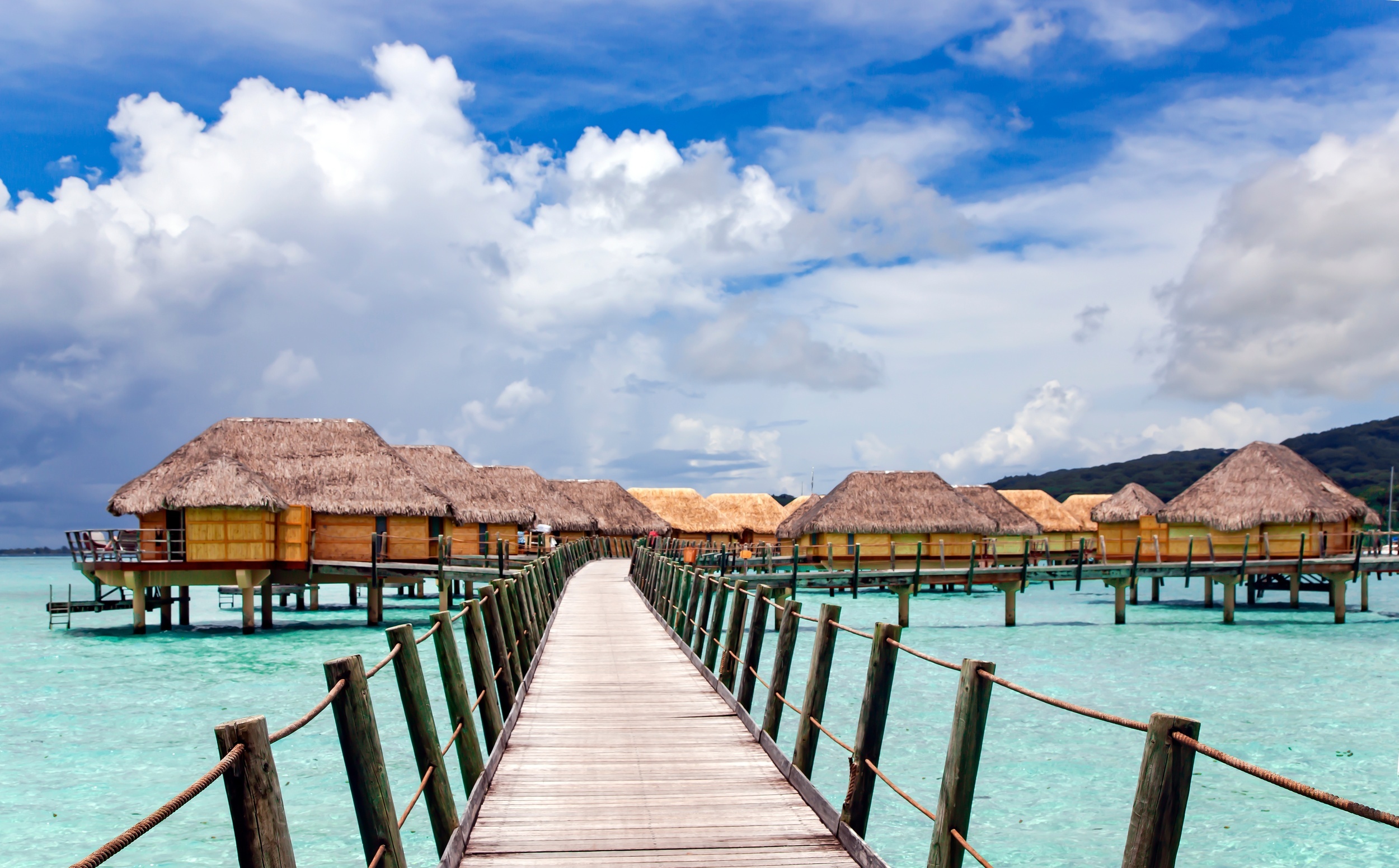
French Polynesia
Colonized by the French, the islands received the name “French Polynesia” after being designated a French Overseas Territory in the '50s. Then, in 1977, the country received autonomy and is now considered an overseas country of the French Republic, with French as the official language.

New Caledonia
The British initially colonized these islands in the South Pacific before the French took over in 1853. Recent years have brought referendums for independence, but a slim majority of the population has voted in favor of remaining part of France. French remains the official language of the territory.
You may also like: 20 essential tips for your best hair ever

This Pacific country is very multilingual, with French, English, and Bislama all considered official languages. However, it doesn’t stop there, as over 100 languages are spoken on the island. After centuries of colonization, independence was finally declared in 1980.
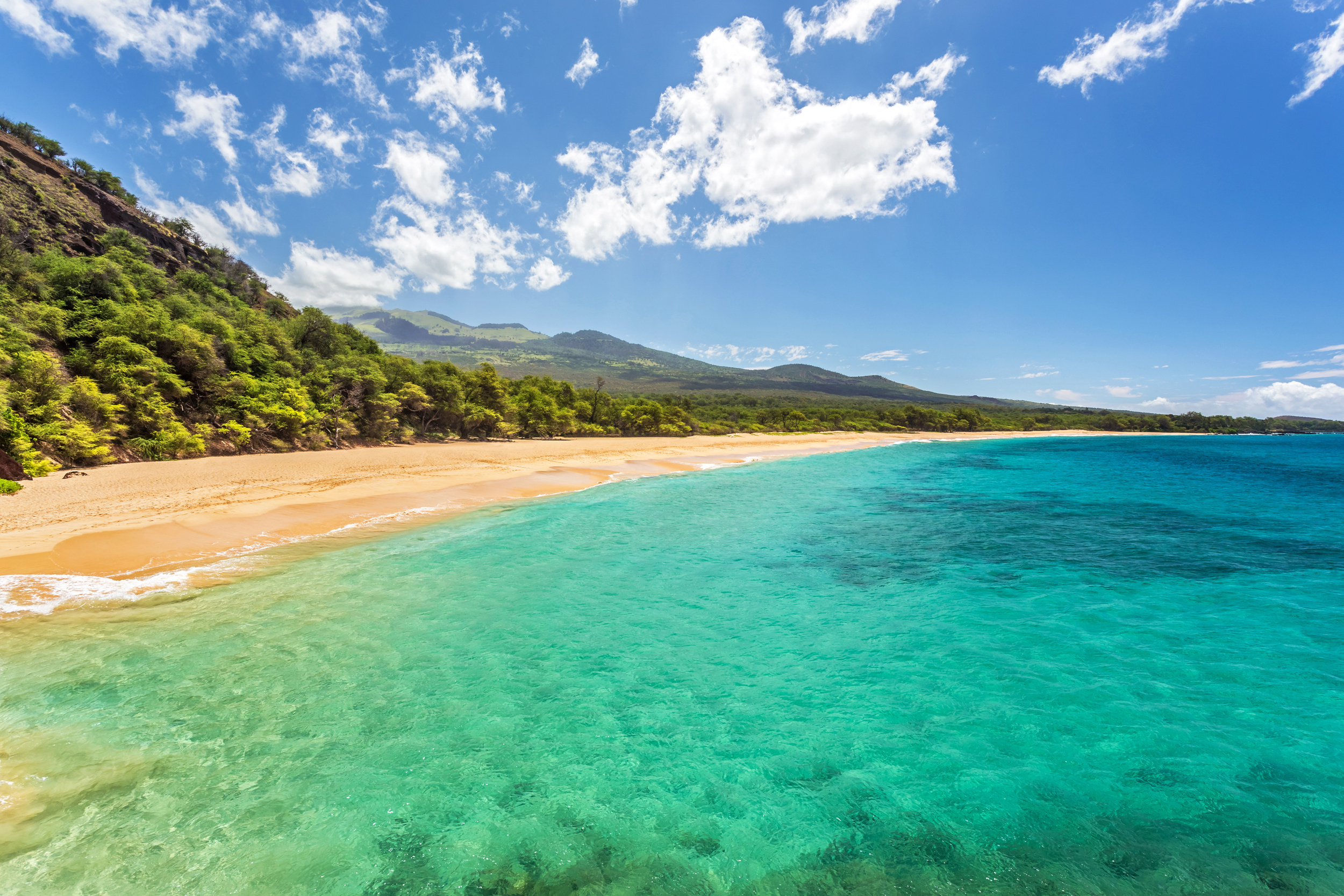
Wallis & Futuna
Made up of the Wallis, Futuna, and Alofi islands, all three were French protectorates and colonies until 1961. Then, the islands became a French Overseas Territory until 2003, when they received status as an Overseas Collectivity. French has been the official language throughout all the status changes.
Did you enjoy this slideshow? Follow us on MSN to see more of our exclusive lifestyle content.
More for You
K-Pop Singer-Songwriter Park Boram Found Dead at 30
Ketanji Brown Jackson, Supreme Court Justice, Is Moving on From Her $2.5 Million Colonial-Style Home
J.K. Rowling says 'Harry Potter' stars who've criticized her anti-trans views 'can save their apologies'
Pacific castaways’ ‘HELP’ sign sparks US rescue mission – and an unexpected family reunion
Harvard psychologist shares 5 toxic things 'highly narcissistic' people always do in relationships
Gladiator 2 footage stuns CinemaCon with ‘ripped’ Paul Mescal and ‘sinister’ Joseph Quinn
Guest-list style at the White House State Dinner
Biden administration cancels another $7.4 billion in student loans
6 Foods You Should Never Feed Your Cat, According to Veterinarians
Can you eat too many chia seeds? A dietitian explains
Women Are Quiet Quitting Their Marriages
Kiefer Sutherland Says No Bullying On Set Of ‘Stand By Me'
Ron DeSantis takes on Target, and Walmart, over retail theft
7 Things You Should Know If You Deposit More Than $10K Into Your Checking Account
16 Compliments You Didn’t Realize Are Actually Pretty Insulting
The best way to answer 'tell me about yourself,' says CEO who's done over 30,000 interviews
False claim Dwayne 'The Rock' Johnson said he regrets voting for Joe Biden in 2020 | Fact check
European Union's Only Nuclear-Powered Navy Is Getting Ready for War
I moved from California to Tennessee for my husband's job. We can finally save money, but it's been a major culture shock.
Air Force reports on targets destroyed last night
Protect Your Trip »
What to do if your flight is canceled.
Follow these steps in the event your flight is canceled.
Flight Canceled or Delayed? What to Do

Getty Images
Key Takeaways
- If your flight has been canceled, you are entitled to a full cash refund per federal law.
- Using the airline's app or calling an international airline number is often the quickest way to get help.
- The DOT Cancellation and Delay Dashboard shows what each major domestic airline will or will not provide in the event of a cancellation or delay.
If your flight has been canceled, read on for step-by-step instructions on how to rearrange your travel plans and/or claim compensation.
What to do if your flight is canceled
1. get on the airline's app – or make an international call.
First, pull up the airline's app on your phone. Most airline apps allow you to easily rebook your flight for free, provided you can supply your six-character reservation code. Getting in line to speak with an agent and calling the airline while you wait is also a good idea (albeit slower than using an app), and social media messaging, texting or WhatsApp may prove helpful. "During times of mass travel disruption, you should try all different avenues for getting help," says Nick Ewen, director of content at The Points Guy.
Ewen also recommends a lesser-known tactic: calling the airline's international numbers. Airlines have offices in Canada, Mexico, the U.K. and more. "While it can be costly, you can often get through to an agent more quickly," Ewen says.
Note that, depending on why your flight was canceled, finding seats on a new flight may alter your travel plans considerably.
2. Book a hotel
Next, determine if you need overnight accommodations. "If you were originally booked on the last flight of the night and there are no other options, grab a hotel room near the airport before they're all taken," Ewen advises.
3. Ask for a refund
If the airline cancels your flight or it's "significantly delayed" (a term currently defined on a case-by-case basis) and you're forced to change your travel plans, the Department of Transportation requires airlines to provide a full refund. Unfortunately, getting a refund can be a lengthy and frustrating process. Most airlines will instead offer a credit for future travel, but be wary of these, since they often come with limitations such as blackout and expiration dates.
When you're able to get a refund, note that it covers the total cost of airfare only and does not include other expenses associated with your trip.
If you believe you're entitled to a refund and the airline denies it to you, you can and should file a complaint with the DOT .
4. Reference the DOT Cancellation and Delay Dashboard
While you're entitled to a full refund, other flight cancellation policies may vary by airline. Go to the DOT's Cancellation and Delay Dashboard to see what each major airline will and will not offer in the event of a controllable cancellation.

Tips on Trips and Expert Picks
Travel tips, vacation ideas and more to make your next vacation stellar.
What to do if your flight is delayed
In the event your flight is delayed, airlines are not legally obligated to give you a refund unless the DOT determines the delay to be "significant." But here's what you can do:
Research other flights
Investigate what other flights on that airline are headed to your destination and ask an agent if they can get you on one of them (without charging change fees). Also be sure to look into what's available on other airlines: If your original airline doesn't have any flights available on your departure date, an agent may be able to book you on a flight with a different carrier at no additional cost to you. Note, however, that airlines are not legally required to do this.
Inquire about other compensation
If you've been stranded at the airport for several hours, check in with an agent and reference the Commitments for Controllable Delays section on the DOT's Cancellation and Delay Dashboard – regardless of whether you're able to get on another flight. Some airlines may provide amenities such as vouchers for meals or overnight accommodations.
Frequently Asked Questions
"The main causes for flight disruptions are bad weather, understaffed air traffic control, and factors within the airline’s control," says Katy Nastro, a spokesperson at Going.com, formerly Scott's Cheap Flights. She explains the following:
- Weather: This is outside of the airline's control and is the single biggest reason for why we see flight disruptions. We saw this play out over the winter holidays in 2022, and even to some extent during the 2023 holiday season. Even if the weather is accurately predicted, it cannot be controlled, which means at times flight disruptions are unavoidable.
- Understaffed air traffic control: The U.S. air travel industry has made strides in pilot hiring year over year, but when it comes to air traffic control, we are still down roughly 1,000 fewer air traffic controllers from a decade ago. New York metro area airports specifically have felt the brunt of this deficit, so much so that airlines were permitted to reduce schedules without penalty from the summer until the end of Q4 in 2023. At its lowest, the decrease in flights in the New York metro area resulted in about 11% fewer flights per day. With less trained staff, current air traffic controllers are stretched to the limit, and schedule reductions only temporarily solve this problem. Even with aggressive hiring efforts, training takes time and will not be a quick fix.
It's almost impossible to avoid canceled or delayed flights these days. But there are a few things you can do when booking flights to lessen your chances for travel disruptions.
Keep tabs on your aircraft: On your departure date, check your flight information before heading to the airport. You can keep a watchful eye on the flight's status – including the aircraft scheduled to operate your flight – using the airline's app or a third-party app such as FlightAware Flight Tracker (which also offers a website ), FlightRadar24 or TripIt Pro.
"As an example, if you're flying from Orlando to New York, and your plane is flying in from Chicago, the initial flight from Chicago to Orlando might be delayed (or canceled) before yours is," Ewen explains. "Airlines will try to find replacement aircraft in that case, but if you can identify a potential cancellation before it officially happens, you may be able to get rebooked ahead of the other 100-plus passengers on your flight."
Consider an alternate airport: When booking your flight, you may consider flying out of a different airport than the one you typically depart from. For example, a small regional airport with limited routes may mean less travel delays and hassle overall – or it may be worth driving further to another international airport for a nonstop flight to your destination rather than opting for a connecting flight close to home.
Fly in the morning: While flight disruptions are unpredictable, historically fewer cancellations and delays occur in the morning.
Avoid weekend travel: Fly on off-peak days like Tuesday or Wednesday. You'll often find cheaper flights on these days, too.
Opt for longer layovers: If you need to take more than one flight to reach your destination, book a flight with a longer layover to provide enough time to make your connecting flight. Keep in mind that at some airports you may need to go through security or customs for your connection. For longer journeys, you can reduce the risk of missing connecting flights by planning a city stopover. For example, Icelandair offers Iceland stopovers for no additional airfare.
Consider a credit card with travel protections: You don't need to be a frequent traveler to take advantage of credit card travel protections and perks. Here are a couple options to consider:
- Chase Sapphire Preferred : This travel credit card ($95 annually) provides coverage for delays and cancellations when used to book flights. It also provides other travel protections such as delayed baggage coverage. "Even someone who travels just once or twice a year can still get phenomenal value from this card," Ewen says.
- American Express Platinum Card : This card ($695 annually) offers travel insurance that reimburses some nonrefundable expenses like hotel accommodations, meals and other essentials as long as the trip was purchased using the card.
When choosing a travel credit card, you should also pay attention to other benefits. Even the most basic airline credit cards can offer travel perks like discounts on in-flight purchases and waived baggage fees, while premium travel credit cards (which require a higher annual fee) can include access to an airport lounge with food, drinks and Wi-Fi. Some also provide a concierge service to rebook flights or built-in trip insurance to cover unforeseen expenses.
Purchase travel insurance: If your credit card doesn't include travel protections, consider purchasing insurance with flight coverages – even a cheap travel policy can help protect your investment. Covered reasons include a travel carrier delay and loss or theft of travel documents, among other scenarios. If you're interested in purchasing a policy, you can browse the best travel insurance companies here .
Talk to a travel advisor: "Booking directly with your travel advisor provides more leverage and support if something goes wrong," explains Jessica Parker, founder of Trip Whisperer . "We can advocate for a better outcome should there be cancellations or hiccups in the itinerary."
Charlotte French, owner of Cavatica Luxury Travel , agrees, sharing this recent example: "My clients were booked on a nonstop United Flight from Tokyo (HND) to EWR (Newark) in business class, when it was canceled (due to technical issues). The clients were waiting in line to find other options for their return flight home; however, these were very limited. In parallel, I was able to speak to the United Airlines corporate desk (as a travel advisor) and was able to secure them in business class on a flight out of Tokyo the same day."
Avoid checking luggage: Travelers who only travel with a carry-on bag and/or personal item (such as a backpack or purse) that meet carry-on size restrictions will have the most flexibility in rebooking – and will also avoid the chance of lost luggage, another common issue. Some carriers will try to move checked luggage to a later flight for you and will make every effort to keep you and your belongings together. However, when airlines don't have interline agreements with other carriers, you'll have to allow enough time to retrieve and recheck your own luggage.
The number of canceled flights recently fell to its lowest rate in at least a decade — a welcome change for air travelers, especially following COVID-19-era travel disruptions.
Still, flight cancellations will always be inevitable, especially during the busy summer travel season. Summer 2024 is shaping up to be especially busy. "It was the busiest March on record for air travel according to the TSA," explains Nastro. "It also had the tenth busiest day on record, which is pretty significant since it is not a 'peak period' and is generally considered off-season in the Northern Hemisphere. If this trend continues, we are likely in for the busiest summer on record when it comes to air travel."
You might also be interested in:
- The Top Luggage Trackers
- Is a Travel Agent Worth It? The Pros and Cons
- Can I Use My Own Airplane Seatbelt Extender?
- How to Get Airport Wheelchair Assistance
- The Top Cheap Weekend Getaways
Top All-Inclusive Resorts in the U.S.

Tags: Travel , Travel Tips
World's Best Places To Visit
- # 1 South Island, New Zealand
- # 4 Bora Bora
If you make a purchase from our site, we may earn a commission. This does not affect the quality or independence of our editorial content.
You May Also Like
The best kauai boat tours.
Lyn Mettler April 11, 2024

The Top-Rated NYC Food Tours
Ann Henson April 11, 2024

The Best Things to Do in Maine
Mariya Greeley and Nicola Wood April 10, 2024

The Best Pearl Harbor Tours
John Rodwan and Amanda Norcross April 9, 2024

The Best Pigeon Forge Dinner Shows
Korrin Bishop April 9, 2024

Carry-on Luggage Sizes by Airline
Amanda Norcross April 8, 2024

The Best Charleston Tours
John Rodwan April 4, 2024

The Best Napa Valley Wine Tours
Amanda Norcross April 4, 2024

The 10 Best Denver Tours
Lyn Mettler April 4, 2024

Top Memorial Day Weekend Getaways
Nicola Wood April 3, 2024


Sleva 20 % na jazykové kurzy od ” href=”https://www.onlinejazyky.cz/?start&a_box=p57bhda7&a_cam=11&a_cha=hlavicka” target=”_blank” rel=”nofollow noopener”>Online jazyků & Easy Linga . Použijte slevový kód: SPEAKANDTRAVEL
Rychlý přehled
50x anglické fráze při cestování.
- Aktualizováno 22 září, 2020
- Autor: Dušan Souček
Obsah článku
Projděte si tyto nejpoužívanější anglické fráze při cestování a získejte sebevědomí na cestách.
Připravili jsme pro vás výběr těch nejdůležitějších frází, které budete potřebovat, nebo můžete slyšet.
Bude dobré těmto větám rozumět.
Přejeme vám hodně zážitků na cestách. Nejen těch jazykových. ????
✅ Doporučujeme vyzkoušet skvělý online kurz 1.000 anglických slovíček. Je to super.
ukázková lekce zdarma >
Většinou to začíná na letišti
Obsluha je zvyklá na cokoli, tak se vždy nakonec nějak domluvíme. Proto jsme vybrali spíše ty fráze, které by vás mohli zaskočit a nebudete vědět jak na ně reagovat.
1. May I have your ticket and passport, please? – Dejte mi prosím vaši letenku a pas.
2. How many pieces of luggage do you have? – Kolik kusů zavazadel máte? Pokec kolem baťožiny je většinou vždy nejnáročnější.
3. Your baggage is too heavy. You have to pay excess baggage fee. – Vaše zavazadlo je příliš těžké. Musíte zaplatit příplatek.
4. Have you got any hand luggage? – Máte nějaké příruční zavazadlo?
5. It has to be weighe, too. – To musí také na váhu.
6. I want to take this backpack to the cabin as hand luggage. – Ten batoh si chci vzít s sebou do letadla jako příruční zavazadlo.
7. There’s five kilo overweight. – Máte pět kilo nadváhu.
8. Here’s your suitcase tag and baggage claim check. – Tady máte visačku a lístek na zavazadla.
9. Do you have any liquids or sharp objects in your hand baggage? – Máte ve vašem příručním zavazadle nějaké tekutiny nebo ostré předměty?
10. Could you take off your belt/shoes/coat, please? – Můžete si prosím sundat pásek/boty/kabát?
11. Put your laptop and mobile phone into the tray, please. – Do přihrádky dejte notebook a mobilní telefon, prosím.
12. Could you put any metallic objects into the tray, please? – Můžete dát veškeré kovové předměty do přepravky, prosím?
13. Could I see your hand baggage, please? – Mohu prosím vidět vaše příruční zavazadlo?
14. Please empty your pockets. – Prosím vyprázdněte vaše kapsy.
15. I’m afraid you can’t take that through. – Obávám se, že si tohle nemůžete vzít sebou.
Bezva, tak na letišti bychom to měli za sebou. Jde se do letadla. ✈️
Anglické fráze v letadle
Hned na úvod několik základních frází. ????
16. Are drinks included? – Je pití v ceně?
17. Can I have another one? – Mohu si dát ještě jedno?
18. Please, return your seat to the upright position. – Prosím, vraťte sedadlo do svislé polohy
19. The captain has turned off the Fasten Seatbelt sign. – Kapitán vypnul znamení. Připoutejte se.
20. Ladies and gentlemen, we will land in five minutes. – Dámy a pánové, během 5 minut budeme přistávat.
21. Where can I collect my baggage? – Kde si mohu vyzvednout svá zavazadla?
22. I didn’t get my luggage. – Nedostal jsem své zavazadlo.
23. I’m afraid you’ve lost my luggage. – Obávám se, že moje zavazadlo se ztratilo.
24. Could you please find out where they are? – Můžete mi prosím zjistit kde jsou?
25. Please call me at this number and let me know. – Dejte mi prosím vědět na toto číslo.
26. Do you have anything to declare? – Máte něco k proclení?
27. Where can I get a trolley? – Kde seženu vozík?
28. What is the purpose of your visit? – Jaký je důvod vaší návštěvy?
29. Do you know where I can get a taxi? – Nevíte, kde bych mohl sehnat taxíka?
30. Could we stop at a cashpoint? – Můžete zastavit u bankomatu?
Jděte na anglická slovíčka chytře ???????? 9 tipů, jak na anglická slovíčka 100 nejpoužívanějších anglických slovíček a frází Angličtina pro samouky (tipy a triky) 50x anglické fráze v restauraci 23x anglické obchodní fráze 50x anglické fráze při nakupování oblečení 50x anglické fráze při flirtování
Anglické fráze při cestování (nejen v letadle)
Letadlo v pořádku přistálo a teď se potřebujeme dopravit ještě kousek vlakem, metrem nebo busem, nebo taxárem do hotelu. ????
31. Where can I get the tickets? – Kde mohu dostat jízdenky?
32. Is this the right platform for London? – Je tohle správné nástupiště pro vlak do Londýna?
33. Is it a through train? – Je to přímý vlak?
34. Are there a left luggage or lockers around here? – Je tu někde úschovna zavazadel, nebo nějaké uzamykatelné skříňky?
35. Where are the cars with seat reservations? – Kde jsou vozy s místenkovými rezervacemi?
36. Where is the dining car? – kde je jídelní vůz?
37. How long does the journey také? – Jak dlouho ta cesta trvá?
38. I’m getting off as well. – Já také vystupuji.
39. Is there a bus stop near here? – Je zde někde zastávka autobusu?
40. Please switch the meter on. – Prosím zapněte si taxametr.
Věděli jste, že metro se řekne několika různými způsoby. Třeba underground, subway, ale když řekneme “metro” tak vám budou rozumnět. Jenom v Londýně mají Tube!
Další anglické fráze při cestování
41. Excuse me, how do I get to an underground station? Promiňte, jak se dostanu do stanice metra?
42. Take the Picadilly Line. – Jeďte linkou Picadilly.
43. I’d like a seven day travelcard, please. – Chtěl bych sedmidenní cestovní průkaz, prosím.
44. What time does the ferry arrive in …? V kolik hodin připlouvá trajekt do …?
45. How soon before the departure time do we have to arrive? – Jak dlouho před vyplutím tady musíme být?
46. How do we get to the ferry port? – Jak se dostaneme do přístavu trajektů?
47. What is the crossing time? – Jak dlouho potrvá plavba?
48. Is there a bar/ a restaurant on board? – Je zde bar / restaurace na palubě?
49. How do I get to the hospital? – Jak se dostanu do nemocnice?
50. Can you tell me where the post office is? – Můžete mi říct, kde je pošta?
Angličtina spojuje lidi. To mi řekla jedna němka v Londýně a měla sakra pravdu. S angličtinou se při cestování neztratíte. Vyřešíte vše potřebné, ale hlavně poznáte nové lidi a zažijete nová dobrodružství. A to je to nejcennější. Mrkněte také jak na jednoduchý cestovatelský small talk .
V některých zemích se anglicky nedomluvíte. Projděte si náš seznam zajímavých míst, kde s angličtinou nepochodíte .
Podívejte se na anglická dobrodružství našich cestovatelů
Dušan Souček

Stáhněte si zdarma e-book (krátké PDF) kde se dozvíte jednoduché triky na angličtinu (žádné revoluční metody 😂).
- Například kde vzít čas na studia.
- Díky jaké aplikaci dokážu každý den studovat (už pomalu půl roku)
- A dalších, celkem 12 tipů
Na e-mail vám budeme posílat pouze informace ke studování jazyků a cestování. Spam nemáme rádi a neděláme jej. Samozřejmě se můžete kdykoli odhlásit a zastavit posílání e-mailů. Vaše osobní údaje (tedy e-mail) budu střežit jako oko v hlavě, přesně tak, jak zákon káže zde .
Doporučujeme:

Blabu – geniální nástroj na rozmluvení v angličtině
Všichni to víme… Nejrychleji se anglicky naučíme, když budeme mluvit!

Rozmluvte se s italki
Cvičení v učebnici a články na internetu zvládáte levou zadní,

Zážitky z Porta
Pokud jde o učení, škola mě nikdy moc nebrala. Výjimkou
Napsat komentář Zrušit odpověď na komentář
Vaše e-mailová adresa nebude zveřejněna. Vyžadované informace jsou označeny *
Webová stránka

Zamilujte se do Angličtiny od Broni Sobotky
Zadejte e-mail, kam vám pošlu e-book.
- E-mailová adresa
Běžně: 399 Kč
Dnes: 199 Kč (ušetříte 200 Kč)
E-shop ProgresGuru slaví 10. narozeniny a všechny audioknihy teď pořídíte za 199 Kč. Více zde >>
E-book: 10 + 2 hacků jak na ANGLIČTINU pro samouky

Middle East Crisis C.I.A. Director Is Heading to Cairo for New Truce Talks
- Share full article
- A destroyed house in Rafah in southern Gaza. Reuters
- Mourning relatives killed during strikes in Rafah. Fatima Shbair/Associated Press
- Blocking a road in Tel Aviv to call for the return of hostages taken during the Oct. 7 attack led by Hamas. Jack Guez/Agence France-Presse — Getty Images
- A camp for displaced people in Rafah. Mohammed Abed/Agence France-Presse — Getty Images
- A house destroyed in a strike in Deir al Balah, in central Gaza. Mohammed Saber/EPA, via Shutterstock
- Aid dropped into northern Gaza. Leo Correa/Associated Press
- Palestinians searching for survivors under the rubble of a house after an Israeli airstrike in Rafah. Haitham Imad/EPA, via Shutterstock
- Israeli soldiers near the Israel-Gaza border. Hannah Mckay/Reuters
- A poster on Wednesday in Tehran of Gen. Mohammad Reza Zahedi, who was killed in an Israeli strike in Damascus, Syria. Arash Khamooshi for The New York Times
The C.I.A. director is heading to Cairo for new hostage talks.
The C.I.A. director, William J. Burns, is expected to travel to Cairo this weekend for further talks on releasing Israeli hostages being held in Gaza, according to two people briefed on the plans.
American officials believe negotiating a pause in fighting between Israel and Hamas and the exchange of Israeli hostages held in Gaza for Palestinian prisoners held in Israel is the only way to put a temporary cease-fire into effect and increase the flow of humanitarian aid into the enclave.
Mr. Burns, a key figure in the continuing negotiations, is expected to be joined by David Barnea, the head of Mossad, Israel’s spy agency, and negotiators from Egypt and Qatar. Neither the Americans nor the Israelis speak directly to Hamas. Instead, their proposals are relayed through Egyptian and Qatari officials, who speak to members of Hamas.
Mr. Burns’s travel plans were earlier reported by The Wall Street Journal on Thursday.
The talks between Mr. Burns, Mr. Barnea and the other officials are set to begin on Sunday, according to one of the people briefed on the talks.
American officials said U.S. negotiators intend to deliver the message that the United States wants Israel to work toward a deal and not let small requests from Hamas or details of proposals derail the larger goal of beginning a phased approach of freeing the hostages.
The cease-fire talks have been stuck for weeks. This round will be taking place after President Biden spoke to Prime Minister Benjamin Netanyahu of Israel by phone on Thursday, repeating his call for a negotiated deal that would result in an “immediate cease-fire” and the release of hostages taken by Hamas.
Negotiators have at times seen the possibility of breakthroughs, only to have setbacks. A push for a deal before the start of the Muslim holy month of Ramadan last month also was unsuccessful .
The current sticking point appears to be the return of Palestinians to northern Gaza, a main Hamas demand that Israel has been reluctant to give in to, according to people briefed on the talks.
Mr. Burns, a seasoned diplomat and negotiator before he became the C.I.A. leader, has put various proposals on the table, prodding parties to endorse plans to take to Hamas. It is not clear if Mr. Burns will be taking a new deal to the meetings.
Negotiations have been slow in part because it can take two days or more to relay proposals from negotiating sessions to Yahya Sinwar, the Hamas leader in Gaza and the presumed mastermind of the Oct. 7 attack on Israel. Mr. Sinwar has been approving all Hamas counterproposals on hostage negotiations. He is believed to be hiding in the tunnels under Gaza, protected from Israeli raids by a group of hostages he is using as human shields.
— Julian E. Barnes reporting From Washington
Israel to open another crossing for aid after pressure from Biden.
Israel has agreed to open another crossing and increase the flow of aid getting into Gaza, a move seemingly aimed at tempering the U.S. president’s growing frustration over the dire humanitarian crisis in the enclave.
The Israeli government confirmed the new measures in an overnight statement, after the Biden administration announced them late Thursday after a tense phone call between President Biden and Prime Minister Benjamin Netanyahu. During the call, Mr. Biden threatened to condition future support for Israel on how it addresses his concerns about civilian casualties and the humanitarian situation in Gaza.
In a statement, a spokeswoman for the National Security Council said that Israel had agreed to open the Erez crossing to allow aid into northern Gaza, to use the port of Ashdod to direct aid into the enclave and to significantly increase deliveries from Jordan — “at the president’s request.”
“These steps,” the spokeswoman, Adrienne Watson, said, “must now be fully and rapidly implemented.”
The Israeli government did not say when it would open Erez crossing, a checkpoint between Israel and northern Gaza that Hamas attacked on Oct. 7 and that Israel had refused to re-open since. It said only that Israel would allow the “temporary delivery” of aid through the Erez crossing and the port of Ashdod, which sits about 16 miles north of Gaza on Israel’s Mediterranean coast.
Israel has come under rising pressure from U.S. officials and humanitarian agencies to open more border crossings for aid amid warnings from the United Nations that famine looms after nearly six months of war.
Mr. Biden has grown increasingly critical of Israel’s approach to the war against Hamas in Gaza, saying that more must be done to protect civilians. The killing of seven aid workers this week by Israeli forces appeared to bring that to a head, with Mr. Biden saying he was “outraged” and that Israel has “not done enough to protect civilians.”
That frustration carried over into his call with Mr. Netanyahu on Thursday, when Mr. Biden tried for the first time to leverage American aid to influence the conduct of the war against Hamas — prompting Israel to commit to letting more food and supplies into Gaza.
“As the president said today on the call, U.S. policy with respect to Gaza will be determined by our assessment of Israel’s immediate action on these and other steps, including steps to protect innocent civilians and the safety of aid workers,” Ms. Watson said in the statement.
The most dire shortages are in northern Gaza, where desperation has prompted people to swarm trucks carrying assistance and where aid groups say they have struggled to deliver supplies because of Israeli restrictions and widespread lawlessness.
Nearly all of the aid allowed into Gaza since the war began has entered through two main crossing points: Kerem Shalom and Rafah, which are both in the southern part of the enclave. But getting truck convoys from the southern border crossings to the north is difficult and dangerous, and the route is sometimes blocked by roads damaged by Israeli bombardment, Israeli checkpoints or battles between Hamas fighters and Israeli troops.
Defense Secretary Lloyd J. Austin III, in a call with his Israeli counterpart on Wednesday, also “raised the need for the rapid increase of aid coming through all crossings in the coming days,” according to the Pentagon.
Late last month, the International Court of Justice in The Hague ordered Israel to ensure the “provision of unhindered aid” into Gaza, using some of its strongest language yet. Israel has rejected accusations that it is responsible for delays in the delivery of aid.
Patrick Kingsley contributed reporting.
— Cassandra Vinograd and Erica L. Green
Biden tells Netanyahu that U.S. support hinges on treatment of Gaza civilians.
President Biden threatened on Thursday to condition future support for Israel on how it addresses his concerns about civilian casualties and the humanitarian crisis in Gaza, prompting Israel to commit to permitting more food and other supplies into the besieged enclave in hopes of placating him.
During a tense 30-minute call with Prime Minister Benjamin Netanyahu of Israel, Mr. Biden for the first time leveraged U.S. aid to influence the conduct of the war against Hamas that has inflamed many Americans and others around the world. The announcement of additional aid routes hours later met some but not all of Mr. Biden’s demands.
“President Biden emphasized that the strikes on humanitarian workers and the overall humanitarian situation are unacceptable,” according to a White House summary of the call. “He made clear the need for Israel to announce and implement a series of specific, concrete, and measurable steps to address civilian harm, humanitarian suffering, and the safety of aid workers. He made clear that U.S. policy with respect to Gaza will be determined by our assessment of Israel’s immediate action on these steps.”
The statement was the sharpest the White House has issued on Israel’s conduct in the six months of its war against Hamas, underscoring the president’s growing frustration with Mr. Netanyahu and his anger over this week’s killing of seven aid workers by Israeli military forces. But while the president repeated his call for a negotiated deal that would result in an “immediate cease-fire” and the release of hostages taken by Hamas, White House officials stopped short of saying directly that he might limit U.S. arms supplies if not satisfied.
By the middle of the night in Jerusalem, Israel made its first gestures to Mr. Biden. In a statement, the government said it would increase aid deliveries to Gaza, including through the port of Ashdod and the Erez crossing, a checkpoint between Israel and northern Gaza that Hamas attacked on Oct. 7 and Israel had kept closed ever since. The statement did not say when the crossing would be reopened.
Biden administration officials, who spoke on the condition of anonymity to describe the private call in more detail, said that Mr. Netanyahu agreed to additional commitments intended to assuage the president. Among others, the officials said, Israel would promise to institute more measures to reduce civilian casualties and to empower negotiators brokering a temporary cease-fire deal in exchange for the release of hostages.
The reported agreement came as American officials held out the prospect of consequences if Mr. Netanyahu resisted. Secretary of State Antony J. Blinken, who dialed into the call between the president and prime minister, said afterward that Israel needed to do more to increase the flow of humanitarian supplies to Gaza, a challenge that has expanded exponentially since the attack on aid workers prompted some groups to reconsider their activities on the ground .
“If we lose that reverence for human life, we risk becoming indistinguishable from those we confront,” Mr. Blinken said during a stop at NATO headquarters in Brussels. “Here’s the current reality in Gaza despite important steps that Israel has taken to allow assistance into Gaza: The results on the ground are woefully insufficient and unacceptable.”
The secretary of state made clear that the Biden administration was now ready to exact a price if Israel continued to rebuff its counsel. “If we don’t see the changes that we need to see, there’ll be changes in policy,” he said.
The president has long refused to curb the arms flow to influence Israel’s approach to the war. Mr. Biden said after Hamas killed 1,200 people and took hundreds of hostages in October that his support for Israel was “rock solid and unwavering.” While he has increasingly criticized what he sees as the excesses of the military operation, he has until now stuck by his vow.
But with rising agitation on the political left, particularly in electoral swing states like Michigan, even some of Mr. Biden’s closest Democratic allies are coming around to the view that Washington should exercise more control over the weaponry, including Senator Chris Coons, a fellow Democrat from Delaware and confidant of the president.
“I think we’re at that point,” Mr. Coons said on CNN on Thursday morning. If Mr. Netanyahu were to order the Israeli military into the southern Gaza city of Rafah in force and “drop thousand-pound bombs and send in a battalion to go after Hamas and make no provision for civilians or for humanitarian aid,” he added, then “I would vote to condition aid to Israel.”
Mr. Netanyahu did not immediately release a description of his call with Mr. Biden, but in other comments on Thursday he appeared unbowed. In a meeting in Jerusalem with visiting Republican lawmakers organized by the American Israel Public Affairs Committee, known as AIPAC, the prime minister pushed back strongly against Mr. Biden’s longstanding insistence on a two-state solution to the Palestinian conflict.
“There is a contrary move, an attempt to force, ram down our throats a Palestinian state, which will be another terror haven, another launching ground for an attempt, as was the Hamas state in Gaza,” Mr. Netanyahu said. “That is opposed by Israelis, overwhelmingly.”
In a separate video statement, he focused on the threat he sees from Iran. “For years, Iran has been acting against us, both directly and through its proxies, and therefore Israel is acting against Iran and its proxies, in both defensive and offensive operations,” Mr. Netanyahu said, referring to an Israeli airstrike that killed seven Iranian military officers in Syria this week.
“We will know how to defend ourselves,” he added, “and we will operate according to the simple principle by which those who attack us or plan to attack us — we will attack them.”
The White House statement noted that Mr. Biden stood by Israel against Iran during his Thursday call with Mr. Netanyahu, which in addition to Mr. Blinken included Vice President Kamala Harris and Jake Sullivan, the national security adviser.
“The two leaders also discussed public Iranian threats against Israel and the Israeli people,” the statement said. “President Biden made clear that the United States strongly supports Israel in the face of those threats.”
Unlike previous comments, however, the latest White House statement made no mention of Oct. 7 nor the by-now ritual defense of Israel’s right to respond to Hamas. Instead, it emphasized that “an immediate cease-fire is essential” and said that Mr. Biden “urged the prime minister to empower his negotiators to conclude a deal without delay to bring the hostages home.” A person briefed on the situation, who spoke on the condition of anonymity, said negotiators including William J. Burns, the C.I.A. director, will travel to Cairo on Saturday for further talks on such a deal.
At a briefing after the call between the leaders, John F. Kirby, a White House spokesman, said the president wants to see “concrete tangible steps” to reduce the violence against civilians and increase access for humanitarian aid to Gaza and predicted that Israel would make announcements of specific changes within hours or days.
But Mr. Kirby would not outline specific metrics for judging Israel’s response or what Mr. Biden would do if not satisfied. “What we want to see are some real changes on the Israeli side and, you know, if we don’t see changes from their side, there will have to be changes from our side,” he said.
Some Israel supporters criticized Mr. Biden for giving in to pressure from the left, arguing that it could prolong the war by emboldening Israel’s enemies. “Hamas, Iran, Hezbollah, and the rest of the destroy-Israel axis are sitting back and reveling in the growing tensions and signs of a coming breach between Washington and Jerusalem,” said John Hannah, a senior fellow at the Jewish Institute for National Security of America.
The pivot stemmed from the killing of the seven aid workers, who were deployed in Gaza by World Central Kitchen, the humanitarian group founded by the celebrity chef José Andrés. Mr. Biden called himself “ outraged and heartbroken ” over the incident and made a point of calling Mr. Andrés to express his condolences.
Inside World Central Kitchen’s Work in Gaza
World central kitchen has suspended its relief efforts in gaza after seven aid workers were killed in israeli airstrikes on monday. videos reveal the challenges of food distribution in a territory under siege..
Zomi Frankcom and Damian Soból arrived in Gaza on a mission to feed Palestinians, documenting their efforts in social media videos like these. Then on April 1, they were killed by Israeli airstrikes, along with five other colleagues, bringing the work of the World Central Kitchen in Gaza to a halt. The charity’s videos offer a rare window into the challenges of food distribution in Gaza, a territory on the brink of famine that’s been cut off from the outside world. Celebrity chef José Andrés started World Central Kitchen in 2010 in response to the earthquake in Haiti. The organization brings meals to areas impacted by natural disasters or conflict, including communities displaced inside Israel after the Oct. 7 attacks. Since October, the group said it delivered more than 43 million meals to Palestinians through community kitchens, truck convoys and airdrops. In mid-March, they were the first to deliver aid by sea with a ship carrying nearly 200 tons of food from Cyprus. The Israeli military released footage of the coordination behind that effort, which brought food to northern Gaza, where the U.N. says people are facing catastrophic levels of hunger. “I’m very hopeful that we can be bringing millions and millions of meals daily. We may fail, but the biggest failure will be not trying.” A second maritime delivery arrived just hours before the attack. In a video statement, the Israeli military called the attack a grave mistake. Since Oct. 7, nearly 200 aid workers have been killed in Gaza, according to the U.N. And for now, the World Central Kitchen has suspended its operations there.

The seven workers were killed by three successive strikes on three cars traveling along a road in Gaza. Israeli officials have called the episode a tragic mistake based on a misidentification of the vehicles, but have not explained more expansively how it happened. The cars were marked with World Central Kitchen logos, although the attack took place at night. Mr. Andrés has said his organization kept in touch with Israeli officials about movement plans.
As of Thursday morning, the Israelis had not yet communicated any initial findings of their promised investigation into the strikes to the United States, according to a senior Biden administration official who insisted on anonymity to detail internal conversations.
Mr. Biden’s shift on Thursday came as he absorbed withering criticism from Democrats. Among those speaking out have been former colleagues in the administration he served as vice president under President Barack Obama, who assailed him for voicing shock without taking action against Mr. Netanyahu, known by the nickname Bibi.
“The U.S. government is still supplying 2 thousand pound bombs and ammunition to support Israel’s policy,” Ben Rhodes, a former deputy national security adviser to Mr. Obama, wrote on social media on Wednesday. “Until there are substantive consequences, this outrage does nothing. Bibi obviously doesn’t care what the U.S. says, its about what the U.S. does.”
Jon Favreau, a former chief speechwriter for Mr. Obama, was even more derisive of Mr. Biden. “The president doesn’t get credit for being ‘privately enraged’ when he still refuses to use leverage to stop the IDF from killing and starving innocent people,” he wrote, referring to the Israel Defense Forces. “These stories only make him look weak.”
Some Palestinian advocates reacted with aggravation to Mr. Biden’s articulation of anger over the deaths of the aid workers because in their view he has not responded with nearly enough indignation over the killing of more than 32,000 people living in Gaza, most of them civilians.
The president evidently has taken heat even from within his own family. Mr. Biden told Muslim community leaders at the White House on Tuesday evening that the first lady, Jill Biden, had weighed in , telling him, “Stop it, stop it now, Joe.”
Julian E. Barnes , Katie Rogers and David E. Sanger contributed reporting from Washington, Patrick Kingsley from Jerusalem and Lara Jakes from Brussels.
— Peter Baker Reporting from Washington
A call for early elections by a member of Netanyahu’s war cabinet highlights the domestic pressure he is under.
Prime Minister Benjamin Netanyahu of Israel is facing challenges on multiple fronts, with his domestic support appearing to erode at a time when international frustration with the war in Gaza has reached new heights.
The Israeli leader has come under ever-sharper criticism from allies like the United States as the civilian death toll climbs in Gaza, and the Israeli military’s killing there this week of seven aid workers has heightened global anger. President Biden spoke with Mr. Netanyahu on Thursday, telling him that “the strikes on humanitarian workers and the overall humanitarian situation are unacceptable.”
At home, Mr. Netanyahu has been confronted with protests and divisions within his governing coalition.
A call Wednesday night for early elections from a former general who is a key member of Mr. Netanyahu’s war cabinet heaped more pressure on the prime minister. Benny Gantz, a popular political rival to Mr. Netanyahu, said that elections should be held in September — around the one-year mark of the war. (New elections in Israel are not legally required until late October 2026.)
“This agreed-upon date for elections will leave us time to continue the security effort, and it will allow Israeli citizens to know that we will soon need to renew the trust between us,” he told a news conference. “It will prevent the rupture among the people.”
Mr. Gantz’s remarks — which featured prominently on Israeli news websites on Thursday — underscored how government unity in the aftermath of the Oct. 7 attack on Israel is showing signs of strain nearly six months into the war.
A departure by Mr. Gantz’s party would not topple Mr. Netanyahu’s far-right coalition on its own, which holds 64 seats in the 120-member Parliament. But it would dismantle the emergency wartime unity government formed after the Hamas-led attack on Oct. 7, potentially creating even more momentum in favor of a push for elections.
Mr. Gantz’s words also echoed the calls of thousands of anti-government protesters who filled the streets outside the Israeli Parliament in Jerusalem this week in a four-day demonstration to demand early elections and Mr. Netanyahu’s ouster.
At the same time, Mr. Netanyahu is facing sharp criticism from his far-right coalition partners , Itamar Ben-Gvir and Bezalel Smotrich, over any indication that he is hesitating in the war against Hamas or in the expansion of Israeli settlements in the occupied West Bank.
The pressure comes as the Biden administration’s frustration with Mr. Netanyahu appears to be coming to a head. The 30-minute call between Mr. Netanyahu and Mr. Biden on Thursday came a day after Defense Secretary Lloyd J. Austin III had a tense call with his Israeli counterpart, Yoav Gallant.
Mr. Austin upbraided Mr. Gallant over Israel’s deadly attack on the aid workers, according to the Pentagon’s account of the call , expressing “outrage” in remarks that demonstrated a significant change in tone from the American secretary’s previous calls with the Israeli defense minister.
Despite the tough language, there was no indication that Mr. Austin had threatened to halt the flow of American munitions to Israel or place conditions on their transfer, as many congressional Democrats are now urging.
Adam Rasgon , Aaron Boxerman , Johnatan Reiss , Peter Baker and Eric Schmitt contributed reporting.
— Cassandra Vinograd reporting from Jerusalem
World Central Kitchen demands an independent investigation into Israel’s deadly strike.
World Central Kitchen on Thursday called for an independent investigation into the killing by Israeli forces of seven of its staff members this week as they worked to deliver aid in Gaza.
Governments around the world have condemned the killing of the workers . They included a man from Gaza and citizens of Australia, Britain and Poland, as well as a dual citizen of Canada and the United States.
Prime Minister Benjamin Netanyahu of Israel has said that Israel “deeply regrets” the strikes, in which the military fired upon three vehicles carrying the aid workers on a coastal road in Gaza on Monday night. He said that Israel would make sure it did not happen again.
Israel’s military chief of staff, Lt. Gen. Herzi Halevi, said on Tuesday that the attack followed a misidentification, and that the Israeli military had started an investigation. But World Central Kitchen, the disaster relief organization founded by the Spanish chef José Andrés, issued a statement Thursday saying that was not enough.
“We have asked the governments of Australia, Canada, the United States of America, Poland and the United Kingdom to join us in demanding an independent, third-party investigation into these attacks, including whether they were carried out intentionally or otherwise violated international law,” the group said .
Other Israeli actions in Gaza have prompted similar calls. In one example, António Guterres, the U.N. secretary general, said in February that there needed to be an independent investigation of an incident in which dozens of people died while trying to collect aid, after Israeli forces opened fire and there was a stampede. To date, no such investigation has begun.
World Central Kitchen also called on Israel to preserve any documentation related to the strikes, and pushed back on Mr. Netanyahu’s assertion that the mistake was something that “happens in war.”
“This was a military attack that involved multiple strikes and targeted three W.C.K. vehicles,” the statement said. “All three vehicles were carrying civilians; they were marked as W.C.K. vehicles; and their movements were in full compliance with Israeli authorities.”
— Matthew Mpoke Bigg
Israel’s military cancels leave for combat units and jams GPS signals.
Israel’s military said on Thursday that it was canceling leave for combat units, calling up more reservists and blocking GPS signals.
The Israeli military did not explicitly cite the reason behind the moves. Israeli newspapers said they came amid fears of an increased threat from Iran , a prospect Prime Minister Benjamin Netanyahu alluded to in remarks to his Security Cabinet on Thursday night.
“For years, Iran has been acting against us both directly and via its proxies; therefore, Israel is acting against Iran and its proxies, defensively and offensively,” he said, without directly referring to the military’s moves. “We will know how to defend ourselves, and we will act according to the simple principle of whoever harms us or plans to harm us, we will harm them.”
President Ebrahim Raisi of Iran has vowed to punish Israel for killing top Iranian commanders this week in an airstrike in Syria. The attack was one of the deadliest in a decades-long shadow war between the two enemies, and American officials have voiced concerns that it could prompt retaliatory strikes against Israel or its ally, the United States.
The Israeli military said on Wednesday night that it had decided to draft reserve soldiers for its aerial defense unit. It did not provide further details.
An announcement about pausing leave for all combat units came in another brief statement, issued on Thursday morning. The military said the decision — which it described as temporary — was taken given “the latest situational assessment,” adding that Israel is “at war and the deployment of forces is under continuous assessment.”
A military spokesman, Rear Adm. Daniel Hagari, said later on Thursday that Israel also had been disrupting GPS signals over the past day to intercept any threats. He did not attribute those threats to Iran or any group or country in particular.
“During the war, we dealt with a large number of threats launched toward Israel — missiles, UAVs and cruise missiles,” he told a news briefing, referring to unmanned aerial vehicles, like drones, and adding that “most of them were manufactured in Iran.”
The moves come as Israel’s military is under strain from months of fighting against Hamas in Gaza. Reservists have been called to serve longer or additional tours of duty, and a fierce national debate over whether ultra-Orthodox Jews should be required to join the army has been reignited.
Mr. Netanyahu has vowed to press on in Gaza with a ground invasion of the southern city of Rafah, where more than a million Palestinians have sought refuge. His promise to invade Rafah comes despite mounting calls for a cease-fire and international criticism over Israel’s conduct in the war.
U.S. officials have expressed alarm over the scale of civilian deaths in Gaza and warned that Israel’s plans to invade Rafah could lead to catastrophe. Israel’s deadly strikes on a convoy of aid workers this week amplified those concerns, prompting sharp critiques from President Biden and Defense Secretary Lloyd J. Austin III.
Johnatan Reiss contributed reporting.
— Cassandra Vinograd Reporting from Jerusalem
More than 600 lawyers and retired judges call on the U.K. government to end arms sales to Israel.
The British government is coming under escalating pressure to suspend arms sales to Israel after the strike on a convoy in Gaza that killed seven aid workers , including three Britons. More than 600 lawyers and retired judges sent a letter to the government, arguing that the sales violated international law.
Citing the risk of famine among Palestinians, a potential Israeli military assault on the city of Rafah and a finding of the U.N.’s top court that there was a “plausible risk” of genocide in Gaza, the lawyers urged Prime Minister Rishi Sunak to “suspend the provision of weapons and weapons systems” to Israel.
“Serious action,” the 17-page letter sent on Wednesday concluded, “is moreover needed to avoid U.K. complicity in grave breaches of international law, including potential violations of the Genocide Convention.”
Among the signatories are Brenda Hale, a former president of Britain’s Supreme Court; Jonathan Sumption and Nicholas Wilson, former justices on the court; and dozens of the country’s most prominent lawyers.
Mr. Sunak has hardened his criticism of Israel’s conduct of the war in recent weeks, while stopping short of punitive measures. On Tuesday, he told Prime Minister Benjamin Netanyahu of Israel that the strike on the World Central Kitchen convoy, in which the three Britons were killed, was “appalling.”
But Mr. Sunak has not signaled he is considering a halt to arms sales. Speaking to The Sun, a London tabloid, on Wednesday, he said, “We’ve always had a very careful export licensing regime that we adhere to. There are a set of rules, regulations and procedures that we’ll always follow.”
Britain’s arms trade with Israel is nowhere near that of the United States. Grant Shapps, the defense secretary, told Parliament that British exports to Israel totaled 42 million pounds ($53 million) in 2022, a figure he described as “relatively small.” It sells parts for military aircraft, assault rifles and explosive devices. Under a 10-year agreement reached in 2016, the United States provides $3.8 billion in annual military aid to Israel.
But the strike on the aid convoy has provoked fury across Britain, dominating the front pages of newspapers and TV news broadcasts. The family of one of the three British victims, John Chapman, said in a statement, “He died trying to help people and was subject to an inhumane act.”
Britain summoned Israel’s ambassador to lodge a formal objection and demanded an investigation into the strike, which Mr. Netanyahu characterized as a tragic accident in the fog of war.
That explanation is unlikely to quiet the growing chorus of condemnation. Several members of Parliament from Mr. Sunak’s Conservative Party have also demanded that arms sales be halted, as has Peter Ricketts, who was national security adviser to David Cameron, the current foreign secretary, when he was prime minister.
“Sometimes in conflict you get a moment where there is such global outrage that it crystallizes a sense that things can’t go on like this,” Mr. Ricketts said to the BBC on Wednesday. “I hope that this awful incident will serve that purpose.”
Mr. Cameron, who was in Brussels on Thursday for a second day of meetings of NATO foreign ministers, said Israel needed not only to allow more humanitarian aid into Gaza, but also to make sure that the convoys were able to transport it throughout the enclave without further lethal incidents.
“Britain will be watching very closely to make sure that that happens,” Mr. Cameron said to reporters on Wednesday.
The Labour Party, which holds a double-digit lead over the Conservatives in opinion polls, said Britain should suspend arms sales if Israel is found to have violated international law. “I must say that I do have very serious concerns,” David Lammy, the party’s shadow foreign secretary, told reporters.
— Mark Landler reporting from London
Netanyahu Faces Pressure at Home and Abroad, From Foes and Friends
Prime Minister Benjamin Netanyahu of Israel is facing challenges on multiple fronts, with his domestic support appearing to erode at a time when international fury and frustration over the war in Gaza have reached new heights.
The Israeli leader has come under sharper criticism from allies like the United States as the civilian death toll climbs in Gaza, and the Israeli military’s killing there this week of seven aid workers has heightened global anger.
On Thursday, President Biden and Secretary of State Antony J. Blinken both suggested that American support for Israel was not unconditional in remarks that laid bare the growing divisions between Washington and Jerusalem.
In a phone call with Mr. Netanyahu, Mr. Biden called the strikes on relief workers and the broader humanitarian crisis in Gaza “unacceptable,” according to a White House statement.
“He made clear the need for Israel to announce and implement a series of specific, concrete and measurable steps to address civilian harm, humanitarian suffering and the safety of aid workers,” the White House statement said. “He made clear that U.S. policy with respect to Gaza will be determined by our assessment of Israel’s immediate action on these steps.”
Speaking to reporters at NATO headquarters in Brussels, Mr. Blinken said, “With regard to our policy in Gaza, look, I’ll just say this: If we don’t see the changes that we need to see, there’ll be changes in our own policy.”
Within hours of the phone call, a spokeswoman for the U.S. National Security Council had released a statement announcing that, at Mr. Biden’s request, Israel would allow more aid crossings in Gaza. The statement said Israel had agreed to use the Ashdod port to direct aid into Gaza, to open the Erez crossing into northern Gaza for the first time since the Hamas terrorist attack on Oct. 7 and to significantly increase deliveries from Jordan.
At home, Mr. Netanyahu, who has outlasted many predictions of his political demise, has been confronted with protests, divisions within his government and falling approval ratings in opinion polls.
On Wednesday night, Benny Gantz, a former general who is a key member of Mr. Netanyahu’s war cabinet, heaped more pressure on the prime minister by calling for early elections . A popular political rival to Mr. Netanyahu, Mr. Gantz said that elections should be held in September — just before the one-year mark of the war. (New elections in Israel are not legally required until late October 2026.)
Elections in September “will leave us time to continue the security effort, and it will allow Israeli citizens to know that we will soon need to renew the trust between us,” he said at a news conference. “It will prevent the rupture among the people.”
Mr. Gantz’s remarks, which Israeli news websites featured prominently on Thursday, underscored how government unity since the Oct. 7 attack on Israel was showing signs of strain nearly six months into the war. An opposition leader, Mr. Gantz crossed parliamentary lines after the attack to join the Netanyahu war cabinet as an emergency measure.
Mr. Gantz did not suggest he would quit the war cabinet, and if he were to, that alone would not topple the government; his centrist party is not part of Mr. Netanyahu’s far-right governing coalition, which holds 64 seats in the 120-member Parliament. But it would dismantle the emergency wartime leadership team formed after Oct. 7, along with the air of solidarity it created, potentially creating more momentum for new elections.
Mr. Gantz’s words echoed the calls of thousands of anti-government protesters who filled the streets outside the Israeli Parliament in Jerusalem this week in a four-day demonstration to demand early elections and Mr. Netanyahu’s ouster.
At the same time, Mr. Netanyahu has faced sharp criticism from his far-right coalition partners , Itamar Ben-Gvir and Bezalel Smotrich, over any indication that he is hesitating in the war against Hamas or in the expansion of Israeli settlements in the occupied West Bank. Unlike Mr. Gantz, they have the power to make the government fall and to force elections by leaving the coalition.
The pressure comes as Biden administration officials are expressing more open frustration with Mr. Netanyahu’s prosecution of the war and the humanitarian crisis in Gaza.
In a tense phone call on Wednesday, the U.S. secretary of defense, Lloyd J. Austin III, criticized his Israeli counterpart, Yoav Gallant, over the deadly attack on the aid workers, including a dual U.S.-Canadian citizen. According to a Pentagon account of the call, Mr. Austin expressed “outrage” at the attack — a significant change in tone from their previous calls.
Despite the tough language, the Biden administration did not directly threaten to halt the flow of American munitions to Israel or place conditions on their transfer, as many congressional Democrats are now urging.
“I’m not going to preview any potential policy decisions coming forward,” John F. Kirby, a White House spokesman, told reporters at a news conference on Thursday. “What we want to see are some real changes on the Israeli side,” he said, including a significant increase in humanitarian aid, additional border crossings into Gaza and a reduction in violence against civilians and aid workers.
Israel has called the strike a tragic mistake that resulted from a “misidentification” but has not offered further details.
Another Israeli ally, Britain, is also coming under more pressure to curtail its support for Israel; three of the seven World Central Kitchen workers who were killed were Britons. On Wednesday, more than 600 lawyers and retired judges sent a letter to the British government urging it to suspend weapon sales to Israel, arguing that they violated international law.
The letter cited the risk of famine in Gaza, a planned Israeli military assault on the crowded city of Rafah in southern Gaza and a finding by the U.N.’s top court that there was a “plausible risk” of genocide in Gaza.
Among the signatories were Brenda Hale, a former president of Britain’s Supreme Court; Jonathan Sumption and Nicholas Wilson, former justices on the court; and dozens of the country’s most prominent lawyers.
The international pressure to suspend military sales to Israel came as the Israeli military said that it was canceling leave for combat units and blocking GPS signals. The Israeli military did not explicitly cite the reason behind the moves, but Israeli newspapers noted that it came amid fears of an increased threat from Iran .
Israeli officials have also suggested that increased cross-border fighting between their forces and Hezbollah, the Lebanese militia backed by Iran, could prompt a much larger military response by Israel than it has mounted so far.
Iranian leaders have vowed to punish Israel for killing top Iranian commanders this week in an airstrike in Syria. The attack was one of the deadliest in a decades-long shadow war between the two enemies, and American officials have voiced concerns that it could prompt retaliatory strikes against Israel or the United States.
Israel said on Wednesday night that it had decided to mobilize reserve soldiers for its Aerial Defense unit. On Thursday, it said it was pausing leave for all combat units given “the latest situational assessment.”
Rear Adm. Daniel Hagari, a military spokesman, said Israel had also been disrupting GPS signals to intercept any threats.
“During the war, we dealt with a large number of threats launched toward Israel” including missiles and drones, he said at a news briefing on Thursday, adding that “most of them were manufactured in Iran.”
As outrage continues to boil over the killing of the aid workers this week, their employer, World Central Kitchen, called for an independent investigation into the attack and asked Australia, Britain, Canada, the United States and Poland, whose citizens were among the victims, to join it in demanding an outside inquiry.
World Central Kitchen also called on Israel to preserve documentation related to the strikes and pushed back on Mr. Netanyahu’s assertion that strikes, while “tragic” and unintentional, were something that “happens in war.”
Reporting was contributed by Lara Jakes , Adam Rasgon , Johnatan Reiss , Eric Schmitt , Mark Landler , Katie Rogers and Michael Levenson .
— Cassandra Vinograd , Victoria Kim and Matthew Mpoke Bigg
String of Israeli Errors Led to Fatal Attack on Aid Convoy, Military Says
A series of Israeli failures, including a breakdown in communication and violations of the military’s own rules of engagement, led to the deadly airstrikes that killed seven humanitarian aid workers in Gaza this week, senior Israeli military officials said on Friday.
The military officials said that the officers who ordered the strikes on the aid convoy had violated the army’s protocols, in part by opening fire on the basis of insufficient and erroneous evidence that a passenger in one of the cars was armed.
The attack prompted a wave of international outrage and renewed questions about whether Israeli forces on the ground in Gaza properly vet targets before unleashing deadly force. Israel has come under increasing pressure over the high civilian death toll in its six-month war in Gaza . The strikes on the aid workers prompted President Biden for the first time to say he would leverage U.S. aid to influence the conduct of the war against Hamas.
On Friday, the Israeli military announced that two officers — a reserve colonel and a major — would be dismissed from their positions. Lt. Gen. Herzi Halevi, the Israeli military’s chief of staff, had also decided to formally reprimand the head of Israel’s southern command as well as two other senior officers, the military said in a statement .
The military said the “grave mistake” had stemmed from “a serious failure due to a mistaken identification, errors in decision-making and an attack contrary to the Standard Operating Procedures.”
“It’s a tragedy,” Rear Adm. Daniel Hagari, the Israeli military’s chief spokesman, told reporters in a briefing on Thursday night. “It’s a serious event that we’re responsible for, and it shouldn’t have happened.”
World Central Kitchen, the relief group whose aid workers were killed, called the Israeli military’s statements “cold comfort” and reiterated its call for an independent inquiry. The aid organization’s operations — which have distributed millions of meals to Gazans — remained suspended, the group said.
“It’s not enough to simply try to avoid further humanitarian deaths, which have now approached close to 200,” the group’s founder, José Andrés, said in a statement . “All civilians need to be protected, and all innocent people in Gaza need to be fed and safe. And all hostages must be released.”
Critics have said that the Israeli military has shown a disregard for Palestinian civilians in its campaign to root out Hamas, the militant group whose attack on Oct. 7 killed 1,200 people in Israel, mostly civilians, according to Israeli officials.
The army said its findings on Monday’s strikes would be sent to military prosecutors to assess whether anyone should face criminal charges. The army is also assessing whether the two officers stripped of their posts should be moved to other roles or be fired entirely.
Though the Israeli military has assigned a special committee to investigate allegations of misconduct during several conflicts over the past decade, rights campaigners have said the military justice system has historically been slow to charge, let alone convict, soldiers accused of crimes against Palestinians.
For Abdu Rahman Mohammad, an accountant from Khan Younis who has lost eight cousins in the war, the Israeli military’s apology for the aid workers’ deaths felt like “a slap in the face” that further demonstrated that Palestinian lives were of lesser value.
According to the military, Israeli forces began striking the World Central Kitchen convoy at 10:09 p.m. on Monday, as the vehicles made their way along Gaza’s coast. The attack killed six foreign nationals and a Palestinian, all of whom had handled the food aid that had arrived in Gaza by sea.
Like many aid groups, the World Central Kitchen had sought to ensure its workers’ safety in Gaza, where, according to local health officials, Israel’s campaign against Hamas has killed more than 32,000 people. The workers had coordinated their mission in advance with the Israeli military, and the roofs of the vehicles had been marked with the World Central Kitchen’s logo.
Despite those safeguards, a series of critical errors led the troops to open fire on the convoy, according to the results of the military’s preliminary inquiry. Drone footage, the inquiry found, had not captured the organization’s logo in the dark; some officers did not review documentation showing that the convoy included civilian cars; and a drone operator had identified incorrectly an aid worker, who was most likely carrying a bag, as a member of an armed Palestinian group with a gun.
The seven aid workers had arrived in northern Gaza earlier on Monday to help deliver more than 100 tons of food aid, according to World Central Kitchen. Their trucks left around 9 p.m. and headed south for the group’s warehouse, according to the Israeli military.
Along the coastal road, the trucks met with cars who joined their convoy, according to the military. Shortly after, a gunman appeared to fire a single round from the roof of one of the trucks, according to Maj. Gen. Yoav Har-Even, a reserve officer who oversees the military’s investigations into potential cases of wartime misconduct.
The drone operator and his commanding officers were unaware that the cars were part of the approved humanitarian convoy and wrongly assumed they were carrying armed Palestinians, the Israeli officials said.
Asked why the soldiers were out of the loop, General Har-Even said that certain officers had not seen the coordination documentation. “No excuses,” Gen. Har-Even said, describing the communication failure.
After the convoy arrived at the warehouse, Israeli drone footage captured what officials said were believed to be more gunmen at the scene. The Israeli military screened videos for reporters at the briefing on Thursday. The New York Times could not independently verify the military’s video.
The officers were convinced that the scene they had witnessed resembled what they said were previous attempts by Hamas militants to seize humanitarian aid in Gaza, the officials said. Basem Naim, a Hamas spokesman, denied that Hamas stole aid, calling the accusation “Israeli propaganda.”
The cars then left the warehouse — three cars went south and one went north, the military officials said. Before they left, a drone operator spotted what he believed — wrongly, General Har-Even said — was a figure bearing a weapon entering one of the three southbound cars.
Within four minutes, at least one Israeli drone struck each of the three vehicles in the convoy as they traveled south one behind the other, killing all seven passengers, the Israeli officials said. Israeli officers fired on the first car without “enough to say this is a legitimate target,” said Benny Gal, one of the Israeli generals who briefed reporters.
Some aid workers in the first vehicle struck fled to the next vehicle for protection, the officials said. That vehicle was hit, too.
The soldiers’ decision to fire on the second and third car, assuming wrongly that they were also harboring militants, failed to meet the Israeli military’s open-fire protocols, the officials said. The Israeli military’s rules of engagement are classified, making it difficult to know what the standard for using deadly force was on Monday night. But General Har-Even indicated the attack categorically broke them .
“This was against the rules of engagement,” he said.
The Israeli military also failed to convey key information about the aid workers’ plans to lower-ranking soldiers operating in the area, General Har-Even said.
Aid agencies had begged the Israeli authorities for months to open a direct line between them and Israeli military forces to avoid disastrous misfires, Jamie McGoldrick, a senior U.N. relief official, said. But those pleas had mostly fallen on deaf ears, he said, contributing to “a lot of near misses.”
Asked whether the military was concerned that more cases of indiscriminate fire had occurred over months of intensive Israeli fire across the Gaza Strip, Admiral Hagari, its spokesman, didn’t provide a substantive answer.
Referring to the strikes on the aid convoy, Prime Minister Benjamin Netanyahu said Israel “deeply regrets the tragic incident.”
During a phone call with Mr. Netanyahu on Thursday, the White House said, Mr. Biden described the attack on the aid convoy and the overall humanitarian situation in Gaza as “unacceptable.”
Mr. Biden threatened to condition future support for Israel on how it addresses his concerns about civilian casualties and the humanitarian crisis in Gaza, prompting Israel to say it would open up more routes for aid into the besieged enclave.
Abu Bakr Bashir contributed reporting from London and Patrick Kingsley from Jerusalem.
— Aaron Boxerman and Adam Rasgon Reporting from Tel Aviv and Jerusalem
In a televised show of unity and defiance, Iran and its proxy militias denounce Israel and the U.S.
The leaders of Iran and the militia groups it backs around the Middle East made an unusual televised show of unity and defiance on Wednesday, railing against Israel and the United States, as war rages in the Gaza Strip.
On a joint broadcast, the leaders of a group that calls itself the Axis of Resistance, speaking from different locations, delivered fiery speeches ahead of the upcoming Quds Day, a show of solidarity with Palestinians held each year on the last Friday of Ramadan.
The war between Israel and Hamas gave this year’s iteration a sharper edge than usual. The broadcast also came just days after Israel struck an Iranian embassy compound in Damascus, Syria, killing three generals of Iran’s Quds Force and four other Iranian officers in one of the deadliest attacks in the yearslong shadow war between Israel and Iran.
President Ebrahim Raisi of Iran said that Israel would be punished and made to regret its attack in Damascus. He focused most of his speech on what he called Israel’s demise in world public opinion and said any normalization of ties with the Jewish state — referring to Saudi Arabia — would be akin to “betting on a dead horse.”
Last April, a similar event took place to commemorate Quds Day, with a broader list of speakers representing political and military leaders from across the Arab world and Iran. This year’s event, however, was tightly focused on militant groups supported by Iran that have been fighting Israel on multiple fronts since Hamas’s Oct. 7 assault on Israel, which they refer to as Al Aqsa Flood.
The speakers, in addition to Mr. Raisi, included Ismail Haniyeh, the political leader of Hamas; Hassan Nasrallah, the leader of the Lebanese group Hezbollah; Ziad al-Nakhaleh, the leader of Palestinian Islamic Jihad, which, like Hamas, is active in Gaza; Abdul-Malik al-Houthi, the leader of the Houthi movement, which controls a large part of Yemen; and Hadi al-Ameri, the leader of Hashd al-Shaabi, an Iraqi Shiite militia.
“The Al Aqsa Flood united the Muslim people and this collective unity has manifested with the help of Iran on battlefields in Lebanon, Palestine and Iraq,” Mr. Haniyeh said. He said that the United States had aided crimes committed by Israel by supporting it financially, providing it with sophisticated weaponry and vetoing cease-fire resolutions at the United Nations Security Council.
Since Oct. 7, Hezbollah has launched daily attacks against Israel after a long lull in fighting, raising fears of a wider regional war, and the Houthis for the first time have launched drones and missiles against Israel and vessels in the Red Sea, disrupting international shipping.
Iran has tried to calibrate its response, applying pressure on Israel while avoiding all-out war. Earlier this year, it made an effort to rein in Iraqi militias , including Hashd al-Shaabi, that had been firing on U.S. bases.
Mr. Nasrallah, the Hezbollah leader, urged his followers not to “overlook the achievements of the resistance” in six months of battle with Israel.
Mr. al-Ameri focused most of his speech on the resolve of militant groups to force the American military to withdraw from Iraq saying, “we are steadfast and there is no turning back.”
Separate from that broadcast event, Ayatollah Ali Khamenei, Iran’s supreme leader, held a large meeting on Wednesday with government, military and religious leaders of the country, and pledged that Israel would receive “a slap” for killing Iranian officers in Syria. The crowd, fists in the air, chanted back, “Death to Israel.”
— Farnaz Fassihi and Hwaida Saad
Advertisement
Vice President Kamala Harris to travel to Tucson
TUCSON, Ariz. (13 News)—Vice President Harris will travel to Tucson on Friday, April 12.
Last month, the Vice President visited Phoenix, AZ, to highlight how extremists in states across the country have proposed and enacted abortion bans that threaten women’s health, force them to travel out of state to receive care, and criminalize doctors.
This trip was part of her nationwide “Fight for Reproductive Freedoms” tour that included stops in Wisconsin, California, Georgia, Michigan, Arizona, and Minnesota.
Since the Supreme Court overturned Roe v. Wade , Vice President Harris has held more than 80 convenings in 20 states while bringing together elected officials, health care providers, students, and advocates who are on the frontlines of the fight for reproductive freedom.
Be sure to subscribe to the 13 News YouTube channel: www.youtube.com/@13newskold
Copyright 2024 13 News. All rights reserved.

SpaceX launches again Saturday night

Man dies following fall at Dove Mountain construction site

Wife admits to poisoning coffee of Airman husband

Buy groceries at Walmart recently? You could get up to $500 as part of a class action settlement

Aldi may finally be coming to southern Arizona
Latest news.

LIVE COVERAGE: George Kelly murder trial

House advances reauthorization of US spy program as GOP upheaval threatens final passage

US agency says it will investigate Ford gasoline leak recall remedy

Woman suspected of killing ‘Baby Skylar’ lands in Arizona to face murder charge

Senate candidate Kari Lake tries to clear up stance on abortion
House Speaker Mike Johnson to deliver remarks with Trump on 'election integrity'
WASHINGTON — House Speaker Mike Johnson will travel to former President Donald Trump’s Mar-a-Lago estate in Florida on Friday for remarks about “election integrity” with Trump, two sources directly familiar with the plans confirmed.
Asked by NBC News what his news conference with Trump will focus on, Johnson, R-Fla., said: “You’ll have to see. ... I look forward to going down there."
Asked to elaborate on “election integrity," Johnson said: “free and fair elections."
CNN first reported plans for the remarks. The House is set to be in session Friday, but votes are expected to be held in the morning.
Johnson faces threats to his job from his right flank and scrutiny over his handling of thorny issues in a narrow Republican majority, including a military aid package for Ukraine and other U.S. allies that has been held up for months, despite his vows to pass new Ukraine aid.
Johnson is under tremendous pressure from Rep. Marjorie Taylor Greene, R-Ga., another Trump ally, who has threatened to force a vote on a motion to oust him over funding for Ukraine. Greene, who argues that congressional attention and funding should be turned to the southern border rather than Ukraine, last month filed a "motion to vacate" to depose Johnson but stopped short of forcing a vote to remove him.

A Republican former senior congressional aide said that the meeting at Mar-a-Lago may send a message to Greene that Johnson is close to Trump and that Trump supports his continued leadership of the House GOP. “This seems to be more about motion-to-vacate mitigation than anything else,” the former aide said.
Before he was elected speaker, Johnson had boosted Trump's false claims of widespread election fraud in the 2020 presidential election and pursued legal efforts to invalidate President Joe Biden's electoral victory. In December 2020, Johnson led an amicus brief signed by more than 100 House Republicans in support of a Texas lawsuit seeking to overturn Biden's wins in four battleground states.
Johnson endorsed Trump in November, not long after he took the speaker’s gavel.
Although Trump did not announce an outright endorsement in the speaker's race last year, he seemed to boost Johnson's bid, writing on his Truth Social platform , “My strong SUGGESTION is to go with the leading candidate, Mike Johnson, & GET IT DONE, FAST!”
Days after he announced his endorsement of Trump, Johnson met with him at a fundraiser for Rep. Gus Bilirakis, R-Fla., at Mar-a-Lago in November.
Ali Vitali is a Capitol Hill correspondent for NBC News, based in Washington.
Jonathan Allen is a senior national politics reporter for NBC News, based in Washington.
Summer Concepcion is a politics reporter for NBC News.
Travellers who are affected by the fire at the residential and commercial building, New Lucky House (Address: 15 Jordan Road, Jordan, Kowloon), may contact the Hong Kong Tourism Board at +852 8102 8020 for assistance.
- Created with Pixso. MY ACCOUNT
I’m Sorry. I didn’t get that.
Hong kong tourism board, thai festival 2024.

The two-day Thai Festival features a range of exciting Thai-themed programmes, showcasing the latest Thai make-up trends, travel and destination wedding information, traditional Thai costumes, as well as Thai cuisine and specialties. Experts from the travel industry will share unique Thai experiences, while captivating Thai cultural performances will take the stage daily. The festival aims to provide an opportunity for locals and travellers alike to immerse themselves in the vibrant and charming culture of Thailand.
Event details
13–14 April 2024
Noon to 7pm
Central Atrium, Olympian City 2
Category(-ies)
Free Admission
phone-handset +852 2868 0732
https://www.amazingthailand.hk/news/2024/03/s/thai-festival-2024
Tourism Authority of Thailand, Hong Kong
We use cookies to ensure that we give you the best experience on our website, to understand your interests and provide personalized content to you as further set out in our Cookie Policy here . If you accept the use of cookies on our website, please indicate your acceptance by clicking the "I accept" button. You may manage your cookies settings at any time.
Manage my cookies
Cookie Setting

IMAGES
COMMENTS
Travel is also an amazing reason to improve your English. This was Andrea's goal to help her improve, and she achieved English fluency in 6 months! Want to get some practice speaking English before your vacation? Try a few sessions with a Preply English tutor or discover the Preply business trip English lessons. You can practice all the ...
Questions about traveling: If you could…. The next questions about traveling use a particular structure. We use "if you could" to talk about things or wishes that are unreal - but we'd really like to do. For instance, I'd really like to speak 7 languages fluently! If you could travel back in time, which historical era or event would ...
🌎Don't travel without studying these English travel phrases first!👉Download the free PDF worksheet for this lesson here: https://speakenglishwithvanessa.ck...
Here is a list of 7 simple steps to learn a new language for travel: Find motivation inside you. Choose a topic (situation) to learn new vocabulary. Set up achievable language learning goals. Write down topic specific vocabulary. Learn new vocabulary using effective strategies.
Although the island nation doesn't technically exist according to most of the world, knowing some Chinese will help you better enjoy its tropical weather, high level of development and relatively cheap cost of travel and living. 4. French. Most useful in: Europe, the Middle East, the Americas, North Africa.
Learn Laugh Speak is here to help you master essential travel vocabulary for English students. With our structured lessons at levels A1, A2, B1, and B2, you can easily learn the words and phrases you need for traveling in an English-speaking country. Our platform provides instant corrections, ensuring that you're learning English at the right ...
Whether you're traveling alone or in a group, learning how to communicate when you travel is key for a successful time away. Here are some of my top tips to improve your travel and communication skills. 1. Learn common phrases. meeting the locals in Mongolia. One of my biggest pet peeves are when people assume that everyone in the world ...
Learn Laugh Speak has multiple sections dedicated to learning the topic travel. To ensure our students are travelling with English correctly and ensure they understand all common English travel words we have over 33,000 full lessons designed for students to learn reading, writing, speaking and listening.
Speak and Travel is a Company fully dedicated to organize language courses in the US for students who wish to improve their English during their holidays or school years. Our goal is to offer the ...
Speak and Travel, San Esteban de las Cruces - Oviedo. 711 likes · 36 talking about this. Empresa dedicada a la organización de programas de inmersión lingüísitica en USA.
This tour is a perfect choice for those who wish to get to know Moscow in depth. One of the highlights of this package is the KGB history tour which gives an interesting perspective on the Cold War. You will also have time for exploring the city on your own or doing extra sightseeing. $ 941 From/Per person. Details.
60 Travel Conversation Questions. Instead of having a long list of travel conversation questions, it is better to have them categorized to make everything easier. These are 60 travel conversation questions that have been divided into different categories such as: #1. Places. #2.
Speaker Travel Tip #1: Use a travel rewards program. Before you even book travel, the number one tip would be to become a member of every travel rewards program. Frequent-flyer programs are one of the biggest perks of speaking. When you travel, you can often earn miles or points from clients.
One of the most popular translation apps in the world, iTranslate has almost 350,000 ratings on both iTunes and Google Play — most of them with four and five stars. There's also a special version for Apple Watch. The basic app includes a phrasebook with predefined, useful phrases and translations in more than 100 languages.
3. Marvel at St. Basil's Cathedral. St. Basil's Cathedral is one of the most iconic churches in the world, and it was the single thing we were most excited to see while in Moscow. Built almost 500 years ago, St. Basil's Cathedral is recognized by its colorful domes and whimsical style.
3. Talking about Travel and Experiences. In this chapter, you will learn about: Wh and Yes/ No question formation. Intonation in English. Opening, closing and extending basic conversations. Road, by Esudroff, CC0. "The world is a book, and those who do not travel read only a page". - Saint Augustine.
Speaking of Travel with Marilyn Ball is the best travel podcast for travel stories that lift and inspire, educate and entertain. With travel tips and information about sustainable travel and ecotourism, listeners love this radio show and podcast for travelers! Listen to our amazing travel stories.
1: Off-kilter genius at Delicatessen: Brain pâté with kefir butter and young radishes served mezze-style, and the caviar and tartare pizza. Head for Food City. You might think that calling Food City (Фуд Сити), an agriculture depot on the outskirts of Moscow, a "city" would be some kind of hyperbole. It is not.
Grand Russia is a Russian Tour & Travel Agency in Russia offering a wide selection of tours to Moscow, St. Petersburg and more beautifull places in Russia at the best price. ... Our tour guides are all licensed and can fluently speak fluent English, German, French, Italian, Spanish, Portuguese, Polish, Chinese and many other languages and hence ...
Speak and Travel with Marina. 10,857 likes · 1 talking about this. Радостное сообщество по изучению живого английского!
1-minute Speech on Travelling. Good day, everyone! Let's talk about travelling today, a joy that brings excitement, adventure, and learning. Firstly, travelling helps us learn. When we visit new places, we learn about different cultures, traditions, and ways of life different from ours. It's like opening a new book, but instead of reading ...
It's free! Speak & Improve is a research project from the University of Cambridge. By using it you are helping us improve technology that will help English learners around the world. Talk to our speech robot, Sandi, who will ask you some questions. Afterwards, Sandi will give you a grade for your speaking.
Speaking another language is always helpful, especially if you love to travel. And French, commonly thought of as one of the most beautiful in the world, is also more useful than you might realize.
Getting in line to speak with an agent and calling the airline while you wait is also a good idea (albeit slower than using an app), and social media messaging, texting or WhatsApp may prove ...
Proto jsme vybrali spíše ty fráze, které by vás mohli zaskočit a nebudete vědět jak na ně reagovat. 1. May I have your ticket and passport, please? - Dejte mi prosím vaši letenku a pas. 2. How many pieces of luggage do you have? - Kolik kusů zavazadel máte? Pokec kolem baťožiny je většinou vždy nejnáročnější. 3.
The C.I.A. director, William J. Burns, is expected to travel to Cairo this weekend for further talks on releasing Israeli hostages being held in Gaza, according to two people briefed on the plans.
TUCSON, Ariz. (13 News)—Vice President Harris will travel to Tucson on Friday, April 12. Last month, the Vice President visited Phoenix, AZ, to highlight how extremists in states across the country have proposed and enacted abortion bans that threaten women's health, force them to travel out of state to receive care, and criminalize doctors.
WASHINGTON — House Speaker Mike Johnson will travel to former President Donald Trump's Mar-a-Lago estate in Florida on Friday for remarks about "election integrity" with Trump, two sources ...
President Joe Biden will travel to Baltimore on Friday to survey damage from last week's collapse of the Francis Scott Key Bridge and speak with local officials, the White House said Monday.
The two-day Thai Festival features a range of exciting Thai-themed programmes, showcasing the latest Thai make-up trends, travel and destination wedding information, traditional Thai costumes, as well as Thai cuisine and specialties. Experts from the travel industry will share unique Thai experiences, while captivating Thai cultural performances will take the stage daily.